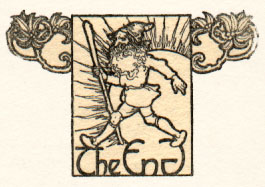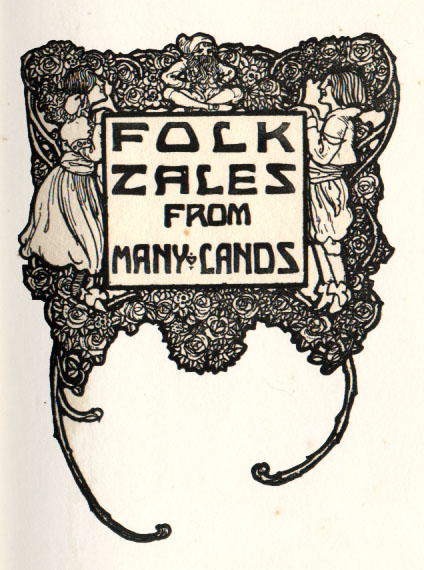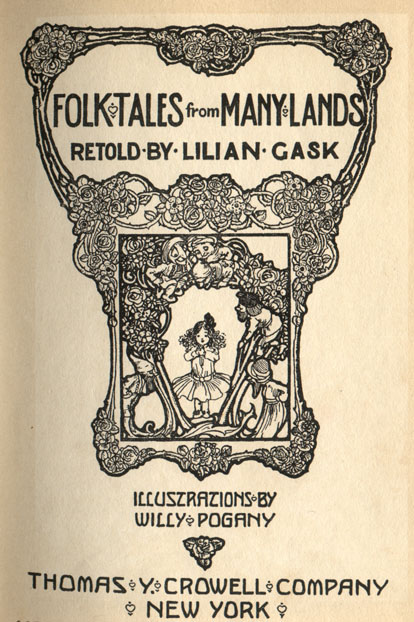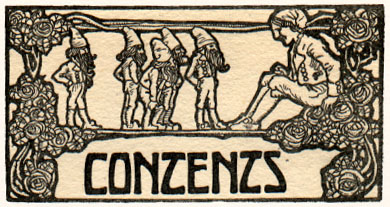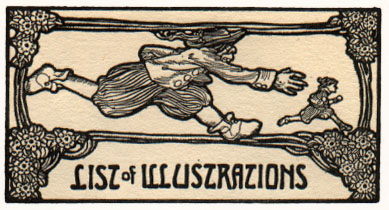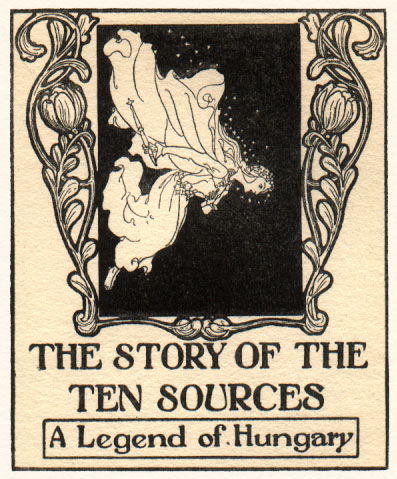
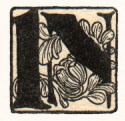 THE wild Carpathians, where the everlasting hills lift their peaks far into the serene blue of Heaven, a torrent known as the River of the Ten Sources rushes with eager fury down the steep slopes of the mountain walls rising in wild disorder on
every side. Even the perpetual thunder of its fall is soon swallowed up in the mightier silence which broods upon the scene, and, save for the roar of some beast of prey, the profound stillness is rarely broken, even by the echo of the hunters' "tally-ho."
THE wild Carpathians, where the everlasting hills lift their peaks far into the serene blue of Heaven, a torrent known as the River of the Ten Sources rushes with eager fury down the steep slopes of the mountain walls rising in wild disorder on
every side. Even the perpetual thunder of its fall is soon swallowed up in the mightier silence which broods upon the scene, and, save for the roar of some beast of prey, the profound stillness is rarely broken, even by the echo of the hunters' "tally-ho."
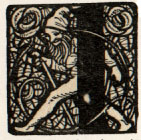 N this remote spot in the mountains Bükk and Mátra join hands together, and through the dense forests which cling to their shoulders and clothe their naked limbs, the cataract pursues its way to the abyss whose rocky jaws gape wide to receive it. High on the cliffs above, the passage of the torrent may be traced by clouds of spray and arches of glowing colours where the sunbeams play amidst the vapour tossed up by the impetuous stream; and farther up may be seen three faint wreaths, like gossamer garments of the mountain elves, which mark the spots where three hot springs mingle with the icy stream from seven other sources near by.
N this remote spot in the mountains Bükk and Mátra join hands together, and through the dense forests which cling to their shoulders and clothe their naked limbs, the cataract pursues its way to the abyss whose rocky jaws gape wide to receive it. High on the cliffs above, the passage of the torrent may be traced by clouds of spray and arches of glowing colours where the sunbeams play amidst the vapour tossed up by the impetuous stream; and farther up may be seen three faint wreaths, like gossamer garments of the mountain elves, which mark the spots where three hot springs mingle with the icy stream from seven other sources near by.
Long, long ago, this wild and romantic scene was peopled by the fairies, and on a day there came ten young hunters who had pressed far beyond the haunts of their kind on the tracks of bears, boars, bison, and other wild beasts which roamed the deep recesses of the woods. Ten bold and adventurous brothers they were, and merrily did they wind their horns, and blithely did they sing the deeds of brave
warriors and bold huntsmen as they forced their way through the forest wilds. Suddenly they came to a glimpse of the open sky, and they saw a sight which stilled their songs and riveted their feet to the ground. Towering above the giant firs were two mountain peaks flushed with the rays of the noonday sun. But fairer than the deep blue of the sky, fairer than the rosy hues of the mountain peaks, were the forms of a host of fairies, the most beautiful that mortal eyes had ever looked upon. They were standing on the peaks, tossing diamond balls from one to the other across the deep chasm, and as the sun shone upon the balls it seemed to the brothers that they had never seen rainbow so beautiful as this glittering arch which
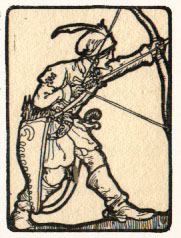 spanned the abyss. As they stood open-mouthed with delight they beheld an even more wonderful sight. For suddenly a fairy seated herself upon one of the balls and flew like the wind to the opposite peak. Others followed, and while they sported in this charming way, they laughed and sang as only fairies can, and the young hunters' hearts leaped within them for joy at this awesome and wonderful sight. Suddenly, however, as with one
mind, they caught up their bows, fitted the arrows to the strings, and the ten shafts sped with unerring aim to as many diamond balls.
spanned the abyss. As they stood open-mouthed with delight they beheld an even more wonderful sight. For suddenly a fairy seated herself upon one of the balls and flew like the wind to the opposite peak. Others followed, and while they sported in this charming way, they laughed and sang as only fairies can, and the young hunters' hearts leaped within them for joy at this awesome and wonderful sight. Suddenly, however, as with one
mind, they caught up their bows, fitted the arrows to the strings, and the ten shafts sped with unerring aim to as many diamond balls.
The next moment a ball fell at each of the brothers' feet, but alas! the fairies had vanished and the entrancing vision was seen no more.
The young men picked up the balls and bestowed them safely in their knapsacks, sighing the while at the foolishness which had led them to sacrifice so delightful a sight. They lingered for awhile in the hope that they might again behold it, but at last, very sad at heart, they turned away.
Gradually the shadows lengthened in the forest aisles; wild creatures crossed the hunters' path again and again, but the brothers paid heed to naught as they wandered moodily on. They thought only of the rash act which had deprived them of the entrancing vision, and the diamond ball which each had secured seemed but a poor substitute for the bewitching countenances of the fairy damsels.
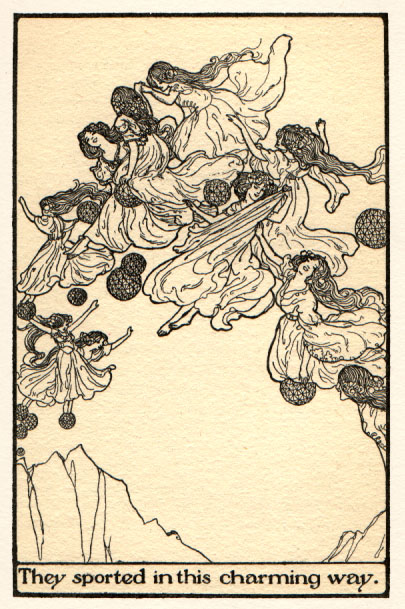
The young men were so deeply engaged in their bitter reflections that they failed to notice that they had come to the edge of the forest. Suddenly, however, an exclamation from one of the brothers
caused them all to look up, and lo! before them was a castle like no fastness that mortal eye had ever seen. Its walls were mossy and rugged like those of the mountains around, but here and there were projecting casements, rounded in form, which
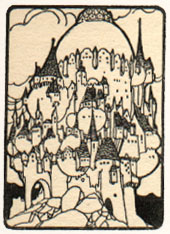 sparkled and gleamed like the balls in the young men's knapsacks, and a great dome like a gigantic diamond surmounted the castle and reflected the rays of the dying sun from a million points. But more wonderful and more grateful to the eyes of the brothers was the vision of the fairy damsels whom they beheld gazing tenderly upon them from the outer walls. With a cry of joy the hunters flew to the great gates. They found them open and unguarded, and in less time than it takes to tell the story the young men had clasped each a maiden in his arms. There is small need for words when heart speaks to heart, and all knew that they had met the desire of their souls. Together they now entered the castle, where they were met by a crowd of gorgeously attired servants, who invited the young men to refresh themselves after their toilsome march through the forest glades. They brought to them rich costumes befitting the sons of kings: robes embroidered with emeralds and pearls, and swords whose hilts and sheaths were studded with diamonds and rubies.
sparkled and gleamed like the balls in the young men's knapsacks, and a great dome like a gigantic diamond surmounted the castle and reflected the rays of the dying sun from a million points. But more wonderful and more grateful to the eyes of the brothers was the vision of the fairy damsels whom they beheld gazing tenderly upon them from the outer walls. With a cry of joy the hunters flew to the great gates. They found them open and unguarded, and in less time than it takes to tell the story the young men had clasped each a maiden in his arms. There is small need for words when heart speaks to heart, and all knew that they had met the desire of their souls. Together they now entered the castle, where they were met by a crowd of gorgeously attired servants, who invited the young men to refresh themselves after their toilsome march through the forest glades. They brought to them rich costumes befitting the sons of kings: robes embroidered with emeralds and pearls, and swords whose hilts and sheaths were studded with diamonds and rubies.
The brothers were now conducted to the banqueting-hall, where preparations had been made for a wedding-feast. And the young men could hardly believe their good fortune when they learned that the lovely fairy maidens were to be their brides that very evening. You may be sure that they feasted and drank right merrily, and never was there such a wedding-feast. Golden dishes glided upon the table as though moved by invisible hands, plates and glasses were filled of themselves; it was only necessary to wish, and lo! the choicest viands and the most delicious wines were before them.
Many happy days followed, in which the brothers forgot all else but the good fortune which had guided them to the fairy castle. Their brides were as good as they were beautiful, and it would have been wonderful indeed had they remembered that envious Time bestows few such blissful days upon even the most favoured.
The fairy maidens were daughters of the Queen of the Stars, who had been absent in a distant part of her realm when the young hunters arrived before her castle. Tidings of what had taken place had now reached her, and in hot haste she descended upon a moonbeam and appeared before her daughters at the close of day.
"Miserable children," she said, "what foolish deed have you committed? Know you not that fay and mortal may not mate, and that she who disobeys this law of fairyland must be for ever cast out from the happy companionship of the immortals?"
At these threatening words the poor maidens pleaded tearfully with their mother that she should not drop their stars from the sky; 1 but the Queen
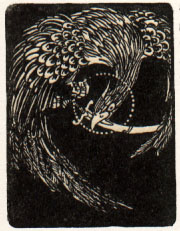 answered sorrowfully that she was powerless to save them from the fate which their disobedience had
brought upon them.
answered sorrowfully that she was powerless to save them from the fate which their disobedience had
brought upon them.
That same night the brothers one and all were visited by the self-same dream. In a vision of the night the Turul, that ill-omened bird of war, alighted upon each couch and croaked a call to battle which no hero may refuse to obey. The harsh sound was in their ears as they awoke on the morrow, and each told his wife sadly of the summons that called him away. The fairy maidens knew full well that never would they see their beloved husbands again, and very sad of heart were they as they bravely bade them good-bye and watched them disappear into the forest, which had never before seemed so full of gloom.
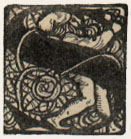 EVEN days and seven nights went by. The maidens could not rest for the terrible fear that was in their hearts. Never before had they known of fear, but now they tasted its bitterness, both for themselves and those whom they loved so fondly. At last on the seventh night they were wandering in the forest, for there was something in the stillness of the leafy aisles which eased their pain, when they beheld ten stars fall from the sky. It was the death of their last lingering hopes. Their husbands had fallen in battle, and never more would they hear their loved voices or gaze upon their manly forms. The maidens wept so piteously that even the stars which keep so cold a watch in the sky were moved. But they did not all weep for the same cause. The three youngest thought only of the husbands whom they had lost for ever, but their sisters grieved mostly for their own sad fate. At last, utterly exhausted, all alike sank into a quiet and restful sleep, and as they reclined upon the grassy bank where they had flung themselves in the first agony of grief, the Queen of the Stars came on a moonbeam and gazed pityingly upon her children. Her heart was full as she beheld the pearly tears which told of the grief which even sleep could not banish, and silently she bestowed a tender kiss upon each loved face. Then she touched the maidens lightly with a magic wand, and instantly the sleeping forms were changed into bubbling springs. Seven were icy cold, but the streams which issued from the spots where the three youngest had lain were boiling hot.
EVEN days and seven nights went by. The maidens could not rest for the terrible fear that was in their hearts. Never before had they known of fear, but now they tasted its bitterness, both for themselves and those whom they loved so fondly. At last on the seventh night they were wandering in the forest, for there was something in the stillness of the leafy aisles which eased their pain, when they beheld ten stars fall from the sky. It was the death of their last lingering hopes. Their husbands had fallen in battle, and never more would they hear their loved voices or gaze upon their manly forms. The maidens wept so piteously that even the stars which keep so cold a watch in the sky were moved. But they did not all weep for the same cause. The three youngest thought only of the husbands whom they had lost for ever, but their sisters grieved mostly for their own sad fate. At last, utterly exhausted, all alike sank into a quiet and restful sleep, and as they reclined upon the grassy bank where they had flung themselves in the first agony of grief, the Queen of the Stars came on a moonbeam and gazed pityingly upon her children. Her heart was full as she beheld the pearly tears which told of the grief which even sleep could not banish, and silently she bestowed a tender kiss upon each loved face. Then she touched the maidens lightly with a magic wand, and instantly the sleeping forms were changed into bubbling springs. Seven were icy cold, but the streams which issued from the spots where the three youngest had lain were boiling hot.
And to this day, if we go to where the Bükk and Mátra meet, we may see the ten springs known to the peasants of that hill-country as "The Ten Sisters," flowing to mingle their waters in the common stream which rushes for ever through the valley far beneath.
1 According to ancient superstition in Hungary every one has his star, which falls from the sky when he dies.
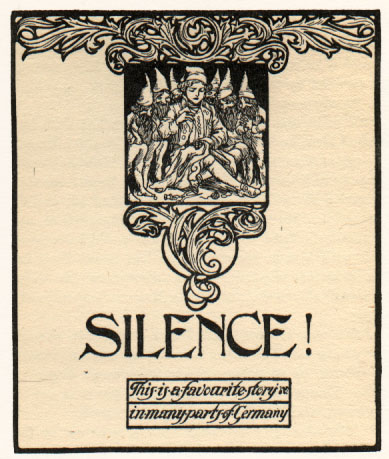
 ASTER GASPAR was the King's tailor, and high in favour with the nobility.
Being an excellent workman he had amassed a fortune, but though he had a fine house, ample means, and a handsome daughter who was admired by all, he was still unsatisfied.
ASTER GASPAR was the King's tailor, and high in favour with the nobility.
Being an excellent workman he had amassed a fortune, but though he had a fine house, ample means, and a handsome daughter who was admired by all, he was still unsatisfied.
"If I had had a son," he sighed, "I should have brought him up to be a tailor like myself, and he would inherit my fortune. As it is, I have no one to succeed to this fine business, which I have built up by my own efforts."
When he was weary of sighing for what Fate had denied him, he invited his nephew, John, to become his apprentice, and live in his house. Now John was already in love with Marie, whom he hoped one day to make his wife, so he gladly accepted his uncle's invitation. He was a good-natured young fellow, not particularly fond of work, but all would have gone well with him in his new home had it not been for his ceaseless chatter, which distracted his companions' attention, and made Master Gaspar justly angry.
John was scolded, and Marie wept; but though the young man promised to mend his ways and work in silence, he soon forgot, and once more began to talk. This went on until Master Gaspar was out of patience, and decided that they must part.
"You must go," he said, "but it need not be for ever unless you wish. Take a journey through France, and see if you cannot learn to conquer this foolish habit of yours. When you can show me six pieces of gold that you have earned by steady work, I will take you back into the business. More than this, you shall have my daughter for your wife; but not until you have proved that you deserve her."
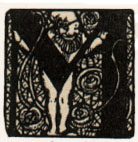 ARIE'S pretty face was sweet as
a pink pea-blossom in a shower
of rain as she blushed through her
tears, and John wept with her, for
he had a tender heart. As Master Gaspar refused to listen to their
joint entreaties, there was nothing for John to do but to go, so he mournfully took his departure. Filled with regrets, he walked on and on, until his uncle's house was far behind him, and he reached the borders of a vast forest. A narrow pathway seemed to beckon to him, and, still thinking of the weeping Marie, he strolled on listlessly beneath gnarled old oak-trees, whose branches looked like the twisted limbs of tortured ogres.
ARIE'S pretty face was sweet as
a pink pea-blossom in a shower
of rain as she blushed through her
tears, and John wept with her, for
he had a tender heart. As Master Gaspar refused to listen to their
joint entreaties, there was nothing for John to do but to go, so he mournfully took his departure. Filled with regrets, he walked on and on, until his uncle's house was far behind him, and he reached the borders of a vast forest. A narrow pathway seemed to beckon to him, and, still thinking of the weeping Marie, he strolled on listlessly beneath gnarled old oak-trees, whose branches looked like the twisted limbs of tortured ogres.
Needless to tell, he lost his way, and though he searched in every direction, he could see no trace of the path by which he had entered the forest. Dusk came on, and the trees grew dim and shadowy. The night-birds called to each other sadly, and he heard in the distance the howling of hungry wolves. The sound filled him with dread, but in spite of his fears he was soon overcome by weariness, and, throwing himself at the foot of a tree, fell into a deep slumber.
The night was half over when he awoke, and a ray of moonlight that shone through the boughs above showed a tiny dwarf standing close beside him. Without a word the strange little creature took him by the hand, and led him to the heart of the forest, where a bright wood-fire lit up the darkness. Five other dwarfs, no less curious to look at than the first, were grouped around the glowing embers, and with silent gestures invited John to join them. He sat down gratefully and warmed his hands. Still no one spoke, and after a while he ventured on a question.
"Where am I?" he began, but could get no farther, for the nearest dwarf gave him such a slap in the face that his breath was taken away. Furious with anger, John leaped to his feet and would have flown at him, but at his first gesture the tiny dwarf instantly assumed the stature of a giant, and looked down so threateningly upon him that he feared to make another motion. As he did not stir, the wrath of the giant subsided, and he became a dwarf once more. Feeling very much subdued, John sat down again and did not open his lips for quite an hour.
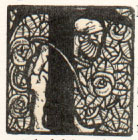 HE forest was very still. The wind had dropped, and those of
the wood-folk who were not asleep moved so softly that they made no
sound. The silence was intolerable
to chattering John, and as a last resource he took out from his
satchel his scissors, needles, and thread, in order to mend an ugly rent which a briar had torn in his spick-and-span coat. At the sight of these the
dwarfs got up and danced with glee, showing him at the same time many rents in their own garments. Their joy emboldened John to speak once more.
HE forest was very still. The wind had dropped, and those of
the wood-folk who were not asleep moved so softly that they made no
sound. The silence was intolerable
to chattering John, and as a last resource he took out from his
satchel his scissors, needles, and thread, in order to mend an ugly rent which a briar had torn in his spick-and-span coat. At the sight of these the
dwarfs got up and danced with glee, showing him at the same time many rents in their own garments. Their joy emboldened John to speak once more.
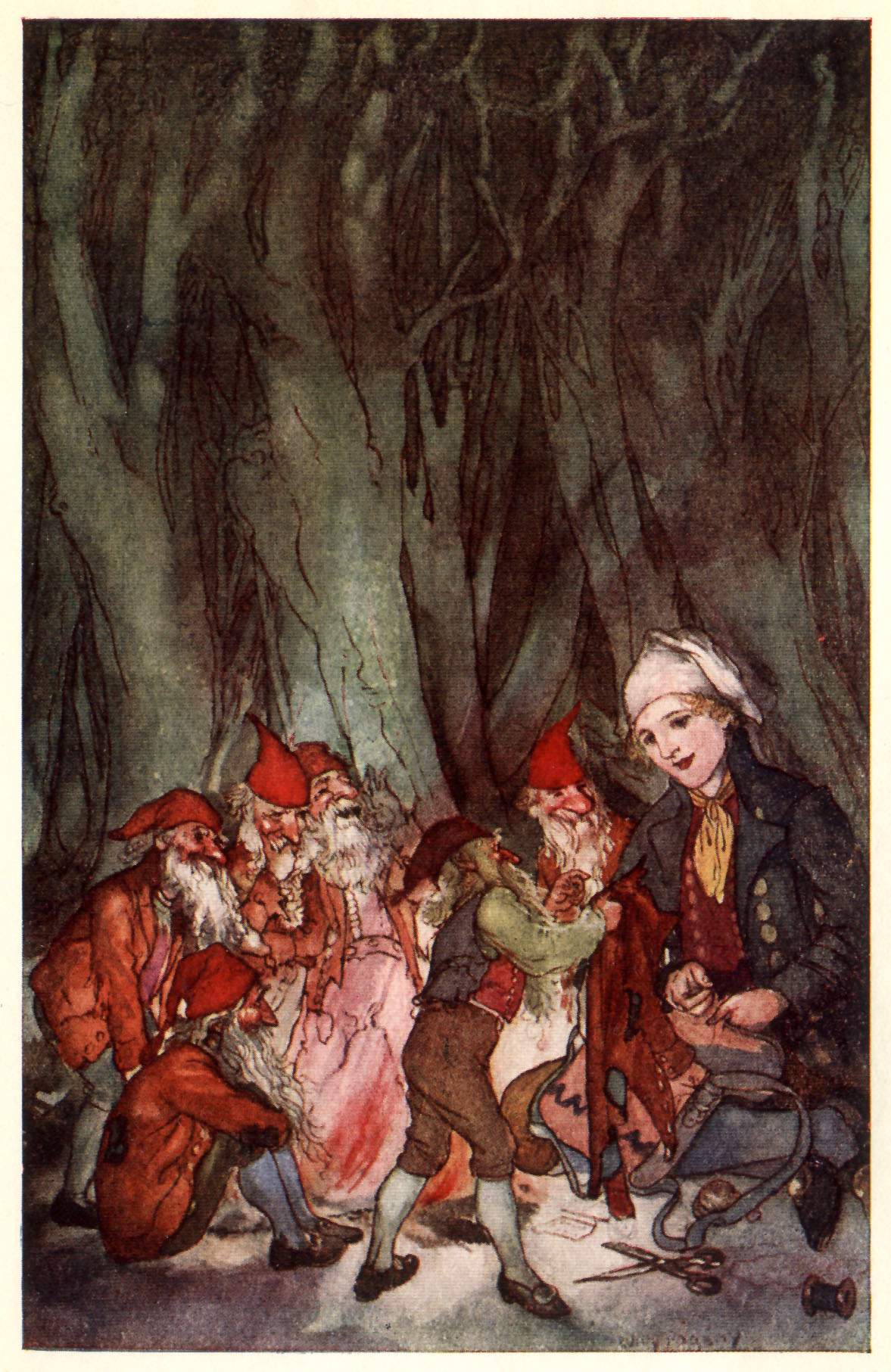
THE TAILOR AND THE DWARFS
"Who are you," he cried, "and why are your coats so torn?"
The reply to his question was another blow, and again he was overwhelmed with impotent anger. He was one against six, however, each of whom could transform himself at will into a mighty giant, so with unusual prudence he decided to hold his tongue. When the dwarfs had thrown more wood on the fire so that it blazed up brightly, he threaded his finest needle, and set to work on his coat. Immediately the eldest dwarf took off his own, and held it towards him entreatingly. John dared not refuse to do what he wanted, so he started at once to repair it. He worked away for a whole hour, and then, in spite of himself, burst out with another question. It met with the usual answer. His face ached all over with the slaps he had received, but he had no means of retaliation.
"My uncle used to grumble if I chattered," he groaned to himself, "but these fellows reward me with frightful blows." As he did not know what else to do, he kept on stitching until the coat was neatly mended, when he handed it back to its owner without a word.
The dwarf examined it with lively interest, and, having no fault to find, took out of his pocket a gleaming piece of gold, which John, to his great delight, found was intended for himself.
"Come," he thought cheerfully, "here's one piece of gold already. If I can earn the rest as quickly I shall not have long to wait before I can claim dear Marie for my wife."
By this time the night was almost spent. The birds were beginning to twitter drowsily, and the fire waned dull in the dawning light. With a sigh of relief John put by his needles and thread, and was preparing to leave his strange companions, when one of them offered him a draught of wine, which he thankfully accepted. It tasted like fairy nectar, and he drained the silver cup to its very dregs. As he set it down a wave of cold ran through his body, and he shivered like the leaves of an aspen when the wind blows up for a storm.... In a few moments he had dwindled down to the size of the dwarfs themselves. His cry of alarm was met with another blow, and as he staggered to his feet he felt with despair that resistance was useless.
Making signs for him to follow them, the dwarfs led the way through the waking forest, and though shafts of sunlight pierced the canopy of leaves, and made ladders of gold on the soft green moss over which he trod, John could think of nothing but his sad fate, and what was likely to happen next.
The forest came to an end at last, and a huge black rock loomed before them like a giant's fortress. One of the dwarfs touched its jagged surface; a hidden door flew open silently, and John and his companions passed through it into a long wide corridor. On both sides of this were tiny bedrooms, with furniture of mother-of-pearl
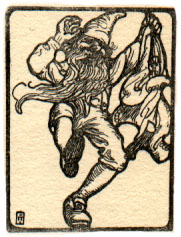 and small white beds with hangings of rose
pink silk. Sounds of
exquisite music were wafted
from a distance, and John
caught a glimpse of a brilliantly lighted ballroom at the far end of the corridor, filled with many dancers. He would have liked nothing better than to question his guides, but, wise at last, he resisted the inclination.
After a moment's pause, they showed him into one of the bedrooms and pointed to the bed. He at once undressed, and laid his head on the pillow. The music was now as soft as the lapping of waves on the seashore, and he fell asleep like a tired child.
and small white beds with hangings of rose
pink silk. Sounds of
exquisite music were wafted
from a distance, and John
caught a glimpse of a brilliantly lighted ballroom at the far end of the corridor, filled with many dancers. He would have liked nothing better than to question his guides, but, wise at last, he resisted the inclination.
After a moment's pause, they showed him into one of the bedrooms and pointed to the bed. He at once undressed, and laid his head on the pillow. The music was now as soft as the lapping of waves on the seashore, and he fell asleep like a tired child.
He woke in the twilight to find one of the dwarfs at the foot of his bed. The little fellow seemed impatient for him to rise, and when John opened his lips as if to speak, he raised his head so angrily that the youth deemed it advisable to keep his mouth shut. Dressing himself as quickly as he could, he followed the dwarf into the wide corridor, where the others joined them. All passed together out of the rock, and re-entered the forest as the last ray of light faded out of the sky.
A fire was blazing under an arch of beeches, and once more John sat down and warmed himself. Not daring to speak, he thought it would be more agreeable to sew than to do nothing, so he again took out his needles and thread. At this another dwarf came forward with a torn coat, and John, while skilfully repairing it, made two attempts to speak. On each occasion he received one of the heavy blows he had learnt to dread, and for the rest of the night he uttered no word. Just before dawn the coat was finished, and on handing it back he was given a second piece of gold.
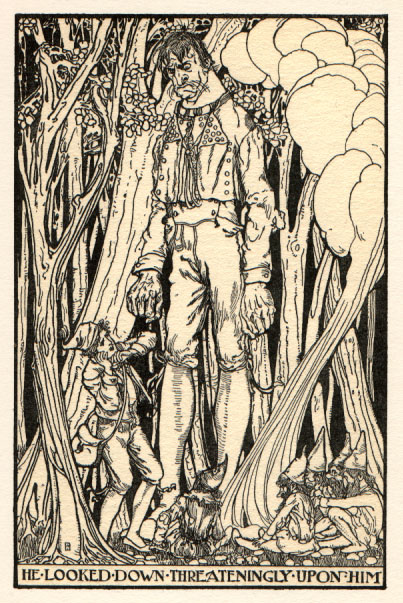
Instead of rejoicing he could only mourn.
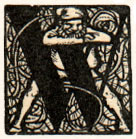 HAT wretched luck that I should have been transformed into a dwarf!" he sighed, as he followed
the little men back to the rock.
"Two pieces of gold are mine
already, and, were it not for my
misfortune, my
uncle would give me Marie when I have earned six."
HAT wretched luck that I should have been transformed into a dwarf!" he sighed, as he followed
the little men back to the rock.
"Two pieces of gold are mine
already, and, were it not for my
misfortune, my
uncle would give me Marie when I have earned six."
The wind in the trees re-echoed his sighs, as it rustled amongst the fallen leaves. The air was chill, and already the frosts of winter were turning the berries red.
"That's curious," said John—to himself, you may be certain, for he knew better by this time than to speak out loud. "Yesterday was the fifteenth of October; yet to-day one might well think that it was mid-November."
Again the rock opened at the dwarf's light touch and they all went in as before. The same sweet music fell on John's ears, and the dancers still twisted and turned in the brilliantly lighted ballroom at the far end of the corridor. John spent the day in the little white bed with the rose-silk hangings, and when once again he was roused by a dwarf he dressed himself without risking a question. Only three dwarfs awaited them in the corridor, and on reaching the forest he was amazed to find that the ground was covered with snow.
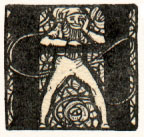 OW strange!" he thought. "It might be December, though only three days and nights have passed
since I bade dear Marie farewell.
Ah! how changed I am! Marie would not know me now, and even if she did my uncle would never let her marry a dwarf.... Why did I chatter so heedlessly, and play such tricks on my fellow-apprentices? If I had held my tongue I should never have come to this dreadful forest, to be struck and buffeted by stunted creatures who would not reach above my natural waist."
OW strange!" he thought. "It might be December, though only three days and nights have passed
since I bade dear Marie farewell.
Ah! how changed I am! Marie would not know me now, and even if she did my uncle would never let her marry a dwarf.... Why did I chatter so heedlessly, and play such tricks on my fellow-apprentices? If I had held my tongue I should never have come to this dreadful forest, to be struck and buffeted by stunted creatures who would not reach above my natural waist."
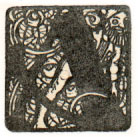 THIRD night passed in the same way as the rest, and only once did he forget himself and speak. The blow that followed made him sick
with pain, but when, overcome by anger, he put down his work, the dwarfs looked so miserable that he took it up again, and finished mending a third coat. For this he was given a third piece of gold, and once again the dwarfs returned to the rock. A fourth and a fifth night passed in exactly the same way, but on the sixth occasion only one dwarf accompanied him to the forest. The trees were still bare, but the cold was not so intense; here and there in sheltered nooks the snowdrops were showing their dainty heads. By this time John felt rich, for five gold pieces jingled in his pockets.
THIRD night passed in the same way as the rest, and only once did he forget himself and speak. The blow that followed made him sick
with pain, but when, overcome by anger, he put down his work, the dwarfs looked so miserable that he took it up again, and finished mending a third coat. For this he was given a third piece of gold, and once again the dwarfs returned to the rock. A fourth and a fifth night passed in exactly the same way, but on the sixth occasion only one dwarf accompanied him to the forest. The trees were still bare, but the cold was not so intense; here and there in sheltered nooks the snowdrops were showing their dainty heads. By this time John felt rich, for five gold pieces jingled in his pockets.
"Ah," he thought, as a rift in the trees above gave him a glimpse of the sky, the blue of which reminded him of Marie's eyes, "it seems to me as if it were months since the day I left her. If uncle could see my plight, he would be sorry for me."
That night only the one dwarf sat with him by the fire. John worked on steadily at the last torn coat, for he had now quite lost the habit of chattering, and was as silent as Master Gaspar could have wished.
As the sixth piece of gold was added to his store, he could scarcely restrain his tears as he thought how, but for his transformation, he might now claim Marie for his bride. The grateful dwarf offered him another cup of wine, but he shook his head, and then, to his great surprise, the little man whom he had imagined to be dumb began to speak.
"Drink without fear, young man," he cried. "This wine will at once restore you to your former size."
John seized the cup eagerly, and emptied it at one draught. In a few moments he was as tall and as strong as when he quitted his uncle's house, but although his joy was great he did not dare to express it audibly.
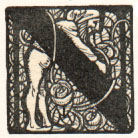 O doubt," the dwarf continued, looking at him kindly, "you would like to have some explanation of what you have seen.... A hundred years ago, I and my five companions quarrelled in the King's ballroom, and flew at each other like angry wolves. Justly indignant at our folly, for quarrelling is not allowed in his domains, the King laid us under sentence of banishment, decreeing that we should spend the fifteenth night of each month in this dreary forest until a tailor came who could mend the garments we had torn. That we might learn to govern our unruly tongues, we were condemned neither to speak nor be spoken to, and the King declared that if we allowed anyone to talk to us, we should never return to our own homes.
O doubt," the dwarf continued, looking at him kindly, "you would like to have some explanation of what you have seen.... A hundred years ago, I and my five companions quarrelled in the King's ballroom, and flew at each other like angry wolves. Justly indignant at our folly, for quarrelling is not allowed in his domains, the King laid us under sentence of banishment, decreeing that we should spend the fifteenth night of each month in this dreary forest until a tailor came who could mend the garments we had torn. That we might learn to govern our unruly tongues, we were condemned neither to speak nor be spoken to, and the King declared that if we allowed anyone to talk to us, we should never return to our own homes.
"Year after year went by, with no sign of a tailor, and we had lost all hope, when we found you sleeping under a tree. Our hearts were filled with joy, for by the marks on your thumb and forefinger we guessed to what trade you belonged. But alas! you persisted in talking, and so we were obliged to stop you in the only way we could. Now that you have mended our coats, however, our troubles are at an end, and you can go back to your uncle's house. You will be surprised to find how long you have been away, for we made you sleep a month at a time. It was the fifteenth of October when you arrived, and now it is the fifteenth of March."
The bridal songs of the blackbirds and thrushes were not more gay than the merry tune John hummed to himself as he hurried homeward. Marie greeted him with tender joy, and when in answer to the questions of Master Gaspar he proudly showed him his six gold pieces, he was at once allowed to take his old place in the workshop. Since he stitched most deftly, and in utter silence, his uncle was delighted, and there was nothing now to come between him and his heart's desire.
His wedding with Marie was celebrated with much rejoicing, and no man ever had a fairer or sweeter bride.
Years afterwards he would sometimes relate his adventures to his boys and girls as they sat round the fire on frosty nights.
 H, my dear children," he would say, "silence is an excellent thing. I learnt the lesson in a painful manner, but I have never regretted it. Chat away to your hearts' content in your leisure moments, but when you work, work with all your might, and be sure to do it in silence."
H, my dear children," he would say, "silence is an excellent thing. I learnt the lesson in a painful manner, but I have never regretted it. Chat away to your hearts' content in your leisure moments, but when you work, work with all your might, and be sure to do it in silence."
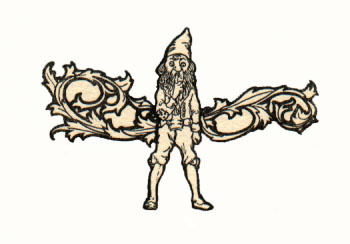
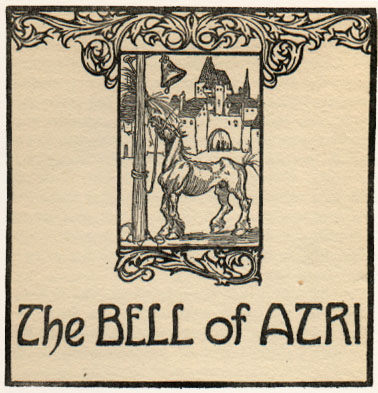
 WISE and just monarch was the good King John. His kingdom extended over Central Italy, and included the famous town of Atri, which in days gone by had
been a famous harbour on the shores of the Adriatic.
Now the sea had retreated from it, and it lay inland; no longer the crested waves rolled on its borders, or tossed their showers of silver spray to meet the vivid turquoise of the sky.
WISE and just monarch was the good King John. His kingdom extended over Central Italy, and included the famous town of Atri, which in days gone by had
been a famous harbour on the shores of the Adriatic.
Now the sea had retreated from it, and it lay inland; no longer the crested waves rolled on its borders, or tossed their showers of silver spray to meet the vivid turquoise of the sky.
 HE great desire of good King John was that every
man, woman, and child in his dominions should be able to obtain justice without delay, be they rich or poor. To this end, since he could not possibly listen to all himself, he hung a bell in one of the chief towns, and issued a proclamation to say that when this was rung a magistrate would immediately proceed to the public square and administer justice in his name. The plan worked admirably; both rich and poor were satisfied, and since they knew that evildoers would be quickly punished, and wrongs set right, men hesitated to defraud or oppress their neighbours, and the great bell pealed less often as years went on.
HE great desire of good King John was that every
man, woman, and child in his dominions should be able to obtain justice without delay, be they rich or poor. To this end, since he could not possibly listen to all himself, he hung a bell in one of the chief towns, and issued a proclamation to say that when this was rung a magistrate would immediately proceed to the public square and administer justice in his name. The plan worked admirably; both rich and poor were satisfied, and since they knew that evildoers would be quickly punished, and wrongs set right, men hesitated to defraud or oppress their neighbours, and the great bell pealed less often as years went on.
In the course of time, however, the bell-rope wore thin, and some ingenious citizen fastened a wisp of hay to it, that this might serve as a handle. One day in the height of summer, when the deserted square was blazing with sunlight, and most of the citizens were taking their noonday rest, their siesta was disturbed by the violent pealing of the bell.
"Surely some great injustice has been done," they cried, shaking off their languor and hastening to the square. To their amazement they found it empty of all human beings save themselves; no angry supplicant appealed for justice, but a poor old horse, lame and half blind, with bones that nearly broke through his skin, was trying with pathetic eagerness to eat the wisp of hay. In struggling to do this, he had rung the bell, and the judge, summoned so hastily for so light a cause, was stirred to indignation.
"To whom does this wretched horse belong?" he shouted wrathfully. "What business has it here?"
"Sir, he belongs to a rich nobleman, who lives in that splendid palace whose tall towers glisten white
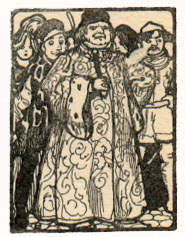 above the palm-grove," said an old man, coming forward with a deep bow. "Time
was that he bore his master
to battle, carrying him
dauntlessly amid shot and shell, and more than once saving his life by his courage and fleetness. When the
horse became old and feeble,
he was turned adrift, since his master had no further use for him; and now the poor creature picks up what food he can in highways and byways."
above the palm-grove," said an old man, coming forward with a deep bow. "Time
was that he bore his master
to battle, carrying him
dauntlessly amid shot and shell, and more than once saving his life by his courage and fleetness. When the
horse became old and feeble,
he was turned adrift, since his master had no further use for him; and now the poor creature picks up what food he can in highways and byways."
On hearing this the judge's face grew dark with anger. "Bring his master before me," he thundered, and when the amazed nobleman appeared he questioned him more sternly than he would have done the meanest peasant.
 S it true," he demanded, "that you left this, your faithful servant, to starve, since he could no longer serve you? It is long since I heard of such gross injustice—are you not ashamed?"
S it true," he demanded, "that you left this, your faithful servant, to starve, since he could no longer serve you? It is long since I heard of such gross injustice—are you not ashamed?"
The nobleman hung his head in silence; he had no word to say in his own defence as with scathing contempt the judge rebuked him, adding that in future he would neglect the horse at his peril.
"For the rest of his life," he said, "you shall care for the poor beast as he deserves, so that after his long term of faithful service he may end his days in peace."
This decision was greeted with loud applause by the town-folk, who gathered in the square.
"Our bell is superior to all others," they said to each other, with nods and smiles, "for it is the means of gaining justice, not only for men, but for animals too in their time of need."
And with shouts of triumph they led the old war-horse back to his stable, knowing that for the future its miserly owner would not dare to begrudge it the comfort to which it was so justly entitled.
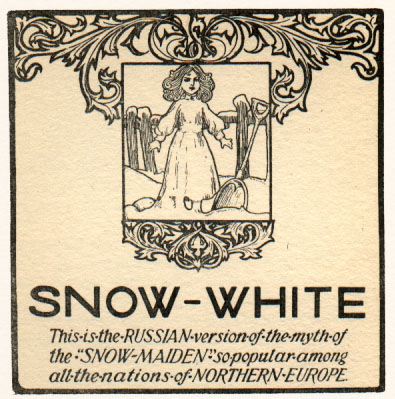
 NE fine winter's day, when the frost had spangled the dark green fir-trees, and the ponds and rivers were thick with ice, Ivan and Maria, two Russian peasants, sat by their cottage window. They were looking wistfully at a group of merry children busily engaged in making a huge snow-man; the little people were having a grand time, and though Ivan and Marie were both kind-hearted, the sight of their enjoyment made them very sad. For they had no child of their own, and their cottage was often lonely.
NE fine winter's day, when the frost had spangled the dark green fir-trees, and the ponds and rivers were thick with ice, Ivan and Maria, two Russian peasants, sat by their cottage window. They were looking wistfully at a group of merry children busily engaged in making a huge snow-man; the little people were having a grand time, and though Ivan and Marie were both kind-hearted, the sight of their enjoyment made them very sad. For they had no child of their own, and their cottage was often lonely.
"Fate has been unkind to us, wife," sighed Ivan; and Marie hid her face on his shoulder, and tried to keep back her tears.
After a while Ivan stopped sighing, and his wife lifted her head.
"See how these children yonder are enjoying themselves," he said; "why shouldn't we follow their example? Let us go into the garden and build a snow-woman."
Marie smiled and agreed. They would be children again, she cried, and forget their trouble. The clear dry air brought back the roses to her pale face, and her husband gave her a tender kiss as they passed behind a glistening fir-tree.
"Let us make a little snow-child," she suggested, as Ivan began to shovel the crisp snow.
"Ah! that's a very good idea," exclaimed her husband, and soon he had shaped a little body with dainty hands and arms and feet. While he did this, his wife modelled a little head; it had such exquisite features that when it was fixed in its right place, both stepped aside to admire it.
"It is lovely!" cried Ivan, and Marie sighed so deeply that the soft little curls she had given the little snow-child seemed to stir on the pretty forehead.
As Marie and her husband added some finishing touches, a stranger came down the road, and inquired what they were doing.
 E are making a snow-child," replied Ivan, stepping back once
more to admire the little figure. As he did so he saw with intense surprise a gentle quiver of its eyelids. A soft pink colour stole into its cheeks and lips; a deep sigh lifted the little bosom, and the dimpled fingers he had modelled so lovingly uncurled and stretched themselves. There stood before him a living child—a child more lovely than any that he or his wife had seen in their fairest dreams.
E are making a snow-child," replied Ivan, stepping back once
more to admire the little figure. As he did so he saw with intense surprise a gentle quiver of its eyelids. A soft pink colour stole into its cheeks and lips; a deep sigh lifted the little bosom, and the dimpled fingers he had modelled so lovingly uncurled and stretched themselves. There stood before him a living child—a child more lovely than any that he or his wife had seen in their fairest dreams.
"Who are you?" he asked, when he could speak, and his wife leant tremblingly against him, scarcely daring to breathe lest the entrancing vision of the child should vanish from her sight.
"I am Snow-white, your little daughter," replied the figure, throwing her fairy-like arms around his neck as he bent towards her. Marie, in turn received a sweet embrace, and, weeping for joy, they quickly took her into the cottage.
No longer now were Ivan and Marie lonely. Snow-white prattled to them by the hour together, and they were never weary of watching her. Her tiny feet pattered over the snow, like those of some small white elf, and the colder it was, the happier she seemed to be: her favourite playthings were the glittering icicles that hung from the frosted trees. Snow-white's hair was like fine spun silk; her eyes were blue as the heavens, and her skin white as snow. So gentle and sweet were her looks and ways that every one loved her dearly, and the children in the village were never so happy as when they played with her.
The winter passed, and the snow melted. Before the spring sunshine had spread a wave of green over the land, and studded the meadows with brilliant flowers, Snow-white had grown as tall as a girl of twelve. As the days grew longer she lost her joyous spirits and became quiet and sad.
"Are you ill, my child?" inquired her mother; but Snow-white shook her head.
"No, dear Mother, I am not ill," she murmured, but instead of playing with the other children, as she had loved to do before, she stayed indoors, gazing out of the window with dreamy eyes, as if she saw what was not visible to mortal eyes.
"Snow-white! Snow-white! what are you doing?" cried a group of her small companions, peeping in through the open door. "Come with us; we are going to the woods to gather flowers, and dance round the fairy ring."
"Yes! go to the woods with your little friends, my darling," said her mother fondly, tying a ribbon over her pale gold curls, that they might not be ruffled by the wind.
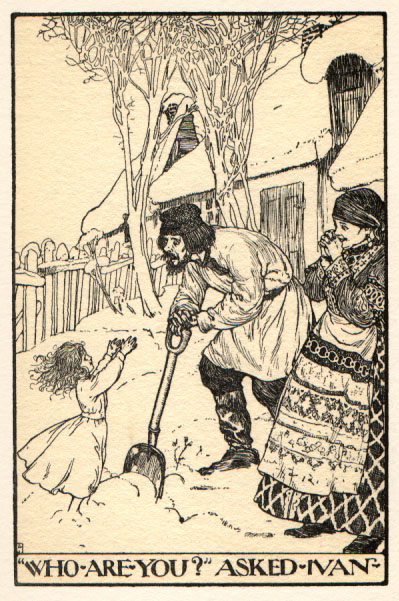
Snow-white left the cottage reluctantly; she would far rather have stayed at home, and her steps were the only listless ones in that merry throng.
When the children had filled their laps with many-hued blossoms, they wove them into wreaths and crowns, for that night they were going to have a festival, and they wanted to look like queens. As the day wore on they returned to their homes, but when dusk had fallen they came back for Snow-white, and once more she went with them. Her soft blue eyes were very wistful
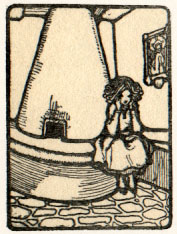 as she glanced at her
father and mother, but they
bade her go and play.
as she glanced at her
father and mother, but they
bade her go and play.
There was a bonfire in the market-place, and the dancing flames leapt high. The sparks flew round in gleaming showers, and the children laughed and shouted.
"Look at us, Snow-white, and do as we do!" said first one and then another, jumping over the fire. Suddenly they saw that Snow-white had vanished.
"Where are you?" they cried, but there was no reply. Snow-white had melted in the heat of the fire, and floated away as vapour to the clouds from which she had first come in soft white flakes of snow. Her friends and playmates searched for her unavailingly, and never again did she sit with her parents by their cottage door.
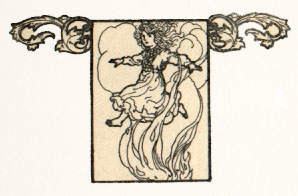
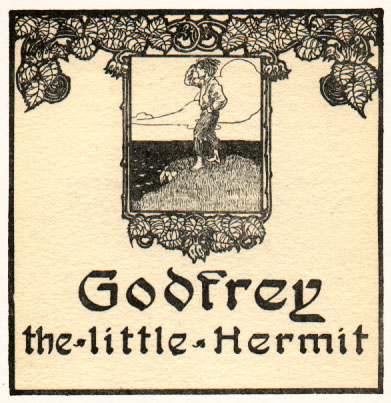
 ODFREY'S father was very poor, for though he worked hard the summer through, tending the fields of his richer neighbours, and, since he lived by the seashore, mended the fishermen's nets for them when it was too cold to go a-fishing, it was only by the thrift and good management of his wife that the big family in the little cottage had enough to eat. Godfrey helped his father to work in their own garden, where they grew fruit and vegetables,
and many a golden marrow or sweet potato reached their frugal table as the result of his industry.
ODFREY'S father was very poor, for though he worked hard the summer through, tending the fields of his richer neighbours, and, since he lived by the seashore, mended the fishermen's nets for them when it was too cold to go a-fishing, it was only by the thrift and good management of his wife that the big family in the little cottage had enough to eat. Godfrey helped his father to work in their own garden, where they grew fruit and vegetables,
and many a golden marrow or sweet potato reached their frugal table as the result of his industry.
The boy was bright and intelligent, but he liked play better than work, and his father was touched when he noticed that Godfrey's affection for himself and his mother had overcome his distaste for drudgery.
"You have pleased me greatly this last week, my son," he said one day, "and I am going to give you some pleasure in return. If to-morrow be fine, I will take you to the Green Island, where my father lived in days gone by."
Godfrey had often longed to visit this Green Island, which on a clear day he could see from the shelving beach, where he loved to play with his small brothers and sisters. He had often heard his father speak of the walnut-trees that grew there and the drooping willows which would give them such a good supply of cane for making their baskets. He was, therefore, delighted at the suggestion, and could scarcely sleep that night for excitement.
Very early next morning, when the sky was still pink with dawn clouds, he was up and astir. A faint grey haze over the distant hills gave a hint of rain, but as the sun rose high in the heavens, this melted into the blue, and his fears of a storm as quickly vanished. The moment breakfast was over, he would have started full speed for the boat, but this his father would not allow.
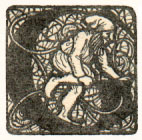 ENTLY, my boy!" the good man cried, "you have several
things to carry." As he spoke he pointed out a long thick winter cloak, various stores of bread and meat, two choppers, a big iron pot, a coil of rope, and two large baskets.
ENTLY, my boy!" the good man cried, "you have several
things to carry." As he spoke he pointed out a long thick winter cloak, various stores of bread and meat, two choppers, a big iron pot, a coil of rope, and two large baskets.
Godfrey looked at them in dismay.
"Why, Father!" he cried, "what do you want with all these things? The day is too warm for your winter cloak, and as for the food, one loaf, and half that meat, would be sufficient."
His father smiled indulgently.
"It is well to be prepared for all things, my son," he remarked. "Last time I was on the island a storm blew up, and I was glad enough of my thick cloak to shelter me during the night, for I had to remain there until morning." And in spite of Godfrey's conviction that his father was making too much of a danger unlikely to happen, each article was carefully carried down to the boat.
The sea was very calm. Godfrey and his father each took an oar, and soon their little cottage became but a tiny speck in the distance, while the Green Island grew larger and larger, until at last Godfrey could see the splendid grove of walnut-trees which gave it its emerald hue. Springing on to the shore, he made the boat fast with the rope, and though Godfrey would have preferred to start nutting at once, his father said he must wait for this until they had cut a good supply of willows. It was hot work, even with their sharp choppers, and when dinner-time came the sun was high in the sky.
Godfrey brought the iron pot from the boat, and his father showed him how to set light to the heap of dry wood they had collected, by rubbing two sticks together until these became so hot that they burst into flame. When this was accomplished, the iron pot was slung over the centre by means of two boughs, and a portion of the meat was quickly cooked. Godfrey had never enjoyed a meal so much before, and when it was finished his thoughts flew off to the walnuts.
"Not so fast, my son," his father said, as the boy picked up the baskets. "These things must first be taken back to the boat."
Godfrey obeyed unwillingly, but not until all had been replaced was he permitted to go to the walnut-groves.
Once there, he quickly forgot his vexation. His father climbed high up in the trees, and, as he shook the branches, there fell a shower of fine, ripe nuts. Time after time, Godfrey refilled the baskets, emptying them, when they threatened to overflow, into the stern of the boat.
"We shall have a splendid supply for the winter," they said to each other, as they worked away, too
happily occupied to notice the clouds that were gathering overhead. These drifted at first in twos and threes; then they gathered together in huge
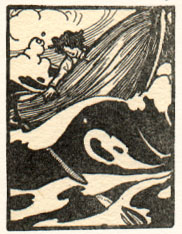 battalions, until the sun was hidden, and the seagulls flew low over the waves, uttering strange
shrill cries.
battalions, until the sun was hidden, and the seagulls flew low over the waves, uttering strange
shrill cries.
Godfrey happened to be in the boat emptying his baskets for the fourth time, when his attention was suddenly aroused by a big wave, which dashed it from its moorings so violently that the rope gave way.
"Father! Father!" he cried, but amidst the roar of the sea his voice was lost, and though he did his best to steady the boat with a heavy oar, it was swiftly carried away from the land on the strong current. Not until he was beyond help did his father come down to the shore.
The boat was carried swiftly on, tossed from side to side by big green waves, which, try as they would, could not overturn it. Stricken with terror, Godfrey crouched at the bottom, and when at length the motion of the sea grew calmer, and the rain ceased to beat on his shrinking form, he could scarcely believe that the storm was over. A little while later, and the keel of the boat struck on a rock. The planks shivered, but did not break, and he was thrown out upon dry land.
When the first shock was over he sat up tremblingly, and looked about him. Greatly to his surprise, for he had often heard his father say that the Green Island was the only one on that coast, he found himself upon a plateau of land. Wherever he looked there was nothing but rocks and sea and sky, and the scene was so desolate in its loneliness that he burst into tears.
"What shall I do?" he cried, gazing wildly round him. The doleful calls of the seagulls were his only answer, and wrapping himself in his father's coat, he sobbed himself to sleep.
When he awoke it was morning, and the troubled sea of the night before was a sheet of golden ripples, With renewed courage he made a meal on some of the bread and meat which had escaped a wetting. and as he did so he remembered how, but for his father's insistence the day before, he would now have no food at all. As he was very thirsty, he started to explore the little island, hoping to find some stream or spring, but for long he searched in vain. His throat was parched and dry, and his lips burning, when he heard the murmur of trickling water. Following this he came to a deep ravine, at the bottom of which ran a little steam.
 OW thankful he felt as he slaked his thirst, and bathed his face in its sparkling shallows! When he had rested a little, he climbed
a hill from whence he could see
a long way round him, but though the white sails of several
vessels were clearly visible against the distant coastline of the Green Island, his frantic signals failed to reach them, and they soon passed out of sight. Godfrey supped that night on bread and nuts, and then, wrapping himself once more in the big cloak, said his prayers and fell asleep.
OW thankful he felt as he slaked his thirst, and bathed his face in its sparkling shallows! When he had rested a little, he climbed
a hill from whence he could see
a long way round him, but though the white sails of several
vessels were clearly visible against the distant coastline of the Green Island, his frantic signals failed to reach them, and they soon passed out of sight. Godfrey supped that night on bread and nuts, and then, wrapping himself once more in the big cloak, said his prayers and fell asleep.
Meanwhile his parents suffered agonies of distress. His mother watched all through the night, and when morning came without any sign of her dear ones' return, she hastened to implore the help of a rich neighbour.
"Do not weep!" he said to her very kindly. "Most likely their boat has been carried away by the storm, and they are in safe shelter. I will seek them at once."
Without a moment's delay, he started for the Green Island in his fine new sailing vessel, and before long Godfrey's parents were weeping in each other's arms. When the mother heard what had happened to her boy, she was almost brokenhearted, and his brothers and sisters were overwhelmed with grief.
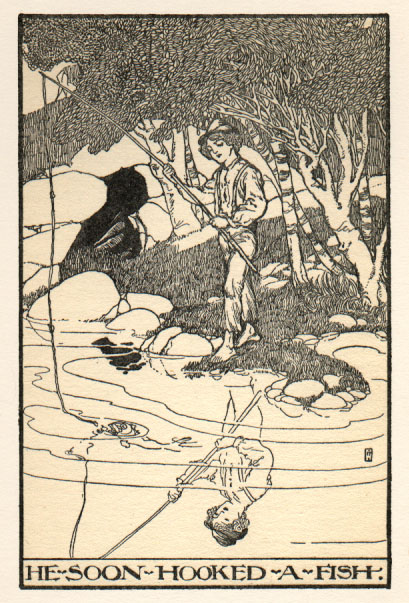
 E shall never see him again!" they sobbed, and little Elsa, who loved him best of all, no longer sang when she played with her
dolls, or helped her mother put the little ones to bed.
E shall never see him again!" they sobbed, and little Elsa, who loved him best of all, no longer sang when she played with her
dolls, or helped her mother put the little ones to bed.
As the days went on, and no one came to his rescue, Godfrey began to realise that if he wished to live he must bestir himself. The stock of food that he had brought with him in the boat was soon exhausted, and since it was only in the crevices of the rocks that plants could grow on that island, he found few berries to satisfy his hunger. The sight of fish in the deep pools left by the tide naturally suggested that he should catch them; the pretty green ribbon that Elsa had pinned round his hat the morning he left home made an excellent line, with a pin at one end, and a rod of willow at the other. After a long search he found a worm, and casting the rod into a pool, he soon hooked a fish. This he cooked in the iron pot over a fire of dried moss.
"What a good thing," he thought, "that Father made me carry all these things down to the boat. If I had left them under the tree when we had finished our meal, what should I have done now? Father was quite right; order is a very good thing."
Godfrey did not stop at catching the small fish in the pools. With the help of a sharp-pointed stone, he made a larger hook, and so caught big ones. He found a little salt, too, in a chink in the rocks, and this greatly improved their flavour. Mussels and limpets were now added to his usual fare, and when he discovered some eatable seaweed he felt that he was fortunate indeed.
The summer days slipped quickly by, and the stars smiled down on him through the friendly darkness in the dusk of evening. Although alone, he was not frightened until once more a heavy storm broke over the island, drenching his cloak with rain and making fishing impossible. He felt cold and wet, and very miserable, as he wondered what would happen to him when winter came.
"It will soon be here," he sighed. "It is autumn now, and the nights are getting colder. I must find a cave, or I shall be frozen to death."
It was not easy to do this, but at last he discovered a snug little shelter behind some bushes, and very close to the stream at which he slaked his thirst. He collected a big heap of moss, and took it inside to serve him as a bed. Opposite this he placed his precious chopper and iron pot, and the few planks which were all that now remained of his father's boat.
His next task was to chip a deep hole in a rock close by, so that he might fill this with water, and use it as a little reservoir in which to keep a supply of fish. Some of the planks he cut up for firewood, and the rest formed the roof of the stone kitchen he built between two rocks, since it was impossible for him to have a fire inside the cave on account of the smoke. As time went on, he thought of many other contrivances for his comfort, and became quite skilled in fashioning tools from the rough materials at his command, using his chopper as a hammer, and a large stone as an anvil. Before long he had quite a brave show of fishing-tackle, and if once the sea had been cruel to him, he found it now his kindest friend. It provided him with sufficient food to keep him alive through the dreary winter, and although he often went hungry to bed, when spring came he was strong and well, and the eggs of the sea-birds that built their nests on the island soon afforded him a pleasant change from so much fish.
 S the days grew longer, and white
sails crossed and recrossed the
calm blue waters, he hoped once
more that some one might see
his signals. But all in vain! His
poor little flag fluttered sadly in
the breeze, for the distant sailors, if they saw it at all, thought it only some homing sea-bird on the wing.
S the days grew longer, and white
sails crossed and recrossed the
calm blue waters, he hoped once
more that some one might see
his signals. But all in vain! His
poor little flag fluttered sadly in
the breeze, for the distant sailors, if they saw it at all, thought it only some homing sea-bird on the wing.
One evening, when the wind blew high, and the waves that dashed on the rocky island threw up great clouds of spray, the sound of most exquisite singing broke upon his ears; it seemed to come from a little bay where the waters were always calm. He hurried towards this, full of wonder, and there, on the edge of a steep black rock, he fancied he saw the most lovely mermaid, her white neck decked with ropes of pearls, and her glistening form half hidden in a veil of red-gold hair. She held out her arms to him entreatingly.
"Come to me, come!" she chanted, "and the treasures of the deep shall be yours for ever. Hunger and thirst shall trouble you no more, and your sleep shall be sweet and dreamless."
Godfrey would have flown to her embrace, for her voice was sweeter than the song of birds, but there flashed across his memory the warning, "Beware of merfolk," that he had once heard from his mother's lips. So he shook his head and resolutely turned away. The dulcet tones of the mermaid's voice changed to a shriek of anger, and tearing asunder her necklace of gleaming pearls, she plunged into the sea.
All that night through he dreamt of the scattered gems.
"If I could find them," he thought wistfully, as he made his way down to the shore, "my father would be rich."
Then he remembered that it was very unlikely that he would ever see his father and mother again, and when he reached the bay, his eyes were filled with tears. No mermaid sang there now, and he could find no pearls: but the sea had tossed up delicate branches of pink and red coral, and many shells. After a while he noticed a bed of oysters at the foot of the rock, and taking some of these back to the cave with him, he made a delicious breakfast. To his great delight he found inside each oyster. shell an exquisite round pearl, and he placed these with the coral in a little bag he had woven out of coarse grasses, to while away the time. Day by day, as he ate more oysters, he added to his shining store, and it saddened him to think that he could not send them home.
"I wish that the seagulls would carry them, if I may not go myself," he sighed. But the seagulls flew over his head in happy unconcern of all his troubles, and the night wind whispered patience.
Godfrey had been on the island now for a whole year. His clothes were quite worn out, and but for the big winter cloak that had been his father's, he would have had nothing to wear. With much ingenuity he cut it into a long coat, and when he had donned it he looked so like a monk or an old hermit that he laughed as he saw himself mirrored in the stream.
That summer he was never idle, storing up moss and drift-wood for fuel, and drying fish in the hot sun for winter use. He was very lonely, but the wind told him tales of far-off lands, and the summer breezes told him to hope on still.
"Something will happen soon," they murmured, and Godfrey tried to believe them.
One morning he set off early to collect driftwood, for the tide had been high the night before, and the beach was strewn with the wreckage of a great ship that had gone down far away. He had left a small fire burning in his little kitchen, and on his return he was horrified to see that the wind had blown it into a great one, and that its flames
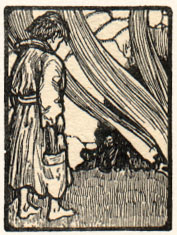 had caught the wooden ceiling. His stock of fuel and fishing-tackle were also burning fiercely—even his table and bench had not been spared; and when he saw that he would have nothing left, he fell on his knees in utter despair.
had caught the wooden ceiling. His stock of fuel and fishing-tackle were also burning fiercely—even his table and bench had not been spared; and when he saw that he would have nothing left, he fell on his knees in utter despair.
"I must die now," he sobbed. "The winter is coming, and I shall have neither food nor warmth, since I cannot fish without my tackle, and my fuel has all gone." And though the sun streamed down on him very kindly, and a soft little breeze tried to tell him that all was not yet lost, he would not be comforted.
Now it happened that on that very morning it had come into his father's head to visit the Green Island. His stock of willows was at an end, and despite his wife's forebodings, he set off with two of the children, promising faithfully that neither of them should get into the boat without him. The poor woman watched him pull off sorrowfully; she was thinking of Godfrey, whom she never expected to see again, and her tears fell fast as she went about her work.
 HE little party reached the island safely, and while the father busied
himself in cutting willows, the children played on the shore. When his task was done they begged him to take them up the
hill that they might catch a glimpse of their cottage.
HE little party reached the island safely, and while the father busied
himself in cutting willows, the children played on the shore. When his task was done they begged him to take them up the
hill that they might catch a glimpse of their cottage.
"How small it looks!" cried little Elsa, as they gazed far over the sea. "Look yonder, Father!" she added presently, "isn't that a wreath of smoke?"
"Yes," he replied; "very likely it is a ship on fire."
"I think it's a volcano," said his small son, who had been reading about one at school. But his father did not heed him.
"It's very curious," he said, "but I fancy I can see two hills. If so, that must be another island. I never heard of it before."
"If it's an island," cried Elsa, "perhaps it is inhabited, and Godfrey may be there."
The father had just the same thought, and it made him tremble.
"It is possible," he said. "Let us go back as quickly as we can, and I will speak to our neighbour. He is a kind man, and will lend me his sailing boat."
When they reached home their mother was told what they had seen, and her heart beat with a new hope. The neighbour consented gladly to lend his boat.
"To-morrow," he said to Godfrey's father, "if the weather is favourable, we will go, and perhaps neighbour John will accompany us."
The men set off early the following morning, but when they reached the plateau of rocks where Godfrey had found a refuge, they saw no signs of any dwelling, nor of a human being.
"It is an uninhabited island!" neighbour John said sadly.
"Let us explore it carefully," cried Godfrey's father. "Perhaps we shall discover something that once belonged to my poor boy."
Suddenly they caught sight of a slender figure in a long garment, and took it to be that of a monk. As they hastened towards it with eager questions, the figure turned, and sprang into the father's arms with a cry of joy. It was no monk he found, but Godfrey himself.
By this time the sun was setting, and the sea was a field of gold. As they sat together in the peaceful twilight, for they could not leave the island until dawn, Godfrey told his rescuers how he had contrived to live through the long winter, and of his despair when the fire destroyed his few possessions.
 THOUGHT that I was quite forsaken," he said, and his father
drew him yet closer to his side.
THOUGHT that I was quite forsaken," he said, and his father
drew him yet closer to his side.
"No, my son," he told him gravely, "you were not forsaken. It was the smoke from that fire that made me think there was an island here, and but for this we should never have come to save you."
No words can describe his mother's joy when Godfrey was restored to her, and his brothers and sisters would hardly let him out of their sight. The kindly neighbour made a feast for him, and his friends gathered round from far and near to listen to the story of his adventures. The courage and perseverance that he had shown under such great difficulties made them look upon him as a little hero, but what pleased him most was the fact that his father would be poor no longer. For the pearls and corals in Godfrey's little bag fetched so large a sum that he and his wife lived in comfort for the rest of their days, and were able to give their children a good education, which they could not do before.
Godfrey was taught many things at school, but the lessons of patience and trust and perseverance, which he had learnt on that lonely island, were more precious to him than all.
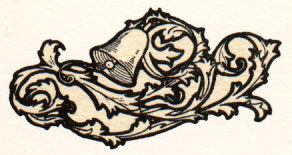
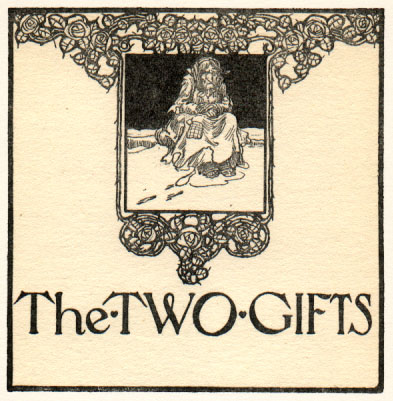
 HEAVY snowstorm was raging, and great soft flakes fell through the air like feathers shaken from the wings of an innumerable host of angels. By the side of the roadway sat a poor old woman, her scanty clothing affording but poor protection from the icy blast of the wind. She was very hungry, for she had tasted no food that day, but her faded eyes were calm and patient, telling of an unwavering trust in Providence. Perhaps, she thought, some
traveller might come that way who would take compassion on her, and give her alms; then she could return to the garret that she called "home," with bread to eat, and fuel to kindle a fire.
HEAVY snowstorm was raging, and great soft flakes fell through the air like feathers shaken from the wings of an innumerable host of angels. By the side of the roadway sat a poor old woman, her scanty clothing affording but poor protection from the icy blast of the wind. She was very hungry, for she had tasted no food that day, but her faded eyes were calm and patient, telling of an unwavering trust in Providence. Perhaps, she thought, some
traveller might come that way who would take compassion on her, and give her alms; then she could return to the garret that she called "home," with bread to eat, and fuel to kindle a fire.
The day drew in, and still she sat and waited. At last a traveller approached. The thick snow muffled every sound, and she was not aware of his coming until his burly figure loomed before her. Her plaintive voice made him turn with a start.
"Poor woman," he cried, pausing to look at her very pityingly. "It is hard for you to be out in such weather as this." Then he passed on, without giving her anything; his conscience told him that he ought to have relieved her, but he did not feel inclined to take off his thick glove in that bitter cold, and without doing this he could not have found a coin.
The poor woman was naturally disappointed, but she was grateful for his kind words. By and by another traveller appeared. This one was driving in a splendid carriage, warmly wrapped in a great fur cloak. As he caught sight of the poor creature by the roadside, he felt vaguely touched by the contrast of his own comfort with her misery. Obeying a sudden impulse, with one hand he let down the carriage window and signed to his coachman to stop, and with the other felt in his pocket. The poor old woman hurried up to the carriage, a thrill of hope bringing a tinge of colour to her pale and withered cheeks.
"How terribly cold it is!" exclaimed the rich man, and as he took his hand from his pocket, and held out a coin to her, he noticed that instead of silver he was about to give her a piece of gold.
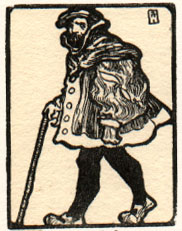 "Dear me! That is far
too much," he cried, but
before he could return it
to his pocket, the coin
slipped through his fingers,
and fell in the snow. A
rough blast of wind made
his teeth chatter, and pulling up the window in a
great hurry, with a little
shiver he drew the fur rug
closely round him.
"Dear me! That is far
too much," he cried, but
before he could return it
to his pocket, the coin
slipped through his fingers,
and fell in the snow. A
rough blast of wind made
his teeth chatter, and pulling up the window in a
great hurry, with a little
shiver he drew the fur rug
closely round him.
"It certainly was too much," he murmured philosophically, as the carriage rolled on, "but then I am very rich, and can afford to do a generous action now and then."
When his comfortable dinner was over, and he was sitting in front of a blazing fire, he thought once more of the poor old woman.
"It is not nearly so cold as I thought," he remarked as he settled himself more comfortably in his deep arm-chair. "I certainly gave that old creature too much. However, what's done, is done, and I hope she will make good use of it. I was generous, very generous indeed, and no doubt God will reward me."
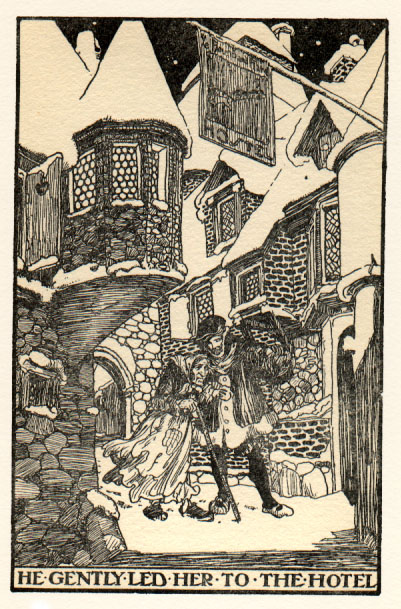
Meanwhile the other traveller had also reached his journey's end; and he too had found a blazing fire and good dinner awaiting him. He could not enjoy it, however, for he was haunted by the remembrance of that bent and shrunken figure in the waste of snow, and felt very remorseful for not having stopped to help her. At last he could bear it no longer.
"Bring another plate," he said, calling the servant to him. "There will be two to dine instead of one. I shall be back soon."
Saying this, he hurried through the darkness to the spot where he had left the old woman; she was still there, feebly searching amongst the snow.
"What are you looking for?" he asked.
"I am trying to find a piece of money, which a gentleman threw me from his carriage window," she told him falteringly, scarcely able to speak from cold and hunger. It was no wonder, he thought, that she had not found it, for her hands were numbed and half frozen, and she was not only old, but nearly blind.
"I am afraid you will never find it now," he said. "But come with me," he added consolingly. "I will take you to my inn, where there is a bright fire and a good dinner waiting for both of us. You shall be my guest, and I will see that you have a comfortable night's lodging."
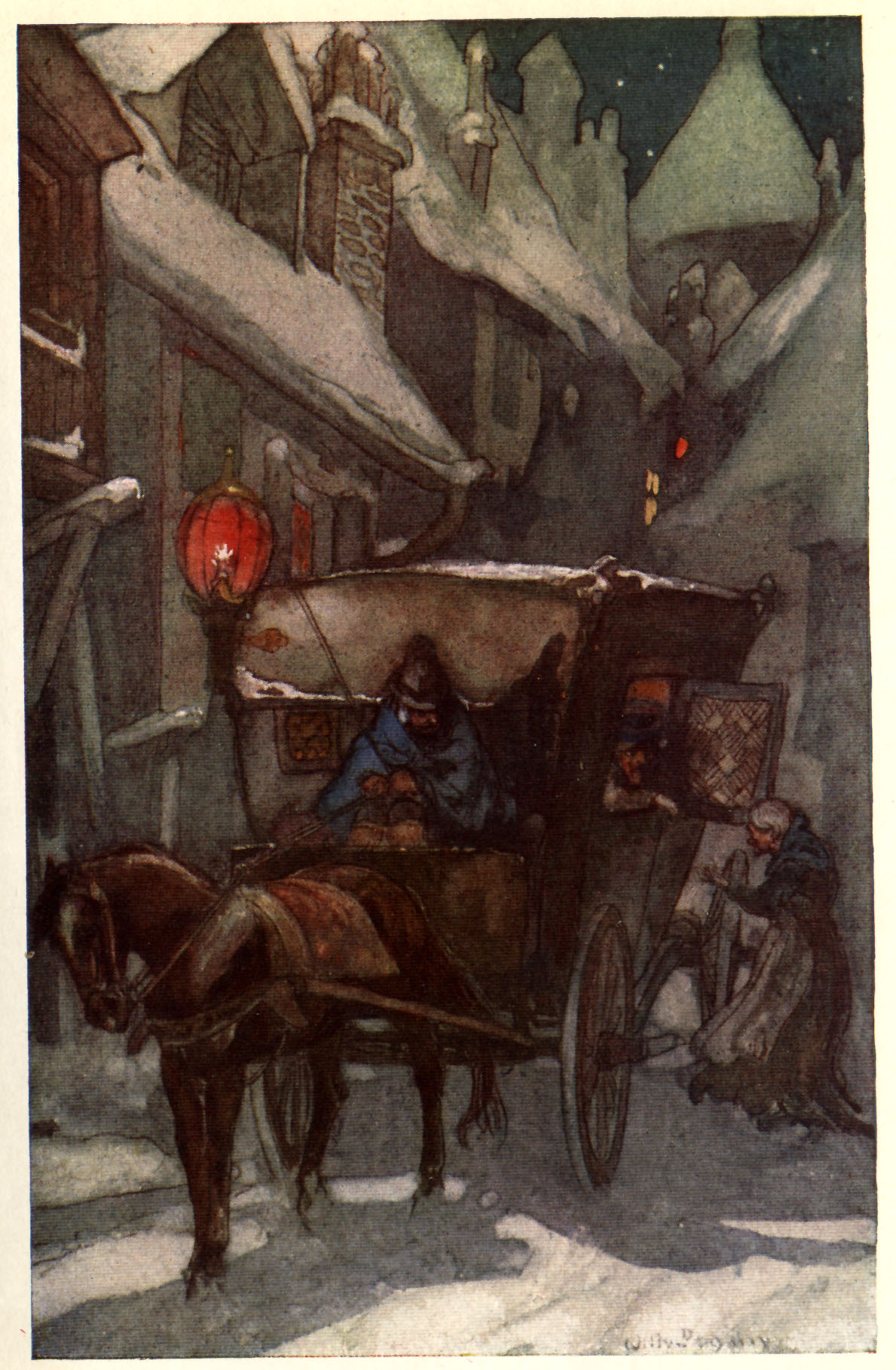
"THE COIN SLIPPED THROUGH HIS FINGERS"
 HE poor old woman could scarcely believe her good fortune, as she
tremblingly prepared to follow her
new friend. Noticing that she
was lame as well as nearly blind,
he took her arm, and with slow
and patient steps led her to the hotel.
HE poor old woman could scarcely believe her good fortune, as she
tremblingly prepared to follow her
new friend. Noticing that she
was lame as well as nearly blind,
he took her arm, and with slow
and patient steps led her to the hotel.
When the recording angel wrote that night in the Book of Heaven, he made no mention of the piece of gold which the wealthy traveller had given by mistake, for only a worthy motive gains credit in that Book; but amidst the good deeds that had been wrought that day, he gave a foremost place to that of the man who had repented of his hardness and faced once more the bitter cold that he might share his comforts with a fellow-creature so much less fortunate than himself.
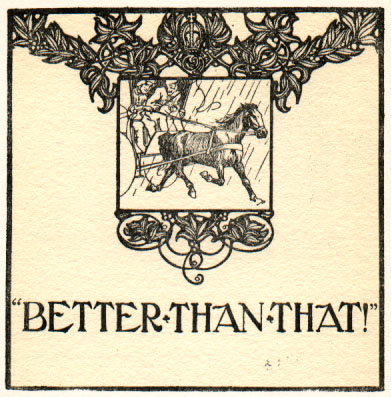
 OSEPH was one of Austria's greatest Emperors, and many trembled at his frown. The monarchs of other lands
paid court to him, and he was the envied of all; but he often grew weary of the cares of State, and longed for a more simple life than he could live in his palace. His greatest pleasure at such times was to leave his nobles, and wander unattended, so plainly dressed that he might have been one of his poorer subjects, through the streets
of his grand capital. Sometimes he would go for a ramble in the surrounding country, finding in the company of the wood-folk, and the rustling of the forest leaves, far more delight than in the gorgeous functions at the palace.
OSEPH was one of Austria's greatest Emperors, and many trembled at his frown. The monarchs of other lands
paid court to him, and he was the envied of all; but he often grew weary of the cares of State, and longed for a more simple life than he could live in his palace. His greatest pleasure at such times was to leave his nobles, and wander unattended, so plainly dressed that he might have been one of his poorer subjects, through the streets
of his grand capital. Sometimes he would go for a ramble in the surrounding country, finding in the company of the wood-folk, and the rustling of the forest leaves, far more delight than in the gorgeous functions at the palace.
One Sunday in autumn, when the trees had donned their richest garb of red and orange, he determined to go for a long drive, and taking an unpretentious buggy and one of the fleetest horses in his stable, he set off by himself.
Though the sky had been cloudless when he started, and the people he met were dressed in their best, as if bad weather were out of the question, the wind blew up from the rainy quarter, and before long a sharp shower made him raise the hood of his buggy. The citizens now were hurrying to shelter, and he too thought it well to return. He had not driven far upon the homeward road when a soldier accosted him, little guessing to whom he spoke.
"I beg your pardon, sir," he said, "but I thought that perhaps you would give me a lift, as I should not inconvenience you. My uniform is a new one, and I don't want to get it spoilt."
He was a fine, handsome young fellow, with a frank and open face. The Emperor was much taken by his appearance, and invited him to jump in. In a few minutes they were chatting together as if they had been well acquainted, and the soldier treated his new friend to a glowing account of a pleasant day he had lately spent with an old comrade.
"He gave me a famous dinner, I can tell you," he concluded, and the Emperor, much amused, inquired of what this had consisted.
"Guess," cried the soldier, chuckling with delight at the recollection of his feast.
"Cabbage soup, perhaps?" questioned his Majesty with an indulgent smile.
"'Soup,' indeed!" the soldier exclaimed with much contempt. "Better than that; you must guess again."
"A calf's head, then?" said the Emperor.
"Better than that, even!" was the laughing answer, and the same reply was given when the Emperor suggested a big slice of ham.
"Much better than that!" cried the soldier
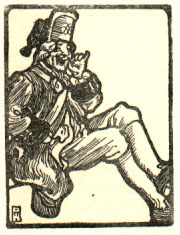 triumphantly. "I had a
roast pheasant, and one
that I shot myself on his
Majesty's estate, for my
friend is now one of the
Emperor's gamekeepers. It
was delicious, and no mistake."
triumphantly. "I had a
roast pheasant, and one
that I shot myself on his
Majesty's estate, for my
friend is now one of the
Emperor's gamekeepers. It
was delicious, and no mistake."
His companion made no reply, but the soldier chatted away quite at his ease, telling him of the aged parents who were so proud of him, and the dear little "Greta" who would one day become his wife.
"Where do you live?" inquired his Majesty as they neared the city. "The rain has ceased, but I should like to drive you home."
Much gratified by this further kindness, the soldier thanked him warmly, and begged that he would tell his name.
"Ah! it is your turn to guess now," remarked the Emperor. "Who do you think I am?"
"Perhaps you also have something to do with the army?" hazarded the soldier with a searching look. The Emperor nodded.
"You are a private soldier?" was the next guess.
"Better than that," the Emperor smilingly returned.
"A Lieutenant, then?"
"Better than that!"
"A Colonel?" stammered the soldier, beginning to feel alarmed.
"Better than that, I assure you."
"Perhaps, then, you are a General?" the man said timidly, and then, in desperation, as the Emperor shook his head, he suggested, "A Field-Marshal?"
"Better than that!" said the Emperor once more, and the soldier turned pale with terror.
 HEN you must be his Majesty himself!" he gasped, and would have sprung from the buggy if the Emperor had not prevented
him.
HEN you must be his Majesty himself!" he gasped, and would have sprung from the buggy if the Emperor had not prevented
him.
"We will keep to our bargain," he said, and insisted upon driving him right up to his home. On the way he gave the young man some good advice that he never forgot, and ended by saying, with a kindly twinkle in his deep-set eyes: "And be careful in future not to kill pheasants before first obtaining the owner's permission, or to tell tales of your friends to the first stranger who comes your way."
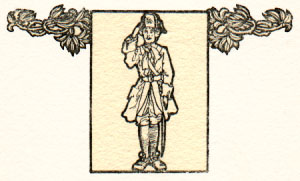
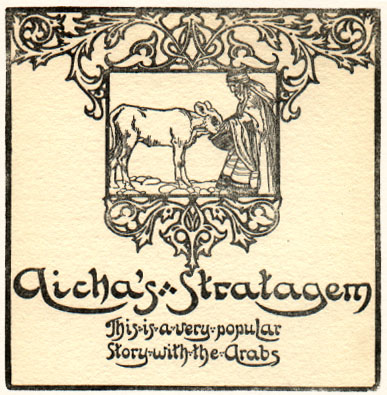
 TOWN of Tlemcen, in Algeria, was under siege, and its ill-starred inhabitants were now on the point of starvation. Daily provisions became more scarce; meat and bread fetched unheard-of prices, and in the poorer quarters many of the weaker folk had already perished from hunger. The hospitals were crowded with sick; wherever one turned there were scenes of misery and destitution, and even the
bravest men seemed to have lost all hope. It was Tlemcen's darkest hour.
TOWN of Tlemcen, in Algeria, was under siege, and its ill-starred inhabitants were now on the point of starvation. Daily provisions became more scarce; meat and bread fetched unheard-of prices, and in the poorer quarters many of the weaker folk had already perished from hunger. The hospitals were crowded with sick; wherever one turned there were scenes of misery and destitution, and even the
bravest men seemed to have lost all hope. It was Tlemcen's darkest hour.
In desperation the Mayor summoned a meeting of the citizens.
"My friends," he said, "there is nothing for it but to surrender the town.... We have come to the end of our resources, and starvation stares us in the face."
The men met this announcement in heartbroken silence, and the sound of bitter weeping came from the spot where wives and mothers clung together in their despair. After a moment's pause a very old woman detached herself from her companions. Her name was Aïcha, and from her wrinkled face looked out a pair of bright keen eyes that were far-seeing as an eagle's. As she came forward they flashed with scorn, and her shrunken figure straightened itself and grew tall again.
"No, no," she cried, "we will not give in yet. I have a plan by which we can save the town. Our prophet Mahomet will help us, if you will but do as I say; the enemy will retreat, and we shall be spared the shame of a surrender."
So impressed was the Mayor with the earnestness of her speech, that a glimmer of hope came back to his gloomy mind: he motioned the old woman to come nearer.
"Tell me your plan, good Aïcha," he commanded. "Speak loudly, that all may hear."
Raising her voice until it was borne to the farthest extremity of the market-place, Aïcha said briefly:
"First you must find me a calf!"
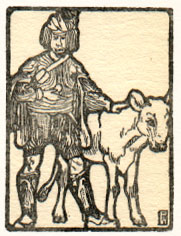 "A calf?" cried the Mayor in amazement. "Why, the last was killed long ago. It would be impossible to obtain one now for its weight in gold."
"A calf?" cried the Mayor in amazement. "Why, the last was killed long ago. It would be impossible to obtain one now for its weight in gold."
But Aïcha persisted that a calf should be found, and her friends and neighbours scattered far and wide to search for one. They were presently rewarded by the discovery of a beautiful milk-white little animal that had been hidden away in the cow-shed of an old miser, who had thought to fetch a great price for it later on. In spite of his protestations it was carried off in triumph, and when Aïcha saw it her thin lips smiled.
"Now bring me some grain," she cried; and at this there was a dismayed outcry.
"There is none to be had, woman, as you should know," said the Mayor indignantly, afraid that the hope with which she had inspired him was but a will-o'-the-wisp.
"Search from house to house," she urged the people, and, though they shook their heads, they did her bidding, with the result that after some hours' work they brought her enough corn to fill a measure. Aïcha moistened it to increase its bulk, and at once began to feed the hungry calf. The Mayor was horrified.
"What terrible waste!" he exclaimed. "Don't you know that even the children are starving, and that the sick in the hospitals are without food? How dare you squander thus that precious grain?"
Aïcha went on feeding the calf as if she had not heard, until the threatening mien of the Mayor compelled her to speak.
"Give me my way," she pleaded eagerly, "and the enemy will retreat." So he shrugged his shoulders and let her be.
When the calf had emptied the measure, Aïcha led it to the gates of the city, and, followed by a wondering crowd, she commanded the sentry to open the gates for her. This he very properly refused to do until the Mayor had come in person to enforce the order. When the gates were at last unlocked, Aïcha pushed out the calf, which at once began to browse on the short grass outside the ramparts. The enemy scarcely allowed it to enjoy a mouthful, however, for it was at once seized by a posse of soldiers, who carried it into their camp with much rejoicing. The King and his generals stared as though they could hardly believe the evidence of their eyes.
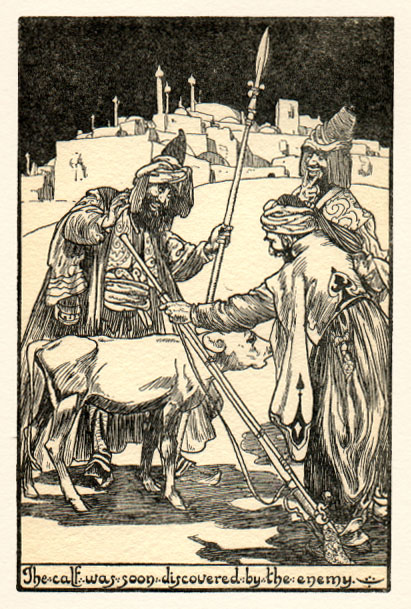
 THOUGHT that the town was starving," exclaimed his Majesty, looking much perturbed, "but if this were the case the citizens would most certainly have killed this beautiful calf."
THOUGHT that the town was starving," exclaimed his Majesty, looking much perturbed, "but if this were the case the citizens would most certainly have killed this beautiful calf."
"It is rather lean," remarked one of the nobles. "Still, your Majesty is right. They must be better provisioned than we ourselves, or they would have killed and eaten it long before now."
The troops were naturally greatly discouraged by this new aspect of affairs, and, in order to please them, the King decreed that as it was some time since they had eaten fresh meat, they should have the calf for their own use, and make a feast with it. They killed it joyfully, for they too were on short commons, and when they found inside it a quantity of undigested corn, they were more surprised than ever at the resources of Tlemcen. The King grew very grave when this was reported to him, and at once summoned his Generals.
"If the townspeople have grain to spare for their cattle," he pointed out, "it is we, and not they, who will perish with hunger, if the siege be not soon raised."
The Generals sadly agreed; already discontent was brooding amidst the soldiers, and their officers knew there was danger of mutiny.
"There is nothing for it but to retreat," they sighed, and the news ran like wildfire through the camp.
That night, as Aïcha had prophesied, the enemy disappeared, and when morning came the plains were empty. Thanks to her stratagem, the town was saved. The grateful citizens carried her on their shoulders through all the principal streets, amidst loud acclamations from the populace, and the Mayor himself took steps to ensure that the rest of her life should be spent in comfort.
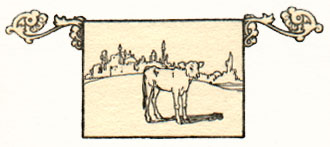
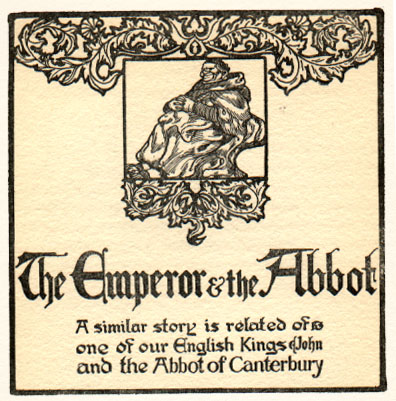
 HE Emperor Charlemagne was a splendid horseman, and there was nothing he enjoyed more than a long ride through field and forest. He galloped just where his fancy led him, only staying his flying steed when he wished to gaze with pride over his vast dominions.
HE Emperor Charlemagne was a splendid horseman, and there was nothing he enjoyed more than a long ride through field and forest. He galloped just where his fancy led him, only staying his flying steed when he wished to gaze with pride over his vast dominions.
On one of these occasions he saw before him the Abbey of St Gall, and noticed with much amusement the sleek and contented air of the good Abbot, who was just then strolling through the lovely gardens. His brow was smooth and open; his eyes were bright and placid as a child's, and from his well-nourished appearance it was plain that care sat lightly upon him. As the Emperor surveyed him, himself unseen, he felt a pang of envy.
"My good Abbot takes life too easily," he thought; "I must give him something to think of." And leaving his horse with a startled servitor, he entered the gardens and greeted the Abbot with kindly dignity. So pleasant was he in his inquiries as to his mode of life, the way he employed his time, and so on, that the Abbot was ill prepared for his concluding speech.
"I have three more questions to ask you," said the Emperor. "If you can answer them correctly, you shall continue to be the Abbot of St Gall. If you fail, however, I shall command you to ride round the city on an ass, with your back towards his head, and holding his tail in your hand instead of a bridle."
The Abbot turned pale and trembled, and his voice shook as he inquired what his Majesty's will might be. He knew, poor man, that he was far from clever, and the thought of riding upon the ass in the way described disturbed him as nothing had done for years. The Emperor, well satisfied to have ruffled his calm content, smiled to himself as he continued.
"Listen," he cried, "and listen well! For the peace of your future depends upon this. I will ask you my questions now, but I will give you three months in which to answer them, so that you
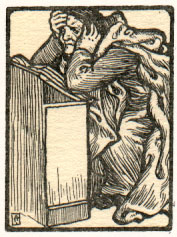 cannot complain I have taken you unawares. The first one is, how long to a minute
will it take me to go round the world?"
cannot complain I have taken you unawares. The first one is, how long to a minute
will it take me to go round the world?"
The Abbot gasped, and the Emperor smiled grimly as he put the second question.
"How much am I worth to a penny, when my crown is on my head, my sceptre in my hand, and I am clad in my royal robes?"
He paused a moment to let the import of his words sink into the Abbot's mind; then struck his final blow.
"Lastly," he said, "you must not only tell me of what I am thinking at the moment, when I next put the question, but you must prove that I am mistaken, and quite in the wrong."
The Abbot was beyond speech now, and, laughing heartily at his discomfiture, and reminding him of the ignominious penance that awaited him if he failed, the Emperor mounted his horse and rode away.
Gone was the good Abbot's peace of mind. Night and day he was haunted by those terrible questions; he could not sleep, and he could not eat. His plight indeed was pitiable. In vain he consulted the learned men throughout the Emperor's dominions. The wisest professors in the great universities shook their heads when the questions were put to them, and the answers they gave were so unsatisfactory that even the Abbot could see they would not do. A month flew by as if its flight were winged; a second followed it swiftly, and when the third drew to its close the Abbot was in despair. None of his friends could comfort him, and, sad at heart, he wandered over the country, envying the humblest creature that made its home in the fields.
He was in this mood when he was suddenly accosted by a shepherd, to whom he was well known by sight.
"Good morning, Lord Abbot," said the man. "You seem distressed. I would gladly serve you if I could, for many a sup of good red wine did you send my wife when she was ill, and food for the children when times were hard. Tell me, I pray you, what troubles you so sorely? A mouse before now has been known to help a lion."
The Abbot was touched by the poor man's sympathy, which he accepted as simply as it was offered.
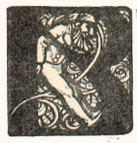 E thankful," he said, "that you
are only a shepherd, for many are
the ills that your position spares
you." And laying aside his usual
reserve with his inferiors, he told him of the penance he must perform if he failed to answer the Emperor's terrible questions.
E thankful," he said, "that you
are only a shepherd, for many are
the ills that your position spares
you." And laying aside his usual
reserve with his inferiors, he told him of the penance he must perform if he failed to answer the Emperor's terrible questions.
"The time that his Majesty gave me has nearly expired," he added mournfully, "and I am no nearer to solving them than I was at first."
Too dispirited to try and hide the tears that filled his eyes, the Abbot sadly resumed his walk. The shepherd laid a detaining hand on his flowing mantle.
"My lord," he said, "I am only a humble shepherd, but I believe I can answer those questions for you. If you will lend me your cloak, your mitre, and your cross, I will appear before the Emperor in your place, and you will be spared this trial."
The Abbot shook his head at this suggestion, but after a moment or two it did not appear to him so wild as it had done at first. Strange to relate, the shepherd was much the same build as himself, and had the rosy cheeks and unwrinkled brow that had been his own before the Emperor's visit. His eyes also were similar in colour to the good Abbot's, and when he spoke gently, as he did now, his voice was not too rough.
"You are a good fellow," said the Abbot gratefully, suddenly realising that if the shepherd took his place before the Emperor, he would likewise have to carry out the prescribed penance if he failed to answer the questions. After a little more urging on the poor man's part, he consented to his request. It was a forlorn hope, but a drowning man catches at a straw, and the Abbot's dreams were still haunted by a giant ass which had the head of the Emperor and a thousand tongues.
When the last day of the three months' grace had expired, his Majesty, who had by this time forgotten the whole occurrence, was told that the Abbot of St Gall awaited his royal pleasure. Laughing maliciously, he contemplated for some moments the man whom he believed to be the victim of his ingenious questions, noting with satisfaction that his figure appeared less bulky than before.
"Oho!" he cried, "it strikes me, my Lord Abbot, that you are somewhat thinner than you used to be!—less sleek of hair too, and your face is oval instead of round.... Have you found the answers to my questions? If not, remember, you must pay the penalty!"
To his amazement the Abbot looked him bravely in the face instead of cringing.
"I quite understand, your Majesty," he replied, "and am prepared to carry out your conditions."
"Well, then," said the Emperor, rather taken aback, "tell me, in the first place, the exact time, to the very minute, in which I could go round the world on horseback. Do not hurry—I want an accurate reply."
"If your Majesty will set out the instant the sun flames his banners above the horizon, and travel as quickly round the world as he does, you will have completed the tour in just twenty-four hours."
 HIS answer so amazed the Emperor that he remained silent for
a while. As he could find no
fault with it, he passed on to the
second question.
HIS answer so amazed the Emperor that he remained silent for
a while. As he could find no
fault with it, he passed on to the
second question.
"Well, then, how much am I worth, to the very penny, when clad in my royal robes, with my crown on my head, and my sceptre in my hand?"
Without showing the least sign of fear or hesitation, the pretended Abbot still looked him steadily in the face, and reverently lowered his voice.
"The Saviour of the World," he said, "was sold for thirty pieces of silver, and, since your Majesty would not claim to be so great as He, I therefore estimate your value at one piece less."
This answer did not please the Emperor, but he could not openly find fault with it.
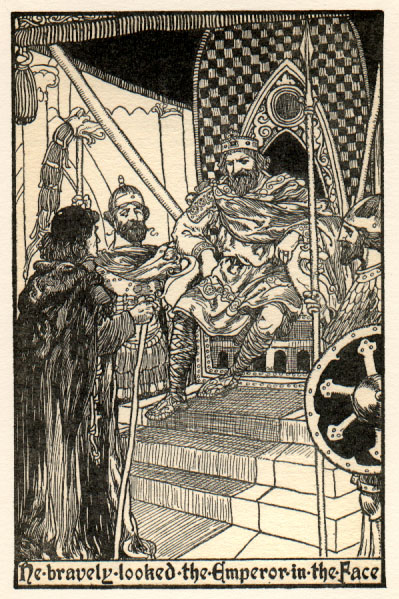
"Well," he said haughtily "you have certainly answered two of my questions, but the third is yet to come, and if you fail with this, you must still ride through the city on an ass. Tell me what I think at this present moment!"
"You think that I am the Abbot of St Gall," was the quick reply.
"I do," returned the Emperor, "and I am curious to know how you are going to prove that I am wrong!"
The shepherd took off his cloak and mitre, displaying his peasant's garb.
"Then I am not," he said with emphasis, "as you may see." The contrast between the Abbot's robes and the shepherd's raiment so tickled the Emperor's fancy that he burst out laughing.
"You are a daring fellow," he exclaimed, "and a witty one also. Since you have afforded me so much amusement I will give you any reward that you may ask—even to making you the Abbot of St Gall in the place of your master."
"As your Majesty has so graciously promised to give me what I ask," returned the honest shepherd, "let my good master remain the Abbot for the rest of his life, without further anxiety."
"Would that my courtiers were as true to me as you are to him!" replied the Emperor, greatly struck by this poor man's loyalty and devotion. He did as he wished, and promised that the Abbot should be left in peace for the rest of his life; but he made it a condition that the shepherd himself should be well paid, so that in future he and his children need fear neither cold nor hunger. To do him justice, the Abbot was in no danger of forgetting his services, and as a further token of gratitude for his timely help, no one in need was ever allowed to leave the Abbey in want or misery.
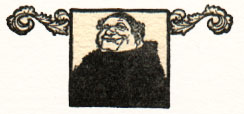
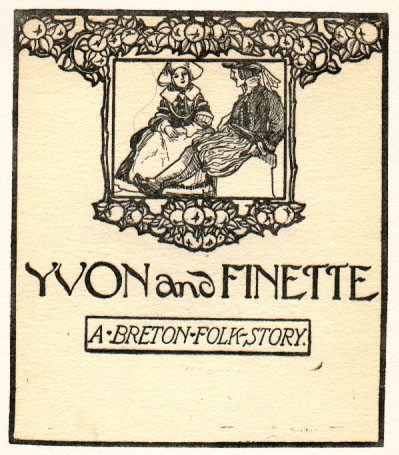
 MONGST the ancient nobles of Brittany was a Baron so brave and good that no one had aught to say against him. It seemed indeed as if he were a favourite of fortune, for his six tall sons were well built and handsome, his six fair daughters the loveliest in the land, and his wife as sweet as she was beautiful. When a thirteenth child was born to them, the good
Baron declared that they could scarcely find room for another baby, so numerous was his family; but the little fellow soon became as dear to him as the rest.
MONGST the ancient nobles of Brittany was a Baron so brave and good that no one had aught to say against him. It seemed indeed as if he were a favourite of fortune, for his six tall sons were well built and handsome, his six fair daughters the loveliest in the land, and his wife as sweet as she was beautiful. When a thirteenth child was born to them, the good
Baron declared that they could scarcely find room for another baby, so numerous was his family; but the little fellow soon became as dear to him as the rest.
They called him "Yvon," and as he grew up he was beloved by all for his courage and good temper. From his earliest childhood nothing could daunt him, and when he was one-and-twenty he longed to go out and fight the world. Approaching his father, he explained his wish to him.
"Let me seek my fortune!" he cried. "There are so many at the castle that there is really no place for me, and I have nothing to do. The world is wide and I would prove my courage. Dear father, let me go!"
The Baron demurred at first, but in the end he agreed, and Yvon, bidding them all farewell, set off in excellent spirits. The motto of the Kerver family—"Forward!"—rang in his ears, and he sang to himself as he stepped out blithely.
On reaching the coast he found a vessel ready to set sail, and gladly embarked. What hopes were his as the great sails filled with wind, and bore the vessel high over the crested waves! When the storm blew up and the sky grew dark, he began to think his adventures had begun, and as the great ship struck upon a rock, and word went round that she was sinking, he was still undismayed. Forgetful of his own safety, he gave up his place in the boats, first to one and then to another, and in the midst of that panic-stricken crew he alone was calm and collected.
 T was well for him that he stayed on deck, for the boats were scarcely launched when they were overturned by the raging sea. Yvon alone, out of all that crew, was able to fight his way to shore,
and as he battled with the waves
the family watchword "Forward!" rang in his ears and mingled with the storm.
T was well for him that he stayed on deck, for the boats were scarcely launched when they were overturned by the raging sea. Yvon alone, out of all that crew, was able to fight his way to shore,
and as he battled with the waves
the family watchword "Forward!" rang in his ears and mingled with the storm.
When at last he reached the land he was all but exhausted, but after having rested awhile on the wreck-strewn beach, he climbed the nearest hill. The sullen waters stretched on every side, so he knew he was on an island. From his post of vantage he saw a great house standing alone, and hastening towards this, he found it even larger than it had at first appeared to him. The doors and windows were fully sixty feet in height, and when he gained the entrance he found it quite impossible to touch the knocker of the huge door. Undaunted by this, he picked up a stone, and hammered loudly on the panels.
His summons was quickly answered. A Giant, so tall that his head towered above Yvon like that of some mighty forest tree, glared at him angrily from the threshold.
"Who are you?" he thundered, in a voice that shook the walls. "Who are you, and what do you want?"
"I am Yvon, son of the Baron Kerver in Brittany, and I am come to seek my fortune," replied the youth.
"Good," cried the Giant. "Then your fortune is made. I am seeking a servant, and you can have the place. If you serve me well I will pay you well, but if you do not do exactly what I tell you I will eat you."
"Agreed," said Yvon cheerfully, wringing the water from his coat and making to step inside. But the Giant moved farther forward and barred his way.
"I shall be busy to-day," he said in a curious voice, "for I am taking my flocks to the mountains. During my absence you must clean out the stables thoroughly, and, whatever you do, don't attempt to enter my house. Mind this, on pain of my displeasure." And with a threatening scowl he drew the door close to and strode away. Yvon looked after him reflectively.
"There must be something very interesting in the house," he said, "or my new master would not have forbidden me to enter." Finding the door unlatched, he strolled leisurely through the hall and into the first room. This was completely empty, with the exception of a large iron pot hung over the grate. Peering inside it, Yvon discovered a strange thick fluid that appeared to be bubbling with heat, although there was no sign of any fire.
"I wonder what it tastes like?" he thought,
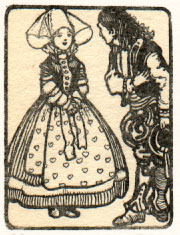 but
prudently deciding to get
some idea of what it was
made before he tried it, he
cut off a lock of his hair and
dipped it into the seething
mass. On drawing it out
again, he found to his surprise that the dusky lock
was coated over with copper.
but
prudently deciding to get
some idea of what it was
made before he tried it, he
cut off a lock of his hair and
dipped it into the seething
mass. On drawing it out
again, he found to his surprise that the dusky lock
was coated over with copper.
"Dear me!" he cried, "the Giant must have a very strong digestion to be able to eat this. I hope he won't give any of it to me."
More curious than ever, he entered a second chamber, where everything was just the same as in the first. There was no furniture of any kind—only a great iron pot in the fireless grate. On dipping a lock of hair into the midst of this, he found it coated with silver.
"This new master of mine must be rich indeed," he thought, "to feast on silver soup. I should not care to drink it myself, but every one to his taste."
The third room he entered was no different from the others, but here the big iron pot contained a yellow liquid that gleamed like gold. Yvon was greatly impressed by the Giant's wealth, and without any scruple entered the fourth room. As he did so, a lovely girl ran hastily towards him, exclaiming: "Who are you, sir, and what are you doing here? Unhappy youth! You know not the dangers round you. If the Giant should find you he would kill you at once. Hasten away, I pray you."
"I am Yvon, the son of Baron Kerver," he replied. "I am seeking my fortune, and am not at all afraid of the Giant. He has engaged me to be his servant."
 HILE he spoke, Yvon was gazing at the girl's fair face, and admiring the exquisite violet of her eyes. As these met his she blushed divinely, and her eyelids drooped over them like snow-white satin curtains.
HILE he spoke, Yvon was gazing at the girl's fair face, and admiring the exquisite violet of her eyes. As these met his she blushed divinely, and her eyelids drooped over them like snow-white satin curtains.
"What has he given you to do?" she faltered. When Yvon told her, her cheeks lost all their delicate colour.
"To sweep out a stable sounds an easy task," she said, "but you would not find it so. The Giant's stable is a magic one, and he has laid it under a spell. When you sweep the dust through the door it flies back through the window, but if you use the handle of the broom instead of the other end, the stable will empty itself, and not a speck of dust will remain."
 AM glad to hear that," said Yvon contentedly, "and when I set to work I will do as you say. But now, since I have found you, let us talk together. I want to hear
everything you have to tell me,
and why you are living in the Giant's house."
AM glad to hear that," said Yvon contentedly, "and when I set to work I will do as you say. But now, since I have found you, let us talk together. I want to hear
everything you have to tell me,
and why you are living in the Giant's house."
The fair young girl allowed him to lead her to a seat in the deep window, and her voice was like sweetest music as she told him how she had become a captive of the Giant. Her name was "Finette," she added, and Yvon thought it the prettiest in the world. He in his turn told her where he came from, and all he could remember of his past life, and they were too much engrossed in each other to notice that the shadows were lengthening in the west. It was not until the twilight spread her purple haze that Yvon thought of the hour.
"Make haste, my friend, and sweep the stable, or the Giant will be here first," cried Finette anxiously; and with one more look into her violet eyes, Yvon obeyed her.
He was thinking so much of her gentle ways that he did not at first remember her instructions, and the dust flew round him in such clouds that he was almost stifled. He immediately reversed the broom, and at once it happened as she had said. The stable swept itself without any further trouble on his part, and, folding his arms, he sat down on a bench outside to await his master's return. The Giant looked anything but pleasant when he caught sight of the young man.
"Why are you sitting there, you lazy scoundrel?" he shouted angrily.
"Because I have nothing to do," was Yvon's cool reply.
"What!" cried the Giant; "I told you to sweep out the stable."
"It is done," replied Yvon, and away went the Giant to see if this were true. He came back angrier than before. "You rascal," he exclaimed, "you never did that unaided. You have seen my Finette."
Yvon met this accusation with affected stupidity.
"'Mifinet'?" he cried. "What is that, good master? Is it an animal, a thing, or a person? Show it to me, I beg you."
"Idiot!" roared the Giant, gnashing his teeth. "Begone to the barn, where you must sleep on the ground; to-morrow I will set you another task, and then you will see that I am not to be trifled with."
Yvon woke next morning at break of day, and while his eyes were yet heavy with sleep, he heard the Giant's voice calling him. Stepping outside the barn, Yvon gave him a civil "good morning." This was met by an angry stare.
 E off to the mountain," said the Giant in a very masterful fashion. "My black horse is grazing on
the topmost height. You must
catch him at once, and bring
him back to the stable, or I shall
put an end to your useless life. Don't dare to go into my house while I am absent."
E off to the mountain," said the Giant in a very masterful fashion. "My black horse is grazing on
the topmost height. You must
catch him at once, and bring
him back to the stable, or I shall
put an end to your useless life. Don't dare to go into my house while I am absent."
Scowling at Yvon as if he hated the sight of him, he strode away in his seven-league boots at a great pace. He was hardly out of sight before the adventurous youth, caring nothing for his injunctions, made his way to the forbidden door. He was already deeply in love with the fair Finette, and counted each moment an hour until he could see her. She greeted him tenderly, with the softest look in her violet eyes, and a blush that reminded him of the rosy clouds at dawn.
"What task has he set you to-day?" she inquired timidly, drooping before him like some sweet flower.
"Nothing to trouble me," the youth replied, "Only to find his horse. That will be easy enough, and I shall enjoy climbing the mountain."
"You would not find it so easy if I were not here to tell you what to do," said Finette shudderingly. "That horse of his is a monster, and the fire from his nostrils would burn you up if you approached him rashly."
"Then I shall stay here instead of climbing the mountain," declared her lover. "I don't mean to die now that I have found you."
Finette laughed joyously, and crept a little closer within the circle of his arm.
"If you take the magic bridle you will find behind the stable door," she murmured, "you will be quite safe, for at the sight of this he becomes as gentle and docile as a lamb."
"That is well," said Yvon. "I will fetch him presently." And making his way with Finette to a leafy grove, he passed the time in pleasant converse. They had so much to say to each other that the afternoon had almost flown when he once more bethought him of his second task.
"Take the bridle and go," said pretty Finette; and with a light heart he started to climb the mountain-side.
He had not gone far when a monstrous animal galloped wildly towards him, snorting like thunder, and throwing out fire and smoke from his open nostrils. Not in the least alarmed, Yvon awaited him in the centre of the path, gently shaking the magic bridle. At the sight of this the horse stopped short, and kneeling down meekly, allowed Yvon to mount and so to ride him home. When the horse was safely shut in the Giant's stable, the young man took his seat upon the bench, and whistling softly a merry tune, closed his eyes to think of Finette. Thus his master found him soon afterwards.
"You lazy creature," he exclaimed, "why have you not done what I told you? Where is my horse?"
"In your stable, good master," was the unexpected reply. "He's a nice animal—I should not mind owning him myself."
"My horse a nice animal?" thundered the Giant. "You must be mad!" And he hurried off to the stable to see if Yvon had really succeeded in carrying out his orders. There stood the great horse, looking cowed and
frightened, while the
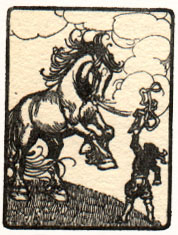 magic
bridle hung in its usual place
behind the door.
magic
bridle hung in its usual place
behind the door.
"You wretch," cried the Giant, as he went back. "My Finette must have helped you again!"
"'Mifinet'—what's that?" inquired Yvon with the air of stupidity that he had worn the day before.
"You wil1 know soon enough," growled his master, going off to bed. As Yvon slept on his own hard couch, he dreamt of the day when his fortune would be made, and he could make Finette his wife. It was still quite early when the Giant aroused him by calling his name.
"Go to my mountain cavern," he commanded, "and bring me a sack of my buried treasure."
"Very well, good master," Yvon replied, without betraying the slightest astonishment; and he pretended to sweep the stable until the Giant had gone off for the day. He then hastened to Finette, who was waiting for him just inside the door, anxious to know what task the Giant had set him now.
"Where is his mountain cavern, and how can I reach it?" Yvon inquired. "Can you help me again? I confess I am at a loss as to how to find it."
"You must take this wand," said Finette, handing him the little switch of hazel she had been hiding behind her apron, "and strike it three times against that huge black rock you see half up the mountain. A hideous goblin will at once appear, and ask you roughly what you want. 'My master's treasure,' you will reply. 'How much?' he will ask you next. 'Not more than I can carry,' will be your answer.
"He will then lead you into a deep grotto with walls of gold, where there are lustrous gems strewn all around. Fill your sack with these, and be careful not to speak. When you have taken as much as you can carry away comfortably, pass out in silence, and hasten back to me."
"I will do exactly as you tell me, dear Finette," Yvon assured her. They talked together until the sun told them it was midday; then he bade her a tender farewell, and set off again for the mountains.
When he came to the black rock, everything happened as he had been told, and he followed the goblin into a cavern stacked with the most brilliant rubies and pearls, and emeralds, that he had ever seen. Stifling his exclamation of wonder, Yvon filled his sack as calmly as if they were only dried peas, and followed his strange guide back to the open air. It did not please him to be impolite, but remembering Finette's warning, he refrained from bidding his goblin guide farewell.
He had acarcely reached the Giant's house when his master reappeared.
"Have you carried out my command?" he asked in tones that would have made a man less brave than Yvon tremble.
For answer the youth opened the sack, and displayed the shining treasure that it contained. Instead of thanking him for his services, the Giant became convulsed with rage.
"This is the work of my Finette!" he roared, and for the third time Yvon feigned ignorance of his meaning, and anxiously inquired what "Mifinet" might be.
The Giant did not sleep that night, but paced his room as if in deep perplexity. In her cheerless chamber below poor little Finette heard the thud of his footsteps, and wondered what fresh harm he was planning against her lover. When morning came, he rode away without setting Yvon another task, and this she felt was a bad sign.
"Go and sit on the bench," she entreated, as Yvon hastened to her when the Giant had gone. So he sat in the sunshine and whistled merrily until the Giant returned. Directing upon him a look of the direst hatred, the ferocious monster told Finette to fetch a knife.
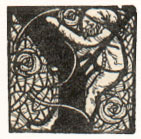 OU must kill that youth," he said, "for I want some soup.
He is good for this, if for
nothing else. I will take a nap
while you prepare it. See that you flavour him properly, and put in plenty of salt."
OU must kill that youth," he said, "for I want some soup.
He is good for this, if for
nothing else. I will take a nap
while you prepare it. See that you flavour him properly, and put in plenty of salt."
Very soon his deep breathing told Finette he was asleep, and she flew back to Yvon with a knife in her hand.
"You are not going to kill me, sweetheart, surely?" he said, as he glanced at its gleaming blade.
Finette's laugh was her only answer, and putting her golden head very close to his dark one, she whispered in his ear.
 OLD out your hand," she said.
OLD out your hand," she said.
Yvon did so smilingly, and with a deft stroke of the sharp knife she cut his finger, so slightly, however, that only three drops of blood fell on the stone-paved yard.
"Now come with me," she cried, and led him into the house.
Filling one of the big iron cauldrons half full of water, she placed this over the fire which she and Yvon had lit between them, and flying back to the garden, threw a heap of onions and other vegetables into a deep bag. Returning with these, she poured them into the cauldron, adding a measure of pepper and two of salt. She then entreated Yvon to throw in also his cap, his jacket, and his leather gaiters.
When this had been done, she left the cauldron and its contents, and entered the third chamber that led from the hall. From the golden soup in the iron pot there, she made three gold bullets, and slipped these into her pocket. In the second chamber she made two silver bullets from the silver soup, and in the first a large bullet of copper.
"Now let us escape," she cried, "before the Giant awakes." And hand in hand they flew down the road as fast as their feet could carry them.
Presently the Giant awoke.
"Finette," he cried; "is that soup ready?"
"Not yet, dear master," replied the first drop of blood, and the Giant turned over and went to sleep again. When next he woke and called "Finette," the second drop of blood answered his question about the soup in the same manner, and when he demanded it for the third time, the third drop cried "Not yet."
A little while later he woke again, and this time there was no response, so grumbling and threatening, he slouched to the kitchen, where the cauldron was bubbling merrily. A savoury smell greeted him as he entered, but his suspicions were aroused by Finette's absence. He seized a huge fork, and stirred the soup vigorously, fishing out Yvon's boots and coat, and even his cap. These did not deceive him, however, as Finette had vainly imagined they would; with a howl of rage, he quickly drew on his seven-league boots, and started in pursuit of the fugitives.
 O swiftly did he travel in their
wake that before long Yvon and
Finette heard his panting breath.
With much presence of mind, the maiden threw the copper bullet
behind her, exclaiming, "Save us,
bullet!" The ground immediately opened, and a huge chasm now separated them from their pursuer. The enraged Giant tore up a great tree as if it had been a sapling, and throwing it over
the chasm thus made a bridge, by means of which he crossed the gap, and again overtook Finette and Yvon just as they reached the coast.
O swiftly did he travel in their
wake that before long Yvon and
Finette heard his panting breath.
With much presence of mind, the maiden threw the copper bullet
behind her, exclaiming, "Save us,
bullet!" The ground immediately opened, and a huge chasm now separated them from their pursuer. The enraged Giant tore up a great tree as if it had been a sapling, and throwing it over
the chasm thus made a bridge, by means of which he crossed the gap, and again overtook Finette and Yvon just as they reached the coast.
Finette now threw a silver bullet into the sea, and at this a ship immediately appeared, in which she and Yvon took instant refuge. As it bore them onward over the swelling waves, the great Giant waded after them. He had all but reached the ship when Finette threw her second silver bullet into the sea. Suddenly a monstrous fish appeared from the depths below, and rushed through the water with open mouth. The Giant, like most bullies, was a coward at heart, and, shaking with fear, he retreated to land as quickly as he could.
"We are safe now, dearest!" cried Yvon joyfully, when they saw his huge black form scuffling away in the distance; but Finette trembled still.
"I am not so sure," she told him doubtfully. "The Giant has a dreadful aunt on the other shore, who will be just as eager to harm us when she hears we have escaped. We shall not be safe until we reach your father's castle."
The rest of their voyage passed uneventfully, and it seemed as if the young couple had come to an end of their troubles. Finette had grown more beautiful every day, but when they had almost arrived at Yvon's home, the young man looked at her critically for the first time.
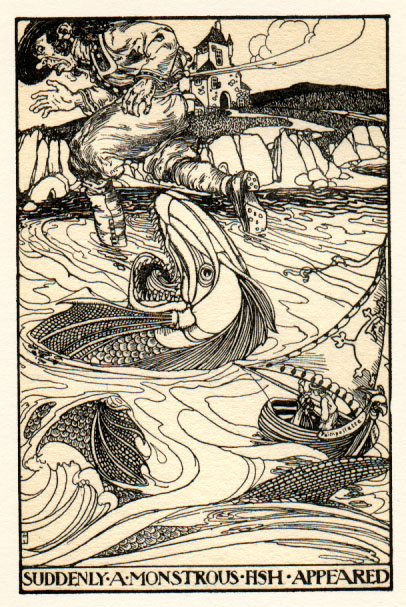
 OU are indeed most lovely," he told her ardently, "and as sweet and charming as man could wish. But it would never do for you to enter my father's castle on foot, and in such plain and homely
attire. I will leave you here while I fetch you a rich robe befitting the station you are to occupy, and the finest carriage in our stables shall bear you to my home."
OU are indeed most lovely," he told her ardently, "and as sweet and charming as man could wish. But it would never do for you to enter my father's castle on foot, and in such plain and homely
attire. I will leave you here while I fetch you a rich robe befitting the station you are to occupy, and the finest carriage in our stables shall bear you to my home."
Finette demurred at this, with many tears. She feared to be left alone, she said, and entreated her lover to take her with him. But although she looked more beautiful than ever, Yvon refused.
"It is your turn now to trust me, even as I trusted you," he said. "You must believe my word when I tell you that I will soon return."
"Before you go, then," begged poor Finette, "promise me that you will neither eat nor drink until we are once more together."
Yvon promised this with fond caresses, and Finette was forced to let him go.
The sound of music greeted him as he entered the castle by a secret passage, not liking to be seen in his present plight by the gaily dressed throng that filled the courtyard. The marriage of his eldest sister was then being celebrated, and though Yvon loved his sister dearly, and would have liked nothing better than to take part in the ceremony, he would not delay a moment, even to wish her joy. He made a confidante of the old woman who had nursed him in his childhood, and soon obtained from her an exquisite satin robe, embroidered with pearls and diamonds, that belonged to one of her fair charges, and with this in his knapsack, he made his way to the castle gates. As he was passing through them a golden-haired lady offered him a cup of rich red wine.
"You will not refuse to drink my health?" she cried, as he put it aside; and rather than appear ungallant, he raised it to his lips and drank.
Alas! it was magic wine—the wine of forgetfulness; and as he drained the jewelled cup all thoughts of Finette passed out of his mind. The golden-haired lady was the Giant's aunt, and this was just what she had schemed. Looking dazed and miserable, he raised his hand to his aching head; but she led him back into the castle and soothed him with gentle speech. When she saw him among the guests the old nurse thought he had been but joking when he asked her for the dress, which was tossed aside and soon forgotten.
For the first few hours after her lover's departure Finette awaited his return in the happy confidence inspired by his parting words.
"He will surely come soon," she said, as the shadows lengthened; but when the primrose lights faded into a deep violet, and the light of the evening stars shone clear in a sombre sky, her fears came back to her.
"He has forgotten me," she sighed, and sorely perplexed as to what would now be her fate, she wandered on until she came to a little hut, where a peasant woman sat before the door milking a sleek grey cow.
"Will you give me a drink, good dame?" asked Finette faintly, for she was sick with hunger and disappointment.
"Willingly," replied the woman, "if you will give me a cup of gold!"
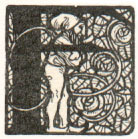 INETTE felt in her pockets for
one of the golden bullets, and
dropped this into the vessel the
woman laughingly held out to
her. Immediately it filled itself
with bright gold coins, which
jingled together musically as she poured them into the woman's lap.
INETTE felt in her pockets for
one of the golden bullets, and
dropped this into the vessel the
woman laughingly held out to
her. Immediately it filled itself
with bright gold coins, which
jingled together musically as she poured them into the woman's lap.
"I am rich! I am rich!" cried the dame in ecstasy. "I will leave you my hut and all that it contains, for I am off to the city, where I shall be a fine lady and live like a queen for the rest of my days." Without waiting even to stall her cow, she ran through the gate of the tiny garden, and was lost to sight in the dusk.
The hut was dirty, and meanly furnished, and the only food in the cupboard was a dry piece of cheese and a loaf of black bread. Finette was almost too weary to care what became of her, but she had just sufficient energy to take another golden bullet from her pocket and to murmur, "Help me, bullet!" as she threw it down. The mean little hovel instantly became a fair and spacious mansion, with staircase and furniture of purest gold, and beds and curtains of softest silk. Throwing herself down upon the first couch she came to, Finette soon fell asleep.
Meanwhile, the delighted peasant woman met the Mayor of the town, and proudly displayed her newly acquired wealth, explaining how she had come by it. The Mayor advised her to keep this to herself in future, since otherwise folk might doubt her word. He said this, however, not from consideration for her interests, but because he had instantly resolved to ask this wonderful girl to wed him, before any one else should learn of her fairy powers.
Next morning he dressed himself in his best, and rode to the beautiful mansion where the mean little hovel had once stood. Finette received him without emotion, and listened quietly as he asked her to be his wife.
"How do I know," she said, "that you would make me a good husband? Let me see the way in which you would set light to a fire."
With this object in view he took up the tongs, thinking unkindly that once she was his wife, he would soon teach her who was master.
"Hold him, tongs," cried Finette quickly, "and do not let him go until after sunset." As she uttered these words she left the house, and the iron tongs began to dance, still holding the indignant Mayor in an iron grasp. He was thus obliged to dance also, and as the tongs did not stop until nightfall, he was so exhausted when they set him free that he could only creep home and go to bed.
Of course the peasant woman had failed to keep her counsel, and by this time every one in the town knew the secret of her riches. A penniless young
officer, who had already
run through a large fortune
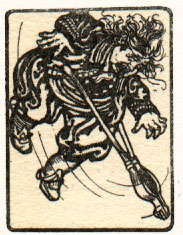 thought that to obtain the
hand of this strange young
girl in marriage would be
an excellent way in which
to replenish his empty coffers. So he too dressed himself in his best, and
donning his handsomest uniform proceeded to call
on Finette, who had now
returned to her fairy house.
thought that to obtain the
hand of this strange young
girl in marriage would be
an excellent way in which
to replenish his empty coffers. So he too dressed himself in his best, and
donning his handsomest uniform proceeded to call
on Finette, who had now
returned to her fairy house.
The maiden listened to his proposal as gravely as she had done to that of the Mayor, and hesitated for some moments before attempting to reply. This so enraged the impatient soldier, that he forgot himself as an officer and a gentleman, and actually threatened her with his sword. Finette fled in dismay, for even in her service with the Giant she had not received such rough treatment. Brushing by the sleek grey cow, she took refuge in the stable, and the officer, hastening after her, caught hold of the animal's tail to push it out of the way. Seeing this, Finette exclaimed: "Hold him, tail, until the sun sets!" Deeply angered at the liberty that the officer had taken with her, the cow galloped off at the top of her speed. She raced over hill and dale, over rocky pathways and beds of bramble, so that by the time that dusk had arrived, and her tail let him go, the rude young man was almost dead with fatigue.
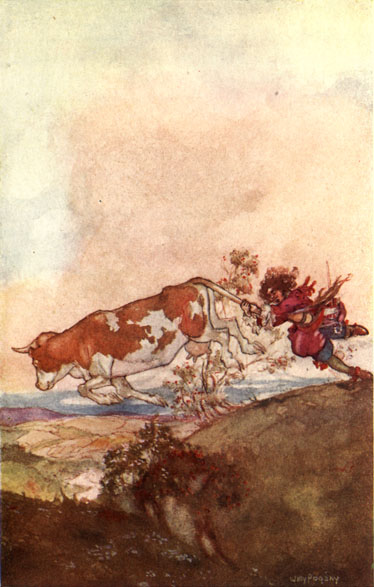
"SHE RACED OVER HILL AND DALE"
The knowledge of the discomfiture of her greedy suitors did not comfort Finette. She guessed by now that Yvon had forgotten her, and could she have seen what was going on at the castle, she would have known that her worst fears were realised. Oblivious as he was of all that had happened on the Giant's island, and unconscious of his dear Finette's very existence, he had fallen a victim to the charms of the golden-haired lady, little dreaming that her lovely form was but a disguise she had assumed to snare him.
In a very short time he had pledged his faith to her, and a second marriage was announced to take place in the Baron's family. The wedding-garments of the bride were a sight to behold, and the sprightliest horses in the castle stables were harnessed to the gilded coach that was to bear her to church with Yvon.
 S they rode on, a strange sadness overcame him. He could not tell why, but his brain was troubled
by waking dreams, and he was
haunted by the recollection of
a pair of violet eyes that were
very unlike those of his bride elect. When they
neared Finette's house the horses pranced and curveted until one of the traces broke, and this took some time to mend. A few paces farther, this happened again, and so on continually, until it seemed as if the harness would drop to pieces. At this juncture the Mayor came forward.
S they rode on, a strange sadness overcame him. He could not tell why, but his brain was troubled
by waking dreams, and he was
haunted by the recollection of
a pair of violet eyes that were
very unlike those of his bride elect. When they
neared Finette's house the horses pranced and curveted until one of the traces broke, and this took some time to mend. A few paces farther, this happened again, and so on continually, until it seemed as if the harness would drop to pieces. At this juncture the Mayor came forward.
"In that house yonder," he said, bowing respectfully to the bride, "there lives a lady who owns a pair of tongs that would hold together anything in this mortal world! If you send a message by one of your servants, she will doubtless lend them willingly."
A messenger was soon despatched to Finette's house, and returned shortly, bearing the tongs in question.
But now a new difficulty presented itself. No sooner had the harness been successfully patched up, than the carriage itself obstinately refused to stir. The splendid horses pulled with might and main, but it remained stationary, and as time was getting short, the bride became very angry. Yvon was marvelling at the change this made in her appearance when the handsome officer approached the carriage.
"If you will pardon the suggestion," he said, "I would advise you to apply for the loan of her cow to the lady who lent you the tongs. If the tail of that creature were switched on to the coach, your difficulties would be over. It could make anything go!"
The unknown lady proved to be as obliging as before, and soon the cow was pulling the carriage along at a furious pace. It arrived at the church in a few moments, but instead of stopping at the door, and allowing the wedding-party to alight, it continued to race round and round the sacred building as if it were urged by evil spirits, and then turned back to the Baron's castle, before the entrance of which it came to a dead stop. It was then much too late to think of returning to the church that day, and the Baron, wishing to lighten his guests' disappointment, decreed that the banquet should proceed as if the wedding had taken place. Before they sat down, however, he determined to invite the unknown lady who had so kindly lent Yvon her tongs and her cow.
 T is the least that we can do,"
agreed his son, and a messenger was despatched with a formal
missive sealed with the Baron's
grandest seal. In a short time
he returned, but without the lady.
T is the least that we can do,"
agreed his son, and a messenger was despatched with a formal
missive sealed with the Baron's
grandest seal. In a short time
he returned, but without the lady.
"What did she say?" inquired the Baron, anxious that his guests should be kept waiting no longer.
"She said, sire," returned the man, "that if the Baron desired her company, he must come and fetch her himself."
"She is right!" exclaimed the Baron. "It was most remiss of me not to have thought of this before."
So saying, he bade his guests amuse themselves with dancing until his return, and drove forthwith to Finette's house. Having thanked her with all the grace that he could muster for her services to his son, he handed her into the gilt coach, and she was thus escorted to the castle as if she had been some royal princess. Not only this, but when she arrived at the banqueting-hall, she was given the post of honour beside her host. A thrill ran through the company as they remarked her beauty, and the splendour of her attire; for her dress was of violet velvet, the same deep hue as her eyes, and so encrusted with gems that it flashed with her every movement. She was the centre of attraction to all but Yvon, who had eyes for no one save the golden-haired lady by his side.
Finette watched him with a heart full of anguish, feeling in the bosom of her rich gown for the single golden bullet that remained to her. As she pressed it between her slender fingers she gazed steadily at Yvon; he was whispering now to his lady-love, and Finette could have cried aloud in her pain. "Help me, bullet!" she murmured, and the golden ball became a golden cup, filled to the brim with wine the colour of rubies.
"Will you not drink my health, sir?" she cried to Yvon, who assented with a start. She passed him over the golden cup, and her face was white as a snowdrop. In spite of the detaining hand that the golden-haired lady laid on his arm, he quaffed it to its dregs. The next moment he started to his feet and stared round him in wild amazement.
"Where am I?" he asked, "and how do I come here? Ah, my sweet Finette, so I have found you again!" And hastening round to her side, he embraced her fondly. Once more he remembered everything that had happened since he left his father's house to seek his fortune, and it was well for the golden-haired lady that she made her escape before he had time to reckon with her.
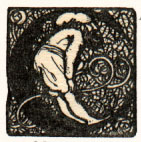 AN you ever forgive me, sweet?" he asked Finette, when he had
received his parents' congratulations, and his brothers were envying him so lovely a bride. Finette smiled happily; she knew that but for the Giant's spells she would not have been forgotten, and her great joy made her lovelier than ever.
AN you ever forgive me, sweet?" he asked Finette, when he had
received his parents' congratulations, and his brothers were envying him so lovely a bride. Finette smiled happily; she knew that but for the Giant's spells she would not have been forgotten, and her great joy made her lovelier than ever.
Yvon and she were married the following day, and this time, we may be sure, there was no hitch in the proceedings.
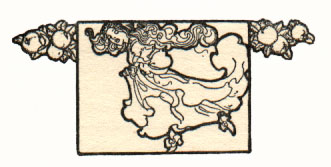
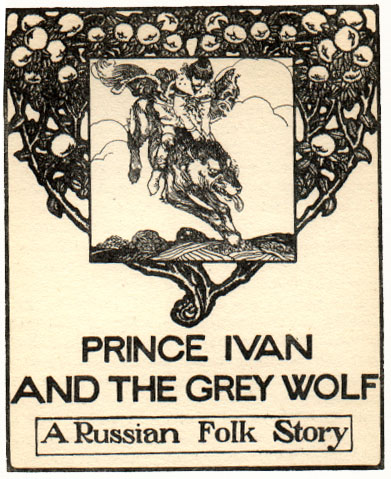
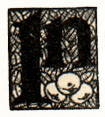 A FAR-OFF land surrounded by snow-capped mountains, and watered by rivers that flowed swiftly down to the sea, dwelt a mighty Tsar. His people loved as well as feared him, for the glance of his eagle eye was very kind, and he was ever ready to listen to their pleas
for help or justice. When he rode abroad on the great white horse that was shod with gold, they flocked to bless him, and throughout the whole of his wide dominion there was not one discontented man, woman, or child. He had no foes to trouble him, since rival monarchs knew full well that their troops would be dispersed like mist in sunlight before the charge of his victorious army, and his three sons, Dimitri, Vasili, and Ivan, were all that a father could desire. Yet the good Tsar's brow was clouded as he walked in his garden, and from time to time he uttered a deep sigh.
A FAR-OFF land surrounded by snow-capped mountains, and watered by rivers that flowed swiftly down to the sea, dwelt a mighty Tsar. His people loved as well as feared him, for the glance of his eagle eye was very kind, and he was ever ready to listen to their pleas
for help or justice. When he rode abroad on the great white horse that was shod with gold, they flocked to bless him, and throughout the whole of his wide dominion there was not one discontented man, woman, or child. He had no foes to trouble him, since rival monarchs knew full well that their troops would be dispersed like mist in sunlight before the charge of his victorious army, and his three sons, Dimitri, Vasili, and Ivan, were all that a father could desire. Yet the good Tsar's brow was clouded as he walked in his garden, and from time to time he uttered a deep sigh.
This garden was his greatest pride. In days gone by the forests had been rifled of their most splendid trees that they might spread their shade over the rare and lovely flowers that travellers brought him from every part of the globe. The perfume of his million rose-trees was carried on the wind for fifty miles beyond the palace, and so wonderful were their colours that the eyes of those who beheld them were dazzled by so much brilliance. There were the gorgeous orchids which, in order that the garden of their beloved Tsar might be the most beautiful in the world, men had risked their lives to obtain, and every imaginable kind of fruit hung in tempting clusters from the drooping boughs of the trees. To look at them was to make one's mouth water, and the sick folk in his kingdom shared with the Tsar the pleasures of taste and touch.
 HE tree that gave him most pleasure bore nothing but golden apples. When spring came round, and tender buds appeared upon the whispering branches, the Tsar caused a net of fine white seed
pearls to be spread around it, so that the sweet-voiced choristers who filled his groves with music should not come near them. They might feast at will on every other tree in his garden, he said, but the golden apples they must leave for him; and as if in gratitude for his many kindnesses, even when the net of pearls was taken away, and the apples gleamed like fairy gold amidst the emerald green of their shapely leaves, not one of the birds approached them. When cares of state pressed heavily upon him, the Tsar sought rest beneath the loaded branches, and forgot his troubles in watching the sunlight play on the golden balls.
HE tree that gave him most pleasure bore nothing but golden apples. When spring came round, and tender buds appeared upon the whispering branches, the Tsar caused a net of fine white seed
pearls to be spread around it, so that the sweet-voiced choristers who filled his groves with music should not come near them. They might feast at will on every other tree in his garden, he said, but the golden apples they must leave for him; and as if in gratitude for his many kindnesses, even when the net of pearls was taken away, and the apples gleamed like fairy gold amidst the emerald green of their shapely leaves, not one of the birds approached them. When cares of state pressed heavily upon him, the Tsar sought rest beneath the loaded branches, and forgot his troubles in watching the sunlight play on the golden balls.
Now all was changed, and the Tsar's deep sigh betokened feelings of deep annoyance. Morning after morning he found the apple-tree stripped of its golden treasures, and its emerald leaves strewn on the ground.
This was the work of the Magic Bird, who once upon a time had lived in the great cloud castles that gather in the West, but was now the slave of a distant King. The feathers of the Magic Bird were as radiant as the sun-god's plumes, and her eyes as clear as crystal. When she had wrought her will on the apple-trees, she would fly blithely home to the garden of her own master, and, try as they would, not one of the Tsar's head gardeners could even catch sight of her.
The good Tsar meditated much upon the matter, and one windy morning in autumn he called his three sons to him.
"My children," he said, "the source of my grief is known to you, and now I entreat your help. Will you each in turn forego your sleep, that you may watch in my garden for the Magic Bird? To him who shall capture her, I will give the half of my kingdom, and when I am called thence he shall reign in my stead."
"Willingly, O my father," answered each of his three sons; and Prince Dimitri, as the eldest, claimed the right to the first watch.
The garden was flooded with moonlight as the Prince threw himself down on a moss-grown bank that faced the tree, and the fragrance of the roses soon worked its drowsy spell. From a grove of myrtles came the song of a sweet-voiced nightingale; "Glück-glück-glück" she trilled, and in listening to her the Prince fell fast asleep. When he awoke it was light again. The tree had been once more despoiled, and the Magic Bird had flown.
 HE same thing occurred when Prince Vasili took his turn in watching. It is only fair to him to say that he did not fall asleep
until the night was far spent,
but as the East began to quiver
with light, he too became overpowered with slumber. The Magic Bird was watching her opportunity, and yet again she robbed the tree. When questioned by the Tsar, both Princes solemnly assured him that no strange bird had visited the garden during the night, but though he fain would have believed them, he could not doubt the evidence of his eyes.
HE same thing occurred when Prince Vasili took his turn in watching. It is only fair to him to say that he did not fall asleep
until the night was far spent,
but as the East began to quiver
with light, he too became overpowered with slumber. The Magic Bird was watching her opportunity, and yet again she robbed the tree. When questioned by the Tsar, both Princes solemnly assured him that no strange bird had visited the garden during the night, but though he fain would have believed them, he could not doubt the evidence of his eyes.
It was now Prince Ivan's turn to watch. He was not nearly so good-looking as his brothers, but he had a stout heart and a cool head, and he made up his mind to keep awake at any cost. Instead of reclining on the ground, he perched himself in the boughs of the tree, and when the song of the nightingale threatened to lull him to sleep, as it had done the elder Princes, he put his fingers into his ears that he might not hear it.
An hour passed slowly; a second, and then a third. Suddenly the whole garden was lit up as if with a burst of sunshine, and with rays of light flashing from every shaft of her golden feathers the Magic Bird flew down and began to peck at the shining apples. Prince Ivan, scarcely daring to breathe, stretched out his hand and caught as much of her tail as he could grasp. With a startled cry the Magic Bird spread her beautiful wings and wrenched herself free, leaving behind one glittering feather, which the Prince held firmly. At break of day he took this to his father, humbly apologising for his ill-success in not having caught the Magic Bird herself.
"Nevertheless, you have done well, my son," said the Tsar gratefully, and he placed the feather, which shone so brightly that at dusk it illuminated the whole room, in a cabinet of cedar and mother-of-pearl.
The Magic Bird came no more to the palace garden, and the precious tree was never again despoiled of its golden apples. But the Tsar was not content. He sighed to possess the bird that had robbed him, and once more he summoned his three sons.
"My children," he said, "I am sick with longing for the Magic Bird. Seek her, I pray you, and bring her to me. What I have promised already shall then be yours."
The Princes assented gladly, each anxious to find the Magic Bird. Prince Ivan alone wished to please his father; his brothers were only thinking of the riches and honours they would gain for themselves. So dear was this youngest son to the monarch's heart that he was loath to part with him when the time came, but the youth insisted.
"It will not be for long, dear Father," he cried. "I shall soon return with the Magic Bird you sigh
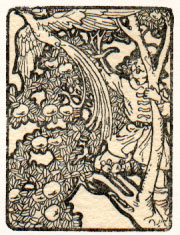 for." So the Tsar blessed
him, and let him go.
for." So the Tsar blessed
him, and let him go.
Prince Ivan took the fleetest horse in the Imperial stables, and rode on and on for many days. At last he came to a bare field set in the midst of fair green meadows, and in the centre of this stood a block of rough grey stone. Inscribed upon the stone in crimson letters was a strange verse:
Hungry and cold shall that man be
Who rides in pride straight up to me;
To ride from the left means death and sorrow,
Though his horse shall live for many a morrow.
He who rides from the right shall have good things all,
But ere three days pass his horse shall fall!
Prince Ivan was greatly troubled at the thought of losing his horse, but to ride from the right seemed the wisest course for him to pursue. Accordingly he did so, and so swift was his horse's flight that he had soon left the grey stone far behind. On the third day, as he was passing the borders of a gloomy forest, a big Grey Wolf sprang out from a thicket, and, flying at his horse's throat, threw him on the ground and killed him in spite of Ivan's gallant attempt to beat him off. Ivan would now have run the Grey Wolf through with the jewelled dagger his father had given him as a parting present, but before he could rise from the spot where he had been thrown, the creature spoke.
"Spare me, wise Prince," he entreated humbly. "I have but done as I was commanded. My death will not give you back your horse, while if you spare my life I will be your friend for ever, and will carry you over the world."
Prince Ivan saw that he would gain nothing by being revengeful, and, mindful of his quest, accepted the Wolf's offer to be his steed.
"Tell me where you wish to go, dear master!" said the Grey Wolf, "and it shall be as you will." And, true enough, when he heard the object of Prince Ivan's journey, he galloped even more swiftly than the horse had done, till towards nightfall he came to a standstill behind a thick stone wall.
"On the other side of this wall," he said, "is a terraced garden, and there, in a golden cage, is the Magic Bird. The garden is empty now, so no one will stay you if you capture her; but if you touch her cage there will be trouble."
Dismounting from the Grey Wolf's back, Prince Ivan climbed the wall without much difficulty, and quickly seized the Magic Bird. She fluttered so wildly, however, as he tried to hold her, though without uttering a sound, that he quite forgot the Grey Wolf's warning, and hastened back for the cage. As he touched it, the stillness of the garden was broken by the pealing of bells and the clanking of armour, for the cage was connected with the palace courtyard by invisible wires. Before he could escape, Prince Ivan was surrounded by excited soldiers, who quickly carried him before the King.
"Are you not ashamed?" the monarch thundered, noting the young man's rich attire, "to be caught in my garden like a common thief? Where do you come from, and what is your name?"
"I am the son of a great Tsar," the young Prince answered, "and they call me Ivan. My father has a very beautiful garden, in which grows a tree of golden apples that is the pride of his heart. Night after night your Magic Bird rifled this precious fruit, until I all but succeeded in capturing her. She was too quick for me, however, and flew away, leaving one feather in my hand. This feather I took to my father, who admired it greatly, and ever since has longed to possess the Magic Bird."
Tsar Dolmat looked less angry, though he still frowned.
"If you had come to me," he said," and told me what you wanted, I would have made your father a present of the Magic Bird. As it is, I feel inclined to let all nations know how dishonourably you have acted."
Prince Ivan bowed his head in shame, and after a searching glance at him the Tsar continued his speech.
"You shall go forth free, young Prince," he said, "if you will do me a service. In the realm of Tsar Afron, beyond the thrice-ninth kingdom, there is a gold-maned horse which belongs to him, and this I greatly covet. If you will procure it, and bring it here to me, I will forgive your theft of the Magic Bird, and present her to you as a mark of honour."
Prince Ivan promised to do his best, but he did not feel very hopeful as he rejoined the Grey Wolf, who was patiently waiting for him outside the wall. When Ivan had confessed the reason that led to his capture the Grey Wolf patted his shoulder with one rough paw.
 T takes a wise man," he remarked,
"to own himself in the wrong,
so we will say no more about it.
Jump on my back again, and I
will take you to the far-famed
realm of Tsar Afron, beyond the
thrice-ninth kingdom."
T takes a wise man," he remarked,
"to own himself in the wrong,
so we will say no more about it.
Jump on my back again, and I
will take you to the far-famed
realm of Tsar Afron, beyond the
thrice-ninth kingdom."
The Grey Wolf ran so swiftly that Ivan could scarcely see the country through which they passed, and after travelling for many nights and days, they reached, at last, their journey's end. The marble stables of the Tsar shone fair and stately in the morning light, and, through a door which a careless groom had left half open, Prince Ivan made his way. The horse with the golden mane was feeding on the yellow pollen collected by the bees from the tall white lilies that edged the rose garden, and stared at Prince Ivan haughtily as he approached. Firmly grasping his golden mane, Prince Ivan led him out of the stall. The Grey Wolf had cautioned him more than once not to attempt to bring the golden bridle that hung above the door, but as he was leaving the stable the Prince suddenly thought how useful this would be, and, turning back, stretched out his hand and touched it. Immediately he did so, bells pealed all over the palace, for, like the cage of the Magic Bird, the bridle was fastened to invisible wires.
The stable guards came hurrying in, full of alarm, and when they saw Prince Ivan they seized him angrily, and took him before their master. Tsar Afron was even more indignant than Tsar Dolmat had been at the Prince's attempt to rob him. When he questioned him as to his birth and station his face became sterner still.
"Is this the deed of a gallant knight?" he asked with withering scorn "I have a great regard for your father's name, and if you had come to me openly and in good faith, I would gladly have given you my gold-maned horse. But now all nations shall know of your dishonour, for such acts as yours must not go unpunished."
This was more than Prince Ivan could bear, and with eager haste he protested his willingness to atone for his fault.
"Very well, then," said Tsar Afron, "I will take you at your word. Go forth and bring me Queen Helen the Beautiful, whom I have long loved with all my heart and soul. I have seen a picture of her in my Seer's white crystal, and she is more fair to look upon than any other maid. I cannot reach her, try as I may, since her kingdom is guarded by elves and goblins. If you can capture her for me and bring her here, in return I will give you anything you ask."
Prince Ivan hurried away to the Grey Wolf, fearing that since he had disregarded his advice for a second time, he might refuse to help him in this new enterprise. Once more he humbly confessed that he had been at fault, and once more the Grey Wolf consoled him.
"One must buy wit," he growled. "Well, jump on my back, and I will see what I can do for you."
Then he ran so swiftly that it seemed as though his feet were winged, and the elves and goblins that guarded the kingdom of Helen the Beautiful scattered before him in all directions, thinking him to be a spectre. When he came to the golden streamlet that bordered the Queen's magic garden, he told Prince Ivan that he must now dismount.
"Go back by the road we came," he commanded, "and wait for me in the shade of that spreading oak-tree we passed just now."
Prince Ivan did as he was told, and the Grey Wolf crouched under a bush of juniper, and waited until evening fell. As the light faded out of the sunset sky and the pale little moon rose slowly over the mountain-tops, Queen Helen walked in her garden. She was so fair and sweet to look upon that even the heart of the Grey Wolf was moved to admiration, and he wished her a worthier mate than the stern Tsar Afron, who knew not how to be gentle even in his love. After a while she approached the streamlet,
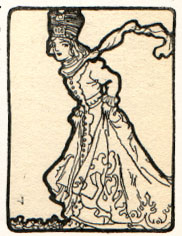 winding round her dainty throat a cloud of milk-white
gossamer, that she might not feel the touch of the
evening breeze.
winding round her dainty throat a cloud of milk-white
gossamer, that she might not feel the touch of the
evening breeze.
"Do not fear, sweet lady! I will not harm you!" the Grey Wolf cried, as he sprang from his hiding-place and crossed the stream. Holding her tenderly by her flowing draperies, he leapt back to the other side, and galloped with her to the Prince, who waited under the spreading oak.
When Queen and Prince beheld each other, it was as if a veil had fallen from their eyes. Never had the world appeared so beautiful, and as they gazed at each other in the soft twilight, the Queen's fears fled. As for Prince Ivan, he knew from that moment that she was intended for his wife, and when they rode away together on the Grey Wolf's back, he already felt she belonged to him.
The journey was all too short, and soon Tsar Afron's palace loomed before them.
"Why are you weeping?" the Grey Wolf inquired, as their tears splashed on his head. Queen Helen could make no answer, but Prince Ivan's words poured forth like a raging flood.
 OW can we help it, Grey Wolf," he cried, "since we love each
other, and I must resign my
beautiful Queen to the stern Tsar
Afron, or else be branded before
all nations as a robber and a
thief?"
OW can we help it, Grey Wolf," he cried, "since we love each
other, and I must resign my
beautiful Queen to the stern Tsar
Afron, or else be branded before
all nations as a robber and a
thief?"
"I have kept my promise, Prince Ivan," said the Grey Wolf, "and served you well, but I will do more for you still. By means of magic known to myself alone, I, the Grey Wolf, will take the form of beautiful Queen Helen. You shall leave the real Queen here, in the shade of this grove of pine-trees, and when you have taken Tsar Afron his strange Wolf-bride, who will appear to him as a lovely woman with golden hair, he will give you the gold-maned horse. Bid him farewell as quickly as you can, and, taking your Queen behind you, ride swiftly towards the west. When I have given you time to journey far, I will ask Tsar Afron to let me walk with my maidens in the woods. Then, if you call me to your mind, I shall disappear from their midst even as they watch me, and join you and your Queen."
Prince Ivan once more did as the Grey Wolf said, and great was the delight of the Tsar Afron as he beheld the tall and gracious woman whom the Prince presented to him. She was even more beautiful than he had imagined from her picture, and he would have given not only his gold-maned horse, but his crown as well, to her captor had he desired it. Prince Ivan, however, asked nothing but the gold-maned horse, and was soon speeding across the plains with the real Queen Helen nestling against his side. He rode towards the west, where lay the kingdom of Tsar Dolmat.
Tsar Afron was more than content with his wolfish bride, who was not alarmed by his fierce caresses, and only smiled when he threatened to kill her if her love for him should waver for a single instant. On the fourth day after their marriage feast she complained of feeling stifled in the royal palace.
"If I might walk in the meadows," she said, "the breath of the cool fresh wind would refresh my spirit, and I could once more laugh with my lord."
So the Tsar allowed her to walk with her maidens. Just at this time the thought of the Grey Wolf flashed into Prince Ivan's head.
"I had forgotten him," he exclaimed remorsefully to his dear wife. "What is he doing, I wonder? I wish we had him here."
He had no sooner spoken than there came a clap of thunder from the distant hills, and the Grey Wolf suddenly appeared.
 OU must let the Queen ride the gold-maned horse alone," he told
the Prince, "and I will be your steed."
OU must let the Queen ride the gold-maned horse alone," he told
the Prince, "and I will be your steed."
Somewhat reluctantly, the Prince accepted his suggestion, and in this manner they rode to the verge of Tsar Dolmat's capital. The kindly looks of the Grey Wolf emboldened the Prince to ask him another favour.
"Since you can change yourself into a beautiful woman, and then back again into a Grey Wolf, could you not become for a time a gold-maned horse, so that I might give you to Tsar Dolmat, and keep the real one for my dear Queen?"
The Grey Wolf readily assented, and striking his right paw three times in succession on a patch of bare earth, became the exact image of the gold-maned horse who bore the fair Queen Helen. Leaving the real horse with his bride in a flower-strewn meadow outside the city, Prince Ivan rode on to the Tsar. He was greeted by that monarch with every sign of joy, for the mane of the Grey Wolfhorse shone in the sunshine like purest gold. The Tsar kissed Prince Ivan on either cheek and, leading him to his palace, gave him a royal feast. For three whole days they revelled in the choicest wines and the richest viands the kingdom could supply, and on the third, Tsar Dolmat rewarded the Prince with many thanks, and the gift of the Magic Bird in her golden cage.
Prince Ivan felt now that his quest was over, and quickly regaining Queen Helen's side, he fastened the cage of the Magic Bird round the neck of the gold-maned horse, and rode with her towards his father's kingdom. Early the next afternoon they were joined by the Grey Wolf; Tsar Dolmat had ridden his newly acquired treasure in an open field, and had been heavily thrown for his pains by the false horse, which had then galloped away.
As the Grey Wolf had been so good a friend to him, Prince Ivan could not refuse his request when he asked to be allowed to carry him, so once more the Queen alone sat on the gold-maned horse.
Thus they rode on until they came to the place where the Grey Wolf had slain the horse which Prince Ivan had brought from his father's stable. Here the strange creature came to a sudden stop.
"I have done all that I said, and more," he told the Prince. "Now I am your servant no longer. Farewell!" And he galloped back to the gloomy wood from which he had first come.
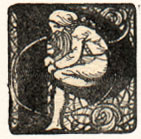 RINCE IVAN'S sorrow at parting with him was very real, but
in the pleasure afforded by the
Queen's company he soon forgot
his loss. When he came within sight of his father's realm, he stopped by the shade of a belt of fir-trees, and placing the cage of the Magic Bird and the golden bridle beneath their shade, he lifted down his beautiful Queen, and rested with her on a bank of fern. They were weary after their long journey, and soon, talking together softly as ringdoves coo in their nests, both fell asleep.
RINCE IVAN'S sorrow at parting with him was very real, but
in the pleasure afforded by the
Queen's company he soon forgot
his loss. When he came within sight of his father's realm, he stopped by the shade of a belt of fir-trees, and placing the cage of the Magic Bird and the golden bridle beneath their shade, he lifted down his beautiful Queen, and rested with her on a bank of fern. They were weary after their long journey, and soon, talking together softly as ringdoves coo in their nests, both fell asleep.
Now Prince Dimitri and Prince Vasili had fared badly on their travels, and were returning to the palace, empty-handed, and sadly out of temper, when they caught sight of the reclining forms of the two sleepers, with the gold-maned horse browsing close beside them. As they stared in amazement, an evil spirit of envy took possession of them, and there presently entered into their minds the thought of killing their brother. Each looked at the other, and then Prince Dimitri drew his sword, and ran it through Prince Ivan as he slept; he died without a murmur, and when the Queen awoke, she found him lifeless.
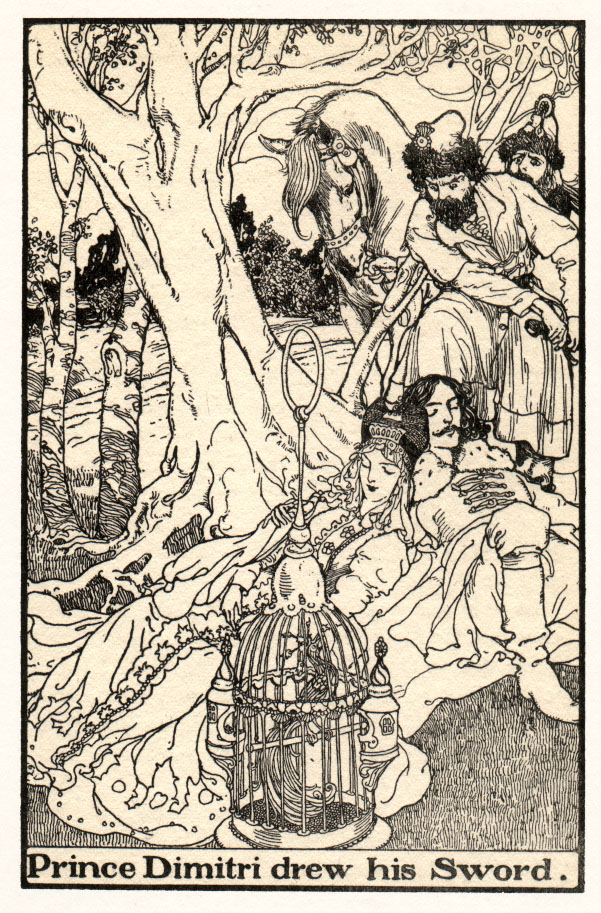
 HAT is this you have done?" she sobbed to the guilty Princes. "If you had met him in fair
fight, and slain him thus, he
might at least have struck a blow in self-defence. But you
are cowards and dastards, fit only
for ravens' food!"
HAT is this you have done?" she sobbed to the guilty Princes. "If you had met him in fair
fight, and slain him thus, he
might at least have struck a blow in self-defence. But you
are cowards and dastards, fit only
for ravens' food!"
In vain she wept and protested, as the Princes drew lots for their dead brother's possessions. The Queen fell to the keeping of Prince Vasili, and the gold-maned horse was adjudged to Prince Dimitri. In a passion of tears, the Queen hid her face in her golden hair, as her would-be lord spoke roughly to her.
"You are in our power, fair Helen," he said. "We shall tell our father that it was we who found you, the Magic Bird, and the gold-maned horse. If you deny our words, we will instantly put you to death, so look to it that you hold your tongue, and keep our counsel."
The poor Queen was so terrified by his cruel threat that speech forsook her, and when they arrived at the palace she was mute as some marble statue, and could not contradict the wicked statements which she heard them boldly utter.
Prince Ivan lay dead with his face to the sky, but the wood-elves guarded his body, so that neither beast nor bird came near to devour it until the end of thirty days. Then, as the sun was sinking, a raven seeking food for her young, hopped on his breast, and would have pecked at his eyes had not the Grey Wolf galloped up in the nick of time. He knew at once that the dead man must be Ivan, and pouncing upon one of the young birds, would have torn it asunder in his rage.
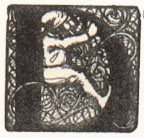 O not touch my little birdling,
fierce Grey Wolf!" entreated the
mother piteously. "It has done you no harm, and deserves no ill from you."
O not touch my little birdling,
fierce Grey Wolf!" entreated the
mother piteously. "It has done you no harm, and deserves no ill from you."
"Then listen," the Grey Wolf replied. "I will spare the life of your birdling, if you will fly away beyond the thrice-nine lands, and bring me back the Water of Death and the Water of Life from the crystal stream whence they flow to the great Forever."
"I will do what you wish," cried the raven, "only do not touch my little son." And as she spoke she sped away.
Three days and three nights had passed before she returned to the Grey Wolf, carrying two small vials. One held the Water of Life, the other the Water of Death, and as the Grey Wolf took them from her, he gave a cry of triumph. With a snap of his teeth, he bit the young raven in two, tearing it to pieces before its mother's frantic eyes. This done, he broke one of the vials, and when he had sprinkled three drops of the Water of Death on the slain birdling, immediately its torn body grew together again. Then he touched it with a few drops from the second vial, and the little thing spread its wings, and flew off rejoicing.
Thus the Grey Wolf knew that the raven had served him well, and he poured what was left of the Waters of Life and Death over the body of the dead Prince. In a few moments life came back to him, and, stumbling to his feet, he smiled at the Grey Wolf.
"Have I slept long?" he asked dreamily.
"You would have slept for ever had it not been for me," was the reply. And the Prince listened with grieved surprise as the Grey Wolf told him all that had happened.
"Your brother is going to marry your bride to-day," he ended by saying. "We must hasten to the palace with all possible speed. Mount on my back, and I will carry you once more."
So they galloped to the palace of the old Tsar, and the Grey Wolf bade Prince Ivan farewell for the last time as he dismounted at the great gates. The Prince hurried into the banquet-hall, and there, looking like some fair statue that had been moulded from frozen snow, sat beautiful Queen Helen by Prince Vasili's side. They had just returned from the wedding ceremony, and all the nobles were gathered round.
 HEN Queen Helen saw who had
entered the hall, her speech came
back to her, and she flew to her
lover with a cry of rapture and
kissed him on the lips.
"This is my own dear husband," she cried. "I belong to
him, and not to the wicked Prince I have married to-day." From the shelter of Ivan's breast she told the Tsar all that had happened, and how it was to his youngest son that he owed the gold-maned horse and the Magic Bird.
HEN Queen Helen saw who had
entered the hall, her speech came
back to her, and she flew to her
lover with a cry of rapture and
kissed him on the lips.
"This is my own dear husband," she cried. "I belong to
him, and not to the wicked Prince I have married to-day." From the shelter of Ivan's breast she told the Tsar all that had happened, and how it was to his youngest son that he owed the gold-maned horse and the Magic Bird.
The joy of the Tsar at his favourite son's return was tempered by his grief and amazement at the conduct of the elder Princes. They were cast into prison, where they languish still: but Prince Ivan and the beautiful Queen Helen are as happy as the days are long, and the Magic Bird was allowed to return to her home in the golden west.
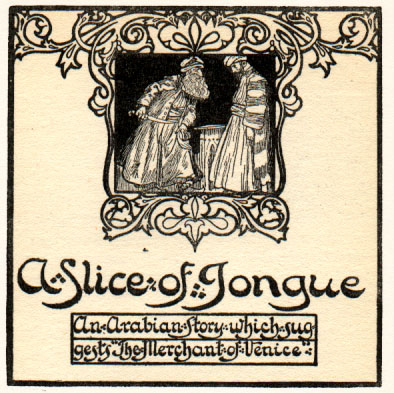
 MER was a lazy fellow. There could
be no doubt of this, since year after year he refused to bestir himself, and still lived on with his parents. His sunny temper and pleasant ways made them forget his many faults, and though his father often reproached him for not making a home for himself, as other young men were doing, he only laughed good-humouredly, and kissed his mother.
MER was a lazy fellow. There could
be no doubt of this, since year after year he refused to bestir himself, and still lived on with his parents. His sunny temper and pleasant ways made them forget his many faults, and though his father often reproached him for not making a home for himself, as other young men were doing, he only laughed good-humouredly, and kissed his mother.
"Why should I make a home for myself," he asked, "when I am far happier here than I could be elsewhere?" His mother smiled, well satisfied, for her handsome boy was the very apple of her eye.
The years went on, and the time came when the two old folk slept calmly side by side beneath the grass. Omer was left alone, and for the first time in his life he knew what it was to be really miserable. His honest grief became him so well that every one was sorry for him, and many a neighbour offered him bite and sup, and strove to comfort him with homely sayings.
It was late now for Omer to remember his father's advice, but still he did so. The first step to take, it seemed to him, was to get married, and accordingly, when the violence of his grief had somewhat worn off, he considered the various maidens in the village. There was Rosalie, who sang like a bird, and Greta, who danced divinely, and was so fair of face that the roses in her window blushed with envy. Neither Rosalie nor Greta, however, particularly attracted him, and his fancy fell on Fatima, who was somewhat shy, and of a beauty less pronounced than that of her rivals. But Fatima's eyes were the very colour of his dear mother's, and he fancied he saw in them the same sweet gleam of affection that had made his home a haven of joy.
Fatima, for her part, had long loved him in secret, but she wisely determined not to accept his suit until he could provide for her.
 T is time you began to work, dear Omer," she said, repeating his father's words, "I will gladly be your wife when you can bring me thirty purses of gold, but not
before. We cannot live on air,
and it would not be fitting that
your wife should work for you."
T is time you began to work, dear Omer," she said, repeating his father's words, "I will gladly be your wife when you can bring me thirty purses of gold, but not
before. We cannot live on air,
and it would not be fitting that
your wife should work for you."
Poor Omer shrugged his shoulders. What was he to do? His well-shaped hands had learnt no craft, and without capital it was impossible to start a business. In his perplexity he thought of a rich Jew who often made loans to worthy tradesmen who found themselves in difficulties, and accordingly he repaired to this good man.
Issachar eyed him shrewdly. "You say you will pay me," he remarked, "but when? I know you well, young Omer. You are your father's son, but he was industrious, and you are idle. How can I be certain that you intend to work?"
Omer assured him that once he was married to Fatima he would leave no stone unturned to win a fortune.
"Lend me those thirty purses of gold," he urged, "and you shall see."
The Jew had no love for him in his heart, since he himself had looked upon Fatima with envious eyes, but at last he agreed to advance the money.
"Before I do so," he said, "you must sign this." And he laid before him a document to the effect that if he, Omer, did not repay Issachar the thirty purses of gold within seven years, the Jew should cut off a slice of his tongue to the weight of a drachm.
Light-hearted Omer signed the bond without the least demur. With Fatima for his wife, he thought to himself joyfully, he could do anything, and long before the seven years were expired would be in a position to repay twice thirty purses of gold. He set about his arrangements for the wedding in the highest of spirits, and spent so much in Fatima's honour that before he knew what he was doing half the money the Jew had lent him had disappeared.
"Never mind," he thought to himself. "I shall soon make more." When the honeymoon was over, he opened a shop for such necessities as brooms, tobacco, salt, and cheese, since he knew that, whatever his neighbours could do without, they must have these.
Greatly to every one's surprise, for Omer's laziness was proverbial, the shop did well. Fatima loved her husband dearly, and though she found it impossible to keep him up to her own high standard of industry, she managed to induce him to give the shop at least a certain amount of attention, and when he slunk off to lie on his back in some green meadow and look at the sky and dream great dreams, she took his place, and proved so willing and accommodating a saleswoman that customers often chose the hour for shopping when they knew that Omer would be away. In the long knitted purse hidden under her mattress was a shining store of silver pieces, and but for Omer's extravagance, there would have been many more.
It was well for the little household that Fatima was so clever a manager. Towards the end of the seventh year bad times came to the village, and no one had any money to spend. With a sudden shock Omer realised that it would be impossible for him to pay back Issachar, and the thought plunged him into the deepest gloom. He could not sleep
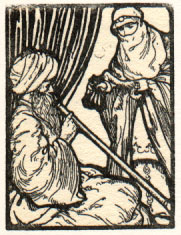 for thinking what it would
feel like to have a slice cut
off his tongue, and, hearing him sigh so frequently, Fatima insisted on his telling her what was wrong.
for thinking what it would
feel like to have a slice cut
off his tongue, and, hearing him sigh so frequently, Fatima insisted on his telling her what was wrong.
"If I had only known," she cried, "how you obtained those thirty purses of gold, I would never have allowed you to touch them."
This was all that she said by way of reproach, and Omer had never loved her more than he did in the dark days that followed, when both went silently about their work with down-bent heads and sombre eyes.
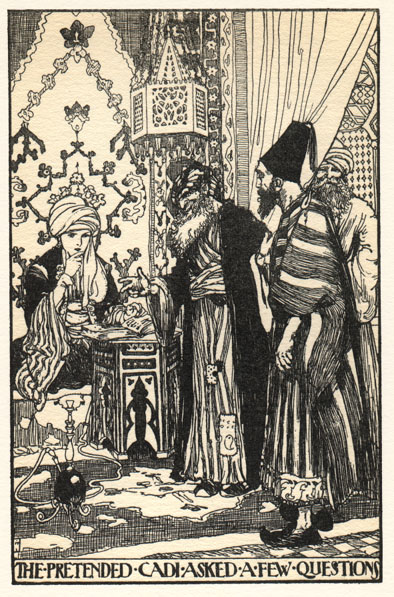
One evening at sunset Fatima thought of a plan. Dividing her poor little savings into three portions, she wrapped one of these in a silken square, and called at the Cadi's house. Making a deep obeisance she laid the money at his feet, and left without a word. This she did on the second and the third night also, and as she was leaving for the last time the Cadi stopped her.
"What would you have of me?" he asked her kindly.
"O Cadi," she responded, "grant me but this one boon. Let me just for an hour sit in your robes on the judgment seat on Friday, and I will bless you for the rest of my life."
The Cadi would have refused outright, but Fatima was still a handsome woman, and the beautiful eyes that were raised to his so pleadingly were soft as velvet.
"It shall be as you wish," he said at last, "but I shall stand behind the screen and listen to all you say. If during that hour your judgments are not just ones, I shall reverse them, and turn you out of the court as an impostor."
Fatima thanked him with all her heart, and the following Friday saw her adorned in the Cadi's robes, and sitting in his place.
 HE first case to be brought forward was that of Issachar and Omer. The shrunken face of the Jew was alight with malicious triumph. Now, at last, he would be avenged for the slight that the fair Fatima had put upon
him in days gone by. Grinning with delight, he listened to Omer's confession that he could not produce the gold, and hastened to demand that he should pay the penalty.
HE first case to be brought forward was that of Issachar and Omer. The shrunken face of the Jew was alight with malicious triumph. Now, at last, he would be avenged for the slight that the fair Fatima had put upon
him in days gone by. Grinning with delight, he listened to Omer's confession that he could not produce the gold, and hastened to demand that he should pay the penalty.
"You say well," said Fatima. "He cannot pay you, and you are therefore entitled to a slice of his tongue. Have you a razor, Issachar?"
The Jew produced one eagerly, and Omer's brow grew pale as death as he saw him feeling the sharp edge, and noted his fiendish glee. He bore himself bravely, nevertheless, and Fatima felt proud of her husband as he quietly advanced to await the Jew's pleasure.
"Be careful!" she cautioned Issachar, "that you do not draw a drop of blood, for this the bond does not entitle you to do. If you cut off either more or less than one single drachm, you will be punished with the utmost rigour of the law."
It was now for Issachar to turn pale and tremble. There was such decision in the Cadi's voice that he knew it would be useless to appeal, and, making a great show of magnanimity, he declared that in consideration of kindness shown to him by Omer's father in the past he would forgive the debt of his son.
 HE matter cannot end in this way," replied the Cadi sternly. "You must keep to the bond. Cut off immediately one drachm of Omer's tongue, neither more nor less."
HE matter cannot end in this way," replied the Cadi sternly. "You must keep to the bond. Cut off immediately one drachm of Omer's tongue, neither more nor less."
Issachar, now thoroughly alarmed, and fearful of his own life, fell on his knees, and offered a ransom of thirty purses of gold that he might go free without attempting so impossible a task. As the Cadi still preserved a significant silence, he added that he would make no further claim upon Omer for the debt he had incurred.
"It is well," said the Cadi, and this declaration was promptly entered in the books.
The true Cadi was greatly amused at Fatima's stratagem, and refused to touch the thirty purses of gold that Issachar had paid into the court.
"They are yours, O wise woman," he said with a gracious smile, and :Fatima hastened home in her own attire.
Shortly afterwards her husband appeared, looking very subdued after the ordeal through which he had passed, and eager to tell her what had happened. He lost no time in describing the scene in court.
"That Cadi is not only a clever judge," he said, "but a handsome fellow to boot. You should have seen the way that his eyes sparkled when Issachar paid him the gold."
"Was he as handsome as I am?" laughed Fatima softly, and to Omer's amazement she showed him the thirty purses forfeited by his enemy. He wept with joy when he heard how she had saved him by her woman's wit, and from that day forward he became so industrious that fathers held him up as an example to their sons.
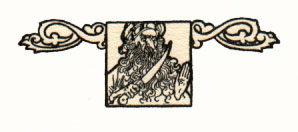
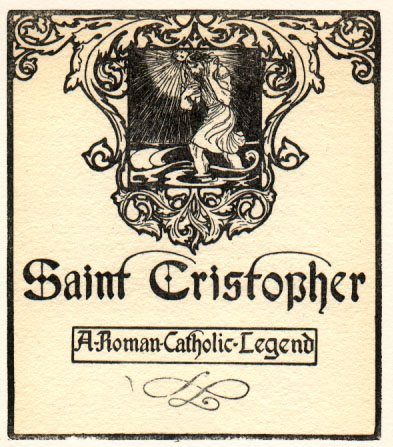
 HERE was once a man named Offero, so tall and strong that he stood among his fellows as a sturdy oak in a grove of saplings. His eyes were keen and clear as some great eagle's, his lips spoke nothing but gentle words, and his heart was as pure and tender as a little child's. His spirit was brave and fearless, and while he was yet in the prime of his strength he resolved to devote it to some good purpose.
HERE was once a man named Offero, so tall and strong that he stood among his fellows as a sturdy oak in a grove of saplings. His eyes were keen and clear as some great eagle's, his lips spoke nothing but gentle words, and his heart was as pure and tender as a little child's. His spirit was brave and fearless, and while he was yet in the prime of his strength he resolved to devote it to some good purpose.
"My friends," he said, when he had called together his companions, "I must leave you now, for something within me whispers that I was born to serve a king so great that fear is unknown to him; a king to whom all men bow."
Then he strode away into the forest and was seen of them no more.
For many a day he traversed valley and mountain, inquiring of all he met who was the greatest king. At last he came to a splendid country, where reigned a monarch of high renown. His armies were vast and powerful, and his fleet of warships was like a flock of birds bearing death on their grim brown wings. When he was told that Offero desired to serve him, he welcomed him gladly, and liked the young man so well that he soon made him his trusted counsellor and friend.
It was Offero's pride to see how all men trembled at his master's frown, and he could not believe that there lived a monarch greater than he. One day, however, when the king was present, a courtier made some remark about "the Evil One"; his Majesty's august brow grew pale, and Offero could have sworn he saw his stern lips quiver. Pained and surprised, he humbly asked the king why he was troubled.
"I am afraid of the Devil," said that monarch, "although I fear no mortal man. He is the King of Hades, and more powerful even than I."
"Then I must leave you, O King!" cried Offero with haste, "since I have vowed to serve none other than the most powerful monarch in existence." And sorrowfully he turned away.
 HERE is the Devil?" he asked the first man he met.
HERE is the Devil?" he asked the first man he met.
"He is everywhere," returned the traveller, looking round uneasily; and this was the usual answer that Offero received to his inquiry. Wherever he went men looked uneasy at the Devil's name, but would not say where Offero was most likely to meet with him.
He found him at last among a group of idle men and maidens on the village green, and hailed him as his master. The Devil was glad to have so strong a follower, and amused himself by showing the astonished giant his power over rich and poor. There seemed to be no limit to his might; he swayed the nobles in their velvet robes, and the peasants in their tattered garments.
"He is indeed master of the world," sighed Offero, and though he liked not the Devil's ways, he stifled his distaste that he might keep his word.
One day his master led him through the outskirts of the town into the open country.
"We are going to visit a hermit," he said with a burst of laughter. "He has left the town to be quit of me, but he will find me in his cave!"
Before Offero could ask of him what he meant to do with the good hermit, they came to a turn where four roads met. A rough wind swayed the branches of the trees, and a peal of thunder echoed among the lofty hills. It was neither wind nor thunder, however, that made the Devil tremble, but the sight of a wooden cross which some pious folk had erected here. With gaunt arms pointing east and west it stood immovable; the rain beat down on it mercilessly, as if to cleanse it from the roadside dust; and turning his head away that he might not see it, the Devil hastened past. Not until it was far behind them had Offero an opportunity of asking why he had trembled.
"I was afraid," answered his grim companion, with another shudder.
"Afraid?" repeated Offero in puzzled tones. "Why, what was there to be afraid of?"
"Did you not see the crucifix?" cried the Devil impatiently. "The figure on it is that of the Christ, and this is why I trembled."
The giant had never heard that Holy Name before, and felt more perplexed than ever as he demanded: "Who is this Christ whom you so fear?"
"He is the King of Heaven," was the reluctant reply.
 S He more powerful, then, than you?" persisted Offero, planting himself in the centre of the pathway so that his master could not pass on.
S He more powerful, then, than you?" persisted Offero, planting himself in the centre of the pathway so that his master could not pass on.
"He is more powerful even than I!" admitted the Devil, his eyes becoming points of fire.
"Then I shall serve Him, and Him only," the giant cried, and, turning on his heel, he left the Devil to go on his way alone.
When Offero reached the cross once more, a man was kneeling before it in prayer. As he rose from his knees, Offero asked him the way to Heaven.
"I cannot tell you," said the man. "The way is long, and hard to find. 'Tis well that Christ is merciful."
Offero met with like answers from many wayfarers whom he questioned, but at last came one who advised him to consult the hermit.
"He is a holy man," he assured him earnestly, "and has retired from the world that he may give his time to prayer and fasting. He thinks he can serve Christ this way better than any other."
So Offero sought the hermit, and learnt from him many things. He heard of the grandeur and goodness of Christ, and of the greatness of His Kingdom. All that he said made Offero more eager to serve Him than ever, and when the hermit explained that no one could enter the Heavenly Kingdom until he was summoned there by Christ Himself, he bowed his head in disappointment.
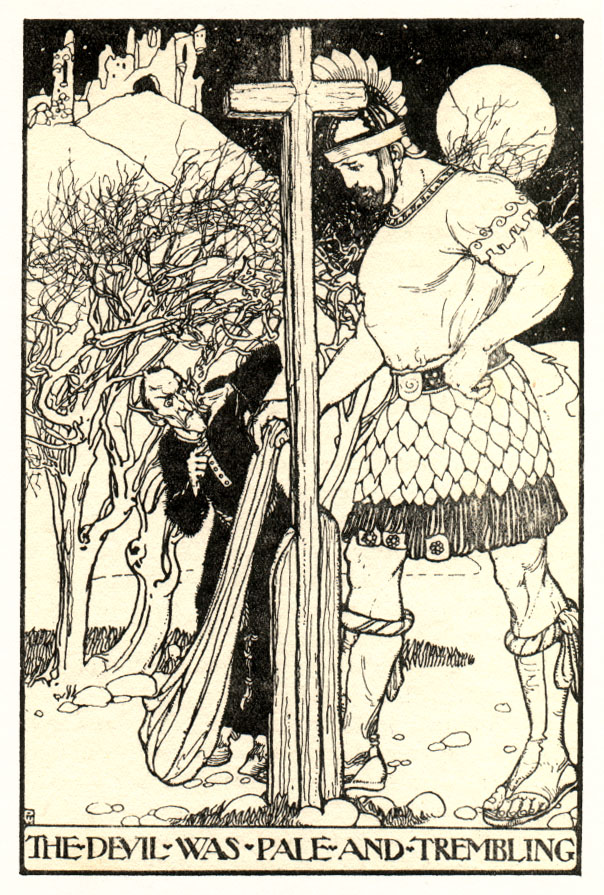
"How then can I serve this new Master?" he said, "unless I can see Him and hear His commands?"
"Do as I do," replied the hermit. "Give up the world, and fast and pray."
"If I were to fast," said Offero shrewdly, "I should lose my strength, and then, when He called me to work for Him, I should be useless." And although the hermit tried to persuade him, he would not stay, but set off again on his journey, determined to find the way to Heaven.
Presently he met a company of pilgrims. They were dusty and travel-stained, and very footsore, but their faces shone with joy. There were men and women and little children; some came from distant lands, and some from near, but one and all they were filled with a deep content.
"Who are you, and whence do you travel?" Offero asked them wonderingly.
"We are the servants of Christ," they answered, "and we are marching towards Heaven. The path is rough, and the way is long, but His many mansions await us."
"I will come with you, and be His servant too!" said Offero, and they welcomed him gladly.
The way was long, as they had said, but to the
giant the days passed quickly. He was learning so much that he could scarcely sleep for the wonder of it, and his face also shone with happiness. He grew very grave when he heard of the swift-flowing river that all must cross
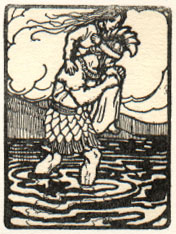 before they could hope to
reach the Kingdom of
Heaven.
before they could hope to
reach the Kingdom of
Heaven.
"There is no bridge to span it," said an aged pilgrim, whose tottering limbs were now so feeble that but for Offero's support they would hardly have borne him along. "The trembling woman, the little child, must cross it alone in the gloom and darkness, for though they call, no friendly boatman appears in sight. When Christ has need of us, His messenger will appear; he is clothed in raiment white as snow, and although his voice is always gentle, it is clearly heard in the rush and roar of the tempest as on a summer's day."
At length the pilgrims came to the river-bank, and as the giant gazed at the foaming current, and saw the waves dashing against the shore, he marvelled greatly at what he had been told. Surely, he thought, no feeble woman or little child could breast its waters and reach the other side.
Even as he mused on this the white-robed messenger called to an ailing girl who was almost too weak to move. Her Master had need of her, he said, and in the fair courts of Heaven she would be strong again.
What joy was hers when she heard his voice! But alas! when she crept to the edge of the bank, and saw the river that swept beneath it, her heart grew sick with fear. She quivered and shook from head to foot, and moaned that she dare not venture. An exceeding pity moved Offero to go to her help.
"Do not weep," he said, "but trust to me." And taking her tenderly in his arms, he lifted her on to his shoulder, and bore her tenderly across. In spite of all his strength, the pitiless current nearly swept him off his feet, and he fought with the icy waters as he had fought no mortal foe. The girl tried in vain to thank him as he placed her on the bank in safety; he would not let her speak.
"Tell Christ," he said, "that I am His servant, and that until He shall summon me to His side I will help His pilgrims to cross the River of Death."
 ROM henceforth this was his work.
He had no time to wonder when
his own call would come, for day and night there arrived at the banks of the river pilgrims from every clime, and, since few had courage to face
the dark waters
alone, he crossed and recrossed it continually. In order that he might be always at hand, he built himself a rough log-hut by the waterside, and here he made his home.
ROM henceforth this was his work.
He had no time to wonder when
his own call would come, for day and night there arrived at the banks of the river pilgrims from every clime, and, since few had courage to face
the dark waters
alone, he crossed and recrossed it continually. In order that he might be always at hand, he built himself a rough log-hut by the waterside, and here he made his home.
One night when the waves rolled fiercely and the wind blew high, Offero laid him down to sleep. Surely, he thought, no one would dare to cross in such a storm. His eyes had scarcely closed, however, when he heard a knocking at the door.
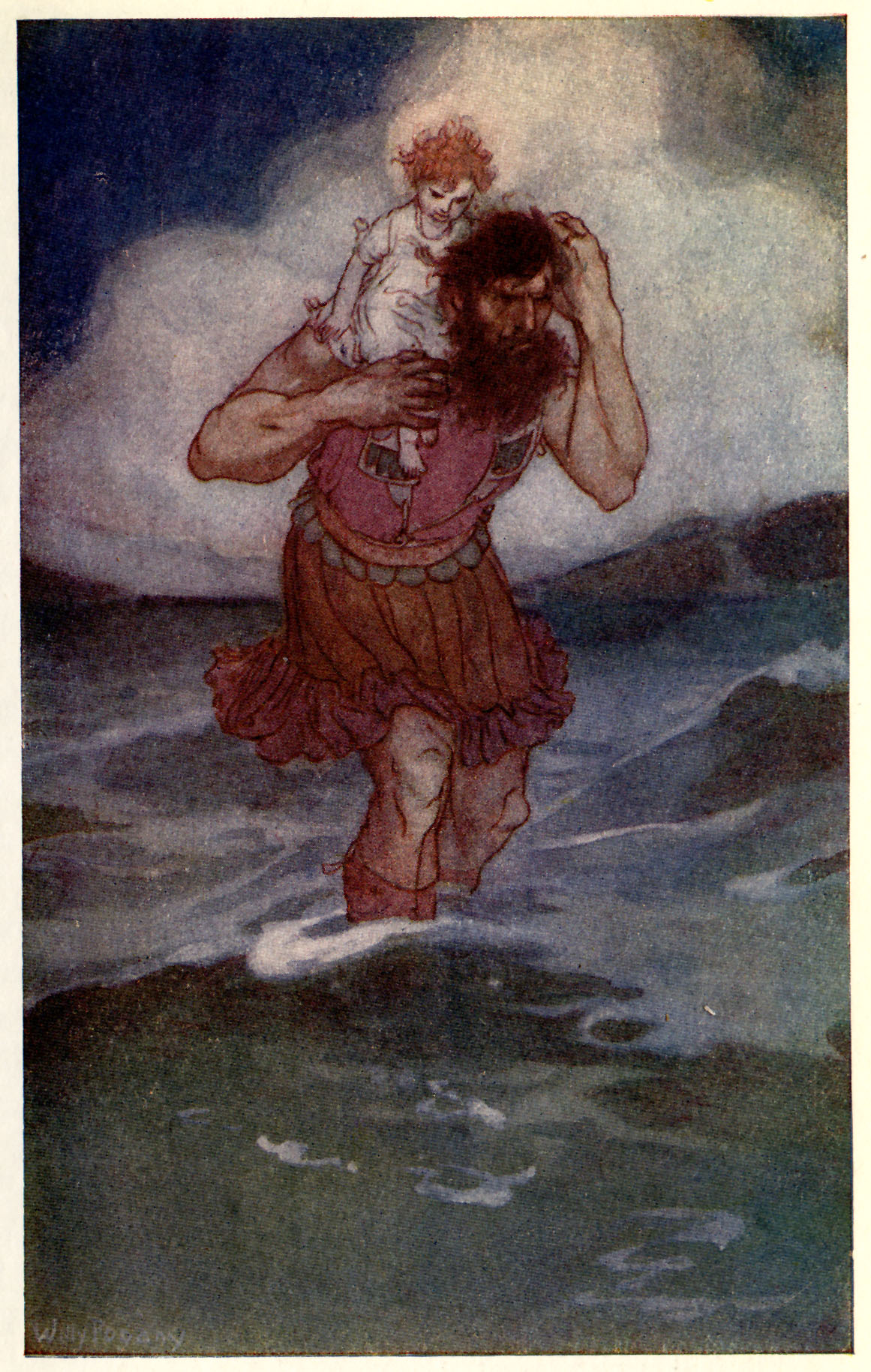
"HE PLACED THE BOY ON HIS SHOULDER"
"Who are you?" he cried as he threw it open. There was no answer, and by the light of his lantern he saw a wistful child on the river-bank. He was staring at the rushing waters with piteous dread, but the tone of his voice was clear and firm as he turned and spoke to Offero.
"I must cross to-night," he said. Offero looked at him with deep compassion.
"Poor child!" he murmured, "I am glad I heard you. With a tide like this it will be difficult even for me, giant as I am, but you would be swept away."
With gentle hands he placed the boy on his shoulder, and bidding him not to fear, set out for the opposite shore.
He had not over-estimated the difficulties he had to face. Time after time he was beaten backward, and the icy waters nearly engulfed them both. It took all his strength to bear up against them, and the weight of the child seemed greater than that of the heaviest man he had ever borne. When at last he climbed the steep, high bank, he was bruised as well as breathless, for the hidden rocks had worked him grievous harm.
"Tell Christ—" he panted. And then he saw that the figure beside him was not that of a little child, but of a radiant Being of kingly mien, with a crown of glory on His brow. The giant knelt before Him, and the vision smiled.
"I am the Christ," He said, "whom thou hast served so long. This night thou hast borne Me across the River of Death.... Thou didst find Me a heavy burden, for I bore the sins of the world."
Then He named Giant Offero "Cristopher," meaning "He who hath carried Christ," and took him to dwell with Him in His Heavenly Kingdom.
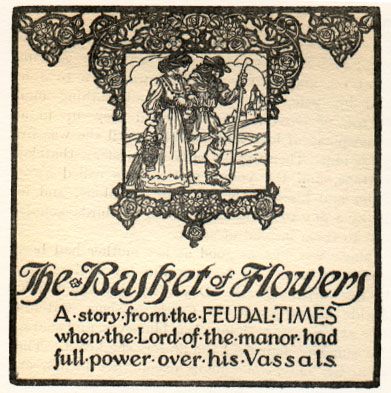
 OHN'S wedding-present from his master
was a charming little cottage, close to
the great garden of the Castle, which
he had made so beautiful. Early and late had he toiled over beds and borders, learning the habits of each tree and flower that he might know how best to grow them, and when he married a charming bride, as fair as one of his own roses, his neighbours declared that he deserved his good fortune.
OHN'S wedding-present from his master
was a charming little cottage, close to
the great garden of the Castle, which
he had made so beautiful. Early and late had he toiled over beds and borders, learning the habits of each tree and flower that he might know how best to grow them, and when he married a charming bride, as fair as one of his own roses, his neighbours declared that he deserved his good fortune.
The Count, his master, was a just and kindly man, and fully appreciated his services. As time went on, and a little daughter was born to John and his wife, they felt they had nothing more to ask of Heaven, and the child grew up in an atmosphere of love and sunshine until she was five years old. Then trouble came to the straw-thatched cottage, and the young mother was called away. John and his little Marie were left alone, and for many a day to come the songs of the birds sounded sad to them instead of sweet.
Marie was just as good as her mother had been, and very soon she became the joy and comfort of her father's heart. Day after day she toddled beside him through the Castle gardens, watching him at his work with her clear blue eyes, and shaking her sunshiny hair over the flowers she loved. They were her only companions except her father, and she murmured to them the piteous story of how Fidèle, her little dog, had eaten the nose of her best doll, or hidden her ball. The ladies at the Castle took a great fancy to the pretty little creature, and often, when she was old enough, the Countess had her up to the housekeeper's room that she might learn to embroider, and put dainty stitches in the delicate fabrics Court ladies wore. The grand cook too became one of her teachers, and Marie was taught how to concoct wonderful dishes out of very little, so that John fared well when he came in from work. At the age of fifteen his little daughter was a clever housekeeper, and it seemed as if the rest of his days were to be passed in peace.
Marie had other accomplishments besides cooking and needlework. An old woman in the village whom she had befriended showed her how to weave beautiful baskets from the willows by the stream, and Marie was always inventing fresh patterns, and different ways of twisting the pliant twigs, so that her baskets might be different from those of anyone else. When she wanted a new gown, or a dainty for her father, she would take some of these into the next town, where they fetched a very good price. The best one of all, however, she reserved as
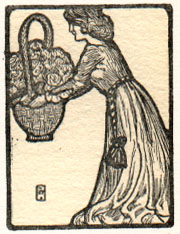 a
birthday present for the
young Countess, whom she
had worshipped from her
babyhood.
a
birthday present for the
young Countess, whom she
had worshipped from her
babyhood.
The birthday of the Countess dawned clear and bright. Marie was up early, filling her basket with fragrant pinks and delicate lilies, and arranging these with so much skill that her father exclaimed with pride when her work was finished. Holding it very carefully before her, she shyly approached the Castle, and was shown upstairs to her ladyship's own apartments.
The young Countess was delighted with the tasteful gift, and, leaving Marie in her bedroom, flew off to show it to her mother. Hastening back, she thanked Marie once again, and added graciously:
"It is your birthday too, dear girl, and this is my present to you. You must always think of me when you wear it."
As she spoke she displayed a simple white robe which she had lately purchased. It was trimmed with pale blue ribbons, and Marie flushed with delight as she curtsied and withdrew. Once outside the Castle, she ran so quickly with her treasure that she was out of breath when she reached the cottage.
"Isn't it beautiful, Father," she cried, "and shall I not look fine in it next Sunday?" All the while they were at breakfast she could talk of nothing else, and her father rejoiced to see her pleasure. He was just going back to his work when the young Countess herself came to the door. She was pale and trembling, and her beautiful eyes were filled with reproach as she flung the flower-filled basket on the floor.
"Oh, Marie!" she cried, "how could you do it? Is this the way you repay my kindness? Give me back my mother's diamond ring at once, and I will forgive you, but you must never come near me again."
 N vain Marie protested that she
had seen no ring, and that, if she
had, she would have died rather
than steal it; the Countess did
not believe her.
N vain Marie protested that she
had seen no ring, and that, if she
had, she would have died rather
than steal it; the Countess did
not believe her.
"It was there, on my dressing-table, when I left you in my room that I might show my mother your basket!" she said indignantly. "Our maid, Henrietta, noticed it there the moment before you came in, and no one entered afterwards but you and myself."
"I never saw it!" repeated Marie. "Do believe me, dear Countess! I would not rob you for anything in the world!" Her father, deeply agitated, joined his pleading to hers.
The young Countess turned haughtily away.
"If you will not confess," she said, "I shall send you to prison." And she swept away in bitter anger.
Marie and her father were overwhelmed with grief. He did not for one moment doubt her innocence, but he saw that circumstances were against her, and, dazed and bewildered, knew not what to do. The bailiff shortly afterwards appeared, and in spite of Marie's protestations carried her off to prison.
Marie spent a terrible night, and when morning came was but a wreck of the bright young girl who had taken the young Countess that ill-fated basket of flowers. Her honest face, as she denied all knowledge of the ring, prepossessed the judge in her favour, but the maid Henrietta was so emphatic in saying that she had actually seen it on the dressing-table before Marie entered the room, and had even noticed how the sunlight caused it to sparkle, that he had no choice but to find her guilty. Marie was sentenced to imprisonment, but the Count, in compassion for her father's distress, begged the judge to modify her punishment. She was accordingly set at liberty, but on condition that she should immediately leave that part of the country, and that her father should pay the value of the ring. The old gardener would not abandon her, so the little cottage was given up, and all their cherished possessions were sold to defray the cost of the missing ornament. The only thing that Marie retained, besides the clothes she wore and a small old-fashioned portrait of her mother, was the Countess's basket, which she kept as a memento of that dreadful day.
The poor old man was sick with trouble as he and Marie set off on their wanderings. He had worked hard all his life, and now, at the end of his days, it seemed as though this disgrace would kill him. His love for Marie was his only consolation, and the heroic fortitude with which she bore herself under this heavy trial made her more dear to him than ever.
 OR days they wandered over the country, sleeping at night in the
shelter of a hayrick, or under a
hedge, with berries and fruit for
their only food. Nature was kind
to them, for the skies were clear,
and the air so soft and balmy that it seemed
like a caress. At last, when the old man's strength was all but spent, Marie saw before them a comfortable farmhouse. The porch was covered with roses, and the polished windows almost smiled at her. Here, she felt, they might meet with friends, and she was not disappointed.
OR days they wandered over the country, sleeping at night in the
shelter of a hayrick, or under a
hedge, with berries and fruit for
their only food. Nature was kind
to them, for the skies were clear,
and the air so soft and balmy that it seemed
like a caress. At last, when the old man's strength was all but spent, Marie saw before them a comfortable farmhouse. The porch was covered with roses, and the polished windows almost smiled at her. Here, she felt, they might meet with friends, and she was not disappointed.
The farmer and his wife were kindly folk, and their hearts were moved to pity at the sight of the forlorn wayfarers who approached their door. They invited them into the red-flagged kitchen, and set before them milk and bread. When the wanderers had refreshed themselves, and were seated on the wide oak settle, their compassionate hosts inquired their history, and on learning of their misfortunes, and of what poor Marie had been accused, their hearts went out to them.
"That is the way with those rich people," said the old farmer; "they treat us as though we were dogs and did not know what honour meant. Fancy serving you in that way, and doubting your daughter's word, when you had worked for them faithfully for so many years! But never mind—you shall make your home with us for the present, and when you are strong again, we will see what you can do."
So that night Marie and her father slept under a roof once more, and their prayers were full of gratitude to Heaven.
The old man soon recovered his wonted health, for the fare at the farm was good and plentiful, and the farmer's wife, who had taken a great fancy to Marie, was kindness itself. She had always longed for a daughter, and now, as she said, it seemed as though Providence had sent one. Her only son was a headstrong youth, but little at home, and up to the present had been no comfort to her.
In spite of all that had befallen them, the next three years were happy ones, both for Marie and her father. The old man took as much pride in the garden of their kind friends as he had done in that of the Count. He made it a bower of fragrance, and people came for miles to see his wonderful show of roses. The cuttings from his plants brought the farmer a considerable sum, and Marie was so useful about the house that the good wife often wondered how she had done without her before she came. Her baskets brought in quite as much pocket-money as she required.
"If only I could prove my innocence of that dreadful theft!" Marie would sometimes say to herself, as she worked in the long summer evenings; but she stifled her sighs lest she might sadden her father. As age came on him he forgot the past, and, living only in the present, passed his days in calm content.
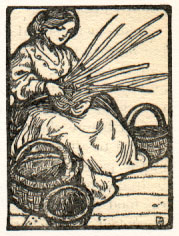 One morning when she went to call him, she found
him asleep—so fast asleep that she could not wake
him; the little portrait of her mother lay in his open hand. In spite of her overwhelming sorrow at being left alone, Marie could only
feel glad that his pilgrimage
was at an end.
One morning when she went to call him, she found
him asleep—so fast asleep that she could not wake
him; the little portrait of her mother lay in his open hand. In spite of her overwhelming sorrow at being left alone, Marie could only
feel glad that his pilgrimage
was at an end.
This was the beginning of a very troubled time for the farmer and his wife, as well as for Marie herself. The preceding winter had tried the old couple greatly, and they felt too feeble now to work the farm by themselves. Their son was a clever fellow, and they knew that if he would only give his mind to his work, he could make the farm pay as well as it had done in years gone by.
"I will give everything over to you, my son," the farmer said, "if you will solemnly promise that your mother and I shall be allowed to stay here for the rest of our lives, and that you will provide for us comfortably."
Their son gladly agreed to this, for he was tired of roaming about, and glad to settle down. Marie, of course, was to stay on also. She did the work of two servants at least, so it was no particular credit to the young man that he wished to keep her.
While he remained single, things went on smoothly, but he soon took a wife from the village, a handsome and showy girl, who was of a jealous disposition, and knew as little how to keep house as she did how to hold her tongue. They had not been married a month before she fell out with the old people, and refused to allow them to sit either in the kitchen or in the parlour. They were turned out of their big bedroom, being made to sleep in a garret instead, and the food she supplied them with was both scanty and ill-cooked. It is hard to say what they would have done but for Marie, who put up with the young wife's temper with angelic sweetness, that she might still be near the dear old people who had befriended her.
Before very long, however, her position became impossible. The young wife grew jealous of her loveliness, and sought by every means in her power to make her life unbearable. The climax came when she accused her of having stolen some linen that had been laid out to bleach in the sun, and had mysteriously disappeared.
"You are at your old tricks!" she said to Marie, for she had heard her story; and the poor girl could have sunk into the earth with shame.
"Alas! I must leave you!" she cried weepingly to the old couple. "I cannot stay here any longer. If only I could die!"
For the first time since she left the Castle, Marie gave way to despair; she had nowhere to go, for she was homeless. For a long while she wandered about the fields. When dusk gave place to darkness she made her way to the little churchyard on the hill where, Sunday after Sunday, she filled the basket on her father's grave with flowers. Here, under the shade of a cypress, she laid herself down, and cried herself to sleep.
The moon shone down on the sleeping girl, turning her soft bright hair into a wreath of gold as it caught the light. Out of the darkness of the church porch stole a tall white figure, that might have been an angel's. But the face was the face of a woman, and she bent over Marie, exclaiming:
"Do you not recognise me, dear child? I am the young Countess whom you used to love, and I have come to ask you to forgive me for my cruel doubts."
 ARIE was too dazed at first to
understand the meaning of her
words, but presently, as she sat beside the Countess in a stately bedroom of the house where she was
staying, she heard with joy that
her innocence had been proved.
ARIE was too dazed at first to
understand the meaning of her
words, but presently, as she sat beside the Countess in a stately bedroom of the house where she was
staying, she heard with joy that
her innocence had been proved.
"Last year I was married," said the young Countess, "and after our wedding my husband and I went back to the Castle, which we left soon after you did. During our visit there was a violent storm, and one of the trees, close by the window of the room where I used to sleep, was struck by lightning and torn asunder. A great branch fell to the ground, and out of this dropped a magpie's nest. My younger brothers, who were with us, flew to see what it contained, and discovered a number of bright and shining treasures, among which we found that ring. It was clear that the magpie had carried it off, after having flown in through my open window. And you, my poor Marie, were the sufferer."
Marie broke into sobs. In the midst of her relief and gladness, she could not help thinking of her father. And the Countess wept also. Presently she went on with her story.
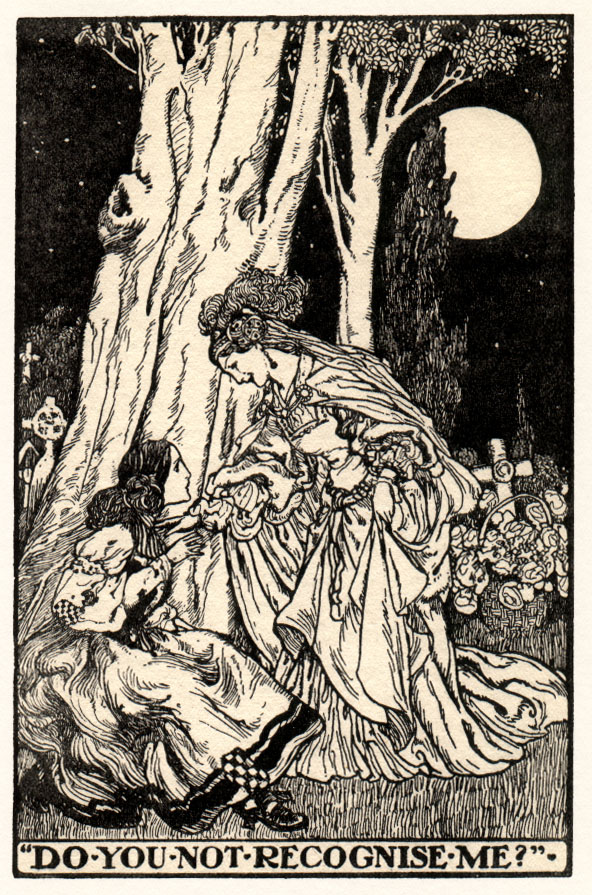
"My father sent for Henrietta, and forced her to confess that she had actually missed the ring before you came that morning. It was her jealousy of you that made her give false evidence, but I do not believe she has ever been happy since that day.... We did all we could to find you, but in spite of our many inquiries we could hear nothing, and thought you must be dead. A few days ago I came to visit a castle in this neighbourhood, and my hostess brought me to-day to see the little church. As we strolled past the graves, she showed me one which she said was always decked with flowers.
"'It is that of an old gardener,' she added. 'His daughter never forgets him.' And there, full of lilies and roses, I saw the basket that you had made for me. I knew it at once, for no one but you ever made them just that shape....
"I came back to-night because I could not sleep for thinking of the injustice that I had done you. Oh, my dear child, how sorry I am, and what you must have suffered! But that is over now. You must come home with me, and never leave me again."
Marie did not forget the old couple, who had been so good to her in her hour of need, and the first thing she did next day was to take the Countess to see them. Owing to her good offices, the son and his wife were given another farm, and the old people were reinstated as master and mistress of their own home, with a kind young woman to look after them.
Marie returned to the Castle with the Countess, and the people of the village could not do enough to show their contrition for their want of faith in her in days gone by. A few years later she was happily married to a young gardener in the Count's service, and went to live with him in the dear little cottage where she was born. The Countess gave it to her as a wedding present, and here she and her husband spent many happy years, with their children round them.
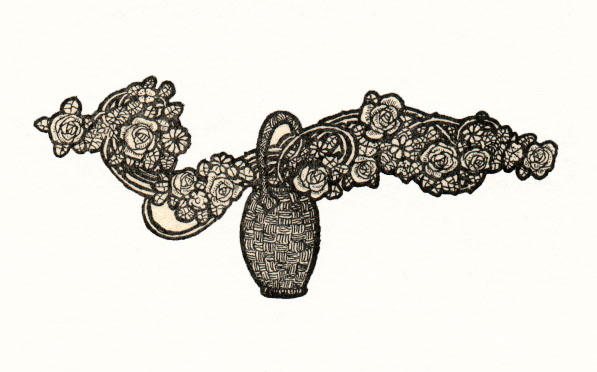
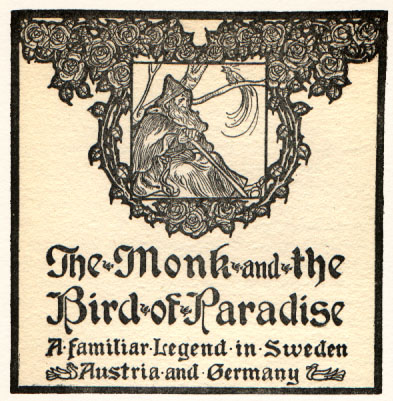
 THE banks of the Rhine stood a large
Monastery, where dwelt a company of
monks. These holy men were not only
distinguished for sanctity, but also for their wisdom and learning, and one of the foremost was Brother Bernard, whom all reverenced for his piety. From far and near students came to consult him, and his words were quoted as if he were an oracle.
THE banks of the Rhine stood a large
Monastery, where dwelt a company of
monks. These holy men were not only
distinguished for sanctity, but also for their wisdom and learning, and one of the foremost was Brother Bernard, whom all reverenced for his piety. From far and near students came to consult him, and his words were quoted as if he were an oracle.
In spite of his holiness, however, Brother Bernard had serious misgivings as to the state of his own soul. He could not imagine himself living in Paradise for ever without becoming weary of it.
"Alas!" he cried, "we tire of everything upon this earth, and I fear that even an eternity of bliss would at last become monotonous. The vesper hymn is very sweet, but I should not care for it unceasingly."
He was so tormented by this thought that he could neither read nor pray. At the foot of the mountain on which the Monastery was built stood a great forest, and here he wandered for hours in the shade of the giant trees, so absorbed in his reflections that he paid no heed to where he trod. At last he prayed that God would work some miracle that he might know that life in Heaven would neither be dull nor dreary.
After a while he grew fatigued by his long ramble and looked around to see whence he had come. To his surprise he found himself in an unknown part of the forest, and on reaching a clearing where the sunlight streamed on the fallen needles of the pines, he threw himself into the midst of their fragrance to rest awhile. Just then a little bird, with plumage the colour of the sky itself, alighted on the branch above him, and began to sing. So pure and exquisite were its notes that Brother Bernard listened in ecstasy until the sweet song ceased. As the bird vanished, the monk rose from his seat. "Dear me," he cried, "how stiff I am! I must have walked much further than I thought."
In stooping to brush the pine-needles from his robe he noticed that his beard was snowy white, and that his hands were wrinkled, like those of an old man. Even the forest itself looked changed to him, for the trees were larger, and the bushes had disappeared. He wondered if he could be dreaming, for otherwise, he thought, his senses must be deceiving him. With great difficulty he found his way back to the village, where he was surprised to meet unfamiliar faces. He rubbed his eyes again and again, feeling greatly disturbed.
"I thought that I knew every one," he muttered to himself, "but here are people whom I never met before. Who are they, and why do they stare at me as if I were some wild man of the woods, instead of
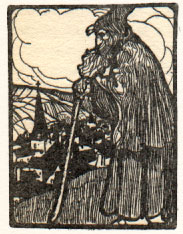 hastening to kiss my hand
and receive my benediction?" He was too weary
to question them, however, and made his way to the
Monastery. His astonishment increased when he
found a stranger in charge
of the gate instead of good
Brother Antoine, who had
held the office for more
than fifty years.
hastening to kiss my hand
and receive my benediction?" He was too weary
to question them, however, and made his way to the
Monastery. His astonishment increased when he
found a stranger in charge
of the gate instead of good
Brother Antoine, who had
held the office for more
than fifty years.
"Where is the porter?" he asked him falteringly, "and what has happened to cause the changes which I see around me?"
The Brother looked at him curiously.
"I do not know what you mean," he said, "for I have been porter here for thirty years, and I can assure you that there have been no changes in my time."
"Then what can have happened to me?" exclaimed the bewildered monk. "I went out this morning to walk in the forest, and on my return I find no trace of my old comrades."
Just then two aged monks came slowly by, and Brother Bernard stepped in front of them.
"Do you not recognise me?" he asked. "Is there no one here who knows Brother Bernard?"
"'Brother Bernard'?" said the oldest, reflectively. "We have no Brother of that name in the Monastery now, but I remember having read of him in our chronicles. He was a most holy man, with the simple faith of a little child. One morning, they say, he quitted the Monastery and went to the forest that he might meditate and pray with nothing between him and the floor of Heaven. He never returned, and though a diligent search was made, no trace of him could be found. It was thought that he had been carried up to the skies, like the prophet Elijah, in a chariot of fire: a fitting end to his life of sanctity."
"How long ago was this?" asked Brother Bernard tremblingly.
 THOUSAND years," said the old
monk. "You may see by our books that this is so."
THOUSAND years," said the old
monk. "You may see by our books that this is so."
On hearing this Brother Bernard fell on his knees.
"God heard my prayer, and worked a miracle," he cried, "that I might have faith. He sent His Bird of Paradise to sing to me, and, while I listened, a thousand years passed by. Now indeed I believe, and would feign enter His Holy Kingdom."
He bowed his head in silence, and when they spoke to him again they found that his spirit had passed away. The smile on his lips was so full of sweetness that the monks marvelled greatly, and they noted with awe that his wrinkled face had grown smooth again.
"God is good to His Saints," murmured one monk. "Amen," returned the others solemnly.
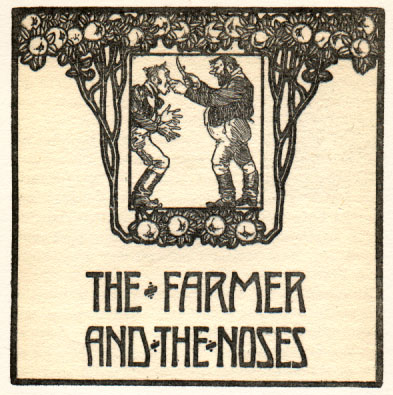
 THE neighbourhood of the City of Prague
there once lived a very eccentric farmer,
who was reputed to be extremely wealthy.
He had a remarkably handsome daughter, with a pair of fine dark eyes, who was a great favourite with many students at a neighbouring University. She would often chat with these when they passed her home in their country rambles, but she never showed more encouragement to one than to the other.
THE neighbourhood of the City of Prague
there once lived a very eccentric farmer,
who was reputed to be extremely wealthy.
He had a remarkably handsome daughter, with a pair of fine dark eyes, who was a great favourite with many students at a neighbouring University. She would often chat with these when they passed her home in their country rambles, but she never showed more encouragement to one than to the other.
So charming was Theresa, and so rich her father, that the name of her suitors was legion. Theresa knew her own value well, and was not a ripe cherry ready to drop off the branch at a moment's touch. This only enhanced her attraction to her lovers, and several of them agreed upon the ingenious plan of entering her father's service during their vacation as ordinary farm-hands, so that one of their number might thus find an opportunity of winning her maidenly heart.
The farmer was a shrewd old man, and soon discovered their wily plot. For the future, he declared, he would only take servants who agreed to remain in his employment for at least a year, and permit him to cut off the tips of their noses if they became discontented. He, for his part, would agree that he should forfeit the tip of his own nose if he lost his temper with them. Notwithstanding this extraordinary condition, so fascinating was Theresa, and the reputation of his wealth, that several of the University students entered his service.
It was fine sport for the farmer, for he had the youths in the hollow of his hand. By putting upon them unexpected hardships, he surprised them into betraying discontent. He then demanded that they should pay the penalty, and ignominiously dismissed them, minus the tips of their noses.
At length, however, a young student named Coranda arrived on the scene, determined to win the farmer's daughter. The conditions were fully explained to him, so that he might have no just cause of complaint if he did not comply with them.
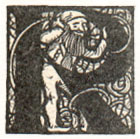 EMEMBER," said the farmer,
"that if you come you must stay until the cuckoo returns in the spring, and if, in the meantime, you show any signs of discontent, you too will forfeit the tip of your nose."
EMEMBER," said the farmer,
"that if you come you must stay until the cuckoo returns in the spring, and if, in the meantime, you show any signs of discontent, you too will forfeit the tip of your nose."
"Very well," said the student calmly, and with an affectionate glance at Theresa took off his coat and prepared to work.
The farmer began his usual tactics. At dinner and supper he offered the young man nothing to eat, yet smilingly inquired from time to time if he had had enough. Coranda replied with gay good-humour that he was perfectly satisfied, but having no intention of starving, he coolly helped himself to a piece of bread and a thick slice of meat. The farmer turned pale with anger, and asked him how he dared to take such a liberty.
"I was hungry," Coranda replied, "for I had not tasted food all day. However," he added, "since you are not satisfied, and I have made you angry, I will leave at once, after having sliced off the tip of your nose."
The farmer saw that he was fairly caught in his own trap, and as he had no desire to be disfigured, he declared that he too was satisfied. After this he took good care that Coranda should have his share at meal-times.
When Sunday morning came the farmer made another attempt to put him in the wrong.
"I am going to church with my wife and daughter," he said. "You must prepare the soup during my absence. Here are meat, carrots, onions, and the pot. You will find parsley in the garden. See that your soup is good, or you will rue it. Don't forget the herbs," he added; "I like my broth well seasoned."
Shortly after they had gone Coranda began his soup-making. He threw the meat and vegetables into the pot, filled it with water, and then went off to the garden for the parsley. He found other green things in plenty, but no parsley, though he searched under rose-bushes and round the borders, and made himself very hot and uncomfortable in the process.
The farmer's small dog frisked round him all the time apparently delighted by his non-success. It refused to be driven away, and yelped and barked without ceasing.
Suddenly Coranda remembered that for some absurd reason or other they had named the little brute "Parsley."
"Aho," he said, "I have it now!" And without more ado he killed the dog, and added it to the contents of the pot.
In due time the farmer came home from church, looking very well pleased. Theresa had on a new frock trimmed with blue ribbons, and he chuckled with glee at the temerity of the rash student who thought to woo her.
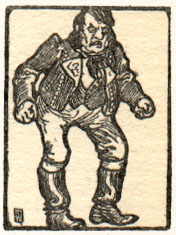 "He's a handsome fellow," he said to himself, "but it will spoil his beauty
when I snip off the end of his nose."
"He's a handsome fellow," he said to himself, "but it will spoil his beauty
when I snip off the end of his nose."
He at once proceeded to make matters uncomfortable for the young man.
"I hope your soup is good," he said, as his wife ladled him out a steaming plateful. It tasted abominable, and was swimming with fat, but a gleam in the student's eye reminded him in time that if he gave way to temper his own nose would suffer. So he swallowed his anger, though not the soup.
"Parsley!" he cried, looking round for his dog, "come here! This soup is fit for you, and you shall have it."
"It is Parsley which gives my soup its excellent flavour," remarked the student with a roguish glance at Theresa, who demurely cast down her eyes. "I could find none save the dog, and so I put him in the pot."
On hearing this the farmer began to scold violently.
"I did merely what you told me," said the youth, "but if you are angry I am ready to go, taking with me the tip of your nose."
"Oh, no, I am not angry," replied the farmer, with a deep sigh. His face was contorted with rage, and the other servants had much to do to keep from laughing.
Next morning the farmer went off to market. He would not leave either his wife or daughter at home, for he suspected them of favouring the handsome student. Before he set out he gave him his orders for the day, and in such a rude tone of voice that the young man flushed with anger. He was only to do what he saw the others doing, he was told, and the farmer added a slighting remark as to his general incapacity.
Coranda sauntered round the farm with his hands in his pockets on the look-out for an opportunity to get even with his employer. By and by he noticed some workmen placing a ladder against an old barn, and waited to see what they were going to do. One after another they climbed to the roof, and began to take off the tiles as a preliminary to pulling down the building.
 ORANDA lost no time in following their example. He fetched another ladder, and mounting the roof of the farmer's house, set to work to demolish this. When the farmer returned he was horrified to see that most of it was uncovered. Naturally indignant, he attacked the young man bitterly, to be met with the same smiling good-humour, and an offer to leave his service on the conditions agreed upon. The farmer once more could not find a word to say, and stalked away in gloomy anger.
ORANDA lost no time in following their example. He fetched another ladder, and mounting the roof of the farmer's house, set to work to demolish this. When the farmer returned he was horrified to see that most of it was uncovered. Naturally indignant, he attacked the young man bitterly, to be met with the same smiling good-humour, and an offer to leave his service on the conditions agreed upon. The farmer once more could not find a word to say, and stalked away in gloomy anger.
This sort of thing went on for some weeks. Try as he might, he could not get the better of the quick-witted student, who scrupled at nothing in his determination to win Theresa for his bride. It was she whom the father at last consulted, for life was becoming a burden to him, and he was anxious to get rid of Coranda at any cost.
Theresa considered awhile, and there was an odd expression on her pretty lips when at last she spoke.
"Well," said she, "you told him that he could not leave until he heard the cuckoo's call. Take him into the meadow behind the orchard. I will hide in the boughs of an apple-tree, and imitate the cuckoo's voice."
"You are as clever as you are handsome," cried her father with great delight, and pretending to desire a private conversation with the student, he took him into the long meadow. Theresa, of course, was safely ensconced by this time in the spreading boughs of an apple-tree.
"Cuckoo! Cuckoo!" she cried, so naturally that a robin on a neighbouring bush was nearly startled out of his feathers. As the sound reached his ears, the farmer promptly gave the young man notice.
"Very good, master," replied Coranda, "but this cuckoo's an early bird. I must have a look at her."
 EFORE the farmer could stop him he ran to the orchard, and catching a glimpse of Theresa's frock through the gnarled brown boughs, he vigorously shook the apple-tree. Down came the girl, falling into his arms, and he held her there tightly, in spite of her mild struggles to escape.
EFORE the farmer could stop him he ran to the orchard, and catching a glimpse of Theresa's frock through the gnarled brown boughs, he vigorously shook the apple-tree. Down came the girl, falling into his arms, and he held her there tightly, in spite of her mild struggles to escape.
"Wretch!" cried the farmer. "Be off at once before I put an end to you."
"Why should I be off?" inquired Coranda, trying to look at Theresa's face, which was certainly pink enough for an apple-blossom. "Are you angry? It's a lovely cuckoo."
"Begone!" shouted the farmer. "Set my daughter free, and away with you!"
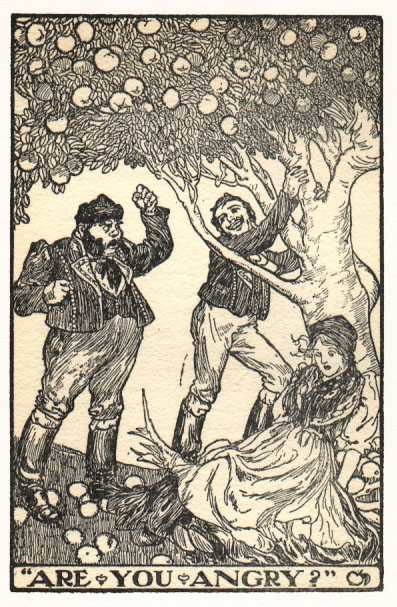
"Then allow me to cut off the tip of your nose," was the reply, and now Theresa succeeded in escaping from the arms that held her. The farmer stood aghast.
"No, no," he exclaimed in distressful tones, "I cannot have that, but you must leave us. If you go at once I will give you ten sheep."
"That's not enough," replied the student, shaking his head.
"Then ten cows," said the farmer hastily.
"No, I would rather keep to our agreement," replied Coranda, whipping out of his pocket a very large penknife and opening one blade. Theresa sprang forward with a cry of horror. Once more the student caught her in his arms.
"Ssh! Your father shall keep his nose, but he must give you to me for my wife." And he kissed her so ardently that if Theresa had any objection to make, it was not heard.
The farmer now forgot everything in his rage at the young man's boldness, but in the midst of his storming the fair Theresa threw her arms around his neck and implored him not to sacrifice his nose, since she was quite willing to marry this lover. The situation was not an easy one for the poor man, and at length he allowed himself to be appeased, and admitted that Coranda had the best of the argument. There was no denying this, and as the young man would not relinquish his advantage, the farmer was forced to give a favourable answer to his suit.
The wedding of the young people was celebrated very soon, and Coranda invited his defeated fellow-students, who came with a good grace. The farmer soon became reconciled to his son-in-law, and in due course was a great favourite with his grandchildren. If they were naughty, or appeared discontented, their father would threaten to cut off the tips of their noses, and then the old man might be seen tenderly rubbing his own.
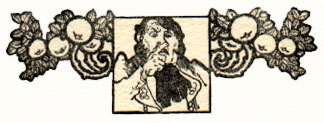
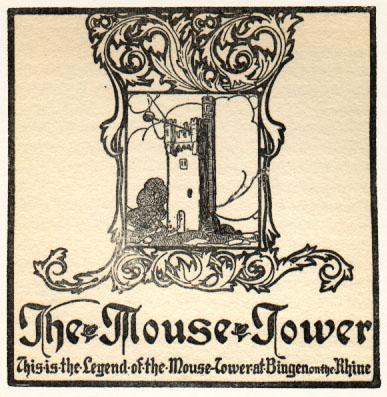
 ATTO, Bishop of Mayence, was rich and avaricious. Instead of devoting himself to prayer and almsgiving, he thought only of increasing his great wealth, and at a time when numbers of his people could not obtain sufficient food his money-chests were laden with gold. His farms were the most productive in the whole country, and whatever might happen to other folk, he did not seem to suffer.
ATTO, Bishop of Mayence, was rich and avaricious. Instead of devoting himself to prayer and almsgiving, he thought only of increasing his great wealth, and at a time when numbers of his people could not obtain sufficient food his money-chests were laden with gold. His farms were the most productive in the whole country, and whatever might happen to other folk, he did not seem to suffer.
One spring the rivers overflowed, and the low-lying land was flooded. The harvest failed, and famine was imminent. Finding themselves on the point of starvation, the villagers went to implore his aid.
"Take pity, good Bishop, on our hungry wives and little children," they entreated. "They die with hunger while your granaries are full of wheat."
But Bishop Hatto only laughed.
"I cannot help that," he said. "You must look after yourselves." And day after day he made them the same answer.
"My wheat is far too precious," he said at last, "for me to bestow it on hungry rats!"
Even this, however, would not drive them off, for they were desperate, and, wearied at length by their importunities, Hatto bade them go to one of his largest granaries, which happened to be empty, saying that there he would meet them and satisfy their demands.
Now at last there was joy among the starving creatures. Their dim eyes brightened, and strength came back to their shrunken limbs as they dragged themselves to the granary, in which there was soon a large assembly.
"You shall have bread to-night," they told their little ones, and the children ceased their wailing.
At the appointed time Bishop Hatto made his appearance, accompanied by a number of his servants. His cruel lips were pressed tightly together, and the fires of hatred burnt in his deep-set eyes as he surveyed the hungry crew through the open doors of the great granary. Instead of entering it, he told his servants to pull-to the doors, and bar them firmly. When this was done, he commanded that the building should be set on fire.
Meanwhile the hungry men and women were thanking God for having softened his heart, and calling down blessings on his name. Every moment they expected to see him enter, but the minutes wore on, and he did not come. One of their number threw open a window that they might have more air, and, as he did so, the Bishop's rage found vent in words.
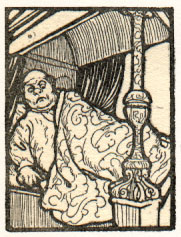 "You have pestered me
like rats," he said, "and now you shall die like rats."
"You have pestered me
like rats," he said, "and now you shall die like rats."
As he spoke, the crackling of the flaming walls that hemmed them in made his meaning clear. Despite their shrieks and appeals for mercy they were burnt alive, and though his servants were pale with horror, the Bishop calmly surveyed the scene. When the granary was but a mass of cinders, he went back to his palace with an easy mind to enjoy his luxurious dinner.
That night his sleep was broken by queer little sounds, as if rats and mice were scampering over the floor, and nibbling at something they had found. Next morning he was annoyed to find that the splendid portrait of himself in his Bishop's robes, which had been painted by a famous artist at great expense, was lying on the ground, gnawed to shreds. He could see the mark of the rats' sharp teeth on that part of the canvas where his face had been, and in spite of himself he shuddered at the sight.

A few minutes later one of his servants burst in to tell him that a vast number of mice and rats were approaching his palace from the ruins of the granary.
"They are coming in this direction with all speed, my lord!" he said with bated breath, and a panic of terror seized the man who had committed so evil a crime. Mounting his horse, he went off at full gallop; but though the brute was fleet, and he spurred him on unmercifully, the Bishop found that the army of rats was gaining upon him. Wild with terror, he hurried down to the riverside, and jumping into a little boat, rowed with all his might towards a tall stone tower built on a rock in the middle of the stream. Entering this with what haste he could, he quickly barred the door, and crouched down in a dusty corner. He was safe, he thought, for a time at least.
What was his horror presently, on peering through a narrow slit in the stone walls, to see that
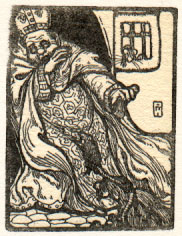 the rats
and mice had devoured his
horse, and were now swimming across the river. The
current was swift and strong,
but they gained the tower,
and though he had barred
the window he could hear them climbing up the rough stone wall in all directions.
He heard them gnawing at the doors and windows; and
the poor starved people
whom he had caused to perish did not suffer half what he suffered then.
the rats
and mice had devoured his
horse, and were now swimming across the river. The
current was swift and strong,
but they gained the tower,
and though he had barred
the window he could hear them climbing up the rough stone wall in all directions.
He heard them gnawing at the doors and windows; and
the poor starved people
whom he had caused to perish did not suffer half what he suffered then.
They were in at last, and sprang at him fiercely.... He beat them off by the score; he trampled them under his feet; he tore at them savagely with his hands—all to no purpose; he might just as well have tried to beat back the ocean. The rats surged against him like waves breaking on a cliff, and very soon the Bishop was overwhelmed in the horrid flood. Little was left to tell of the tragedy when his servants plucked up courage to enter the building some days later.
This is the story of the Mouse Tower near Bingen-on-the-Rhine, which is still pointed out to strangers as the place where Bishop Hatto met his death.
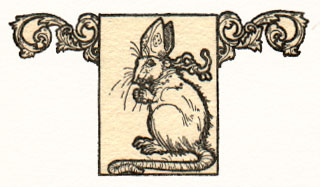
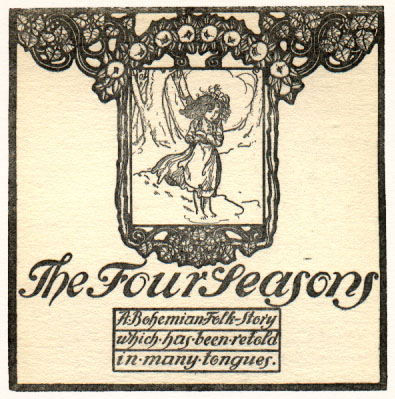
 ERE was not a prettier cottage on the borders of the forest than that which was the home of Clare and Laura. A beautiful rose-tree clambered all over the little house, thrusting its clusters of small pink blossoms through the open windows, and nodding to Clare as though to say: "You are as sweet as we are, and the sun shines on us all."
ERE was not a prettier cottage on the borders of the forest than that which was the home of Clare and Laura. A beautiful rose-tree clambered all over the little house, thrusting its clusters of small pink blossoms through the open windows, and nodding to Clare as though to say: "You are as sweet as we are, and the sun shines on us all."
The roses did not nod their heads at Laura, for she was as ugly and wicked as Clare was lovely. Her face wore always a heavy frown, which her mother's reflected; for Laura was her favourite child, and she could not bear to see that her second daughter, for whom she had no spark of love, should be so much the more attractive of the two.
Nature had been very kind to the little Clare. The roses had given their delicate colouring to her soft cheeks, and her pretty eyes were just the hue of a purple pansy. The red of the crimson berries that glinted among the evergreens when winter came, was not more vivid than that of her lips, and her hair had the sheen of yellow corn when the sun is smiling on it. Laura could not look at her without a pang of envy, and longed to drive her away from home.
One bitter day in winter, when a waste of snow surrounded the cottage, and frozen icicles hung from the roof, Laura asked her mother if Clare might pick some violets in the woods for her.
"'Violets'?" exclaimed the mother, "at this time of the year? Why, you must be dreaming, child! There is not a single flower in all the forest!"
But Laura insisted that Clare should be sent to seek for the flowers, and, loath to refuse her anything, her mother did as she was asked.
"Do not come back without them, or it will be the worse for you," Laura called from the doorway, as she watched her little sister go shiveringly down the pathway that led to the forest. In its depths, she knew, there lurked gaunt grey wolves, and these were fierce with hunger.
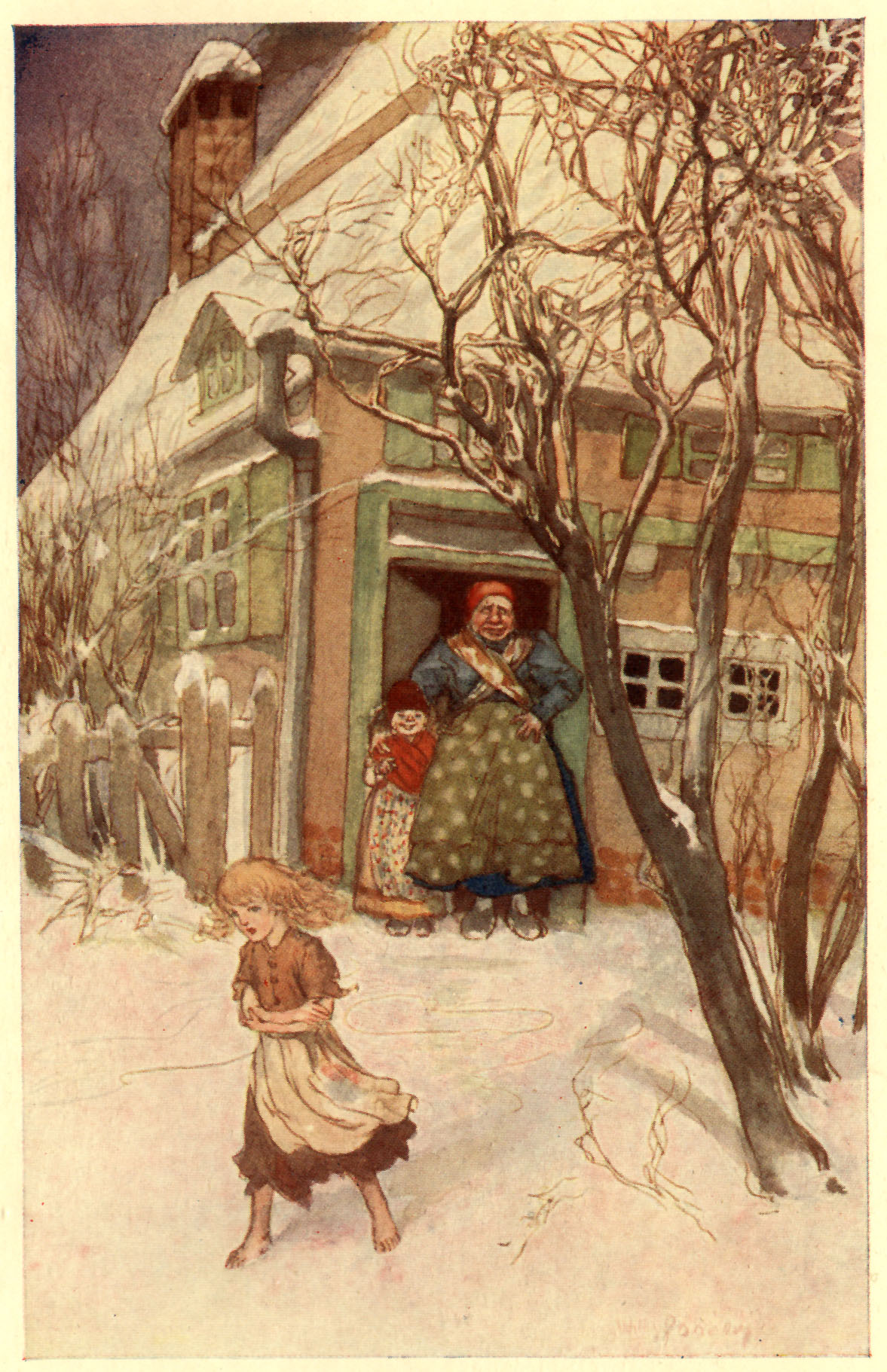
"'DO NOT COME BACK WITHOUT THEM!'"
Clare knew this too, and her heart was faint with fear as she passed through the grove of fir-trees. A cheery little robin hopped down from one of the branches, and sang a few bars of his winter song as if to comfort her; she had gone but a few paces further when she saw the red of his breast repeated in a glimmer of ruddy light in the distance. She hastened towards it, and found it came from a huge fire, round which were sitting twelve strange men. The faces of all were kindly, but while three had long white beards and snowy garments, three had golden beards and long
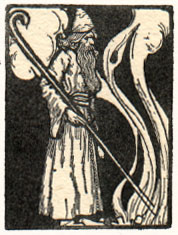 green
garments, three had auburn
beards and yellow garments,
and yet another triplet, with
long black beards, were
dressed in violet. One of
the three whose hair was
frosted looked up as she approached.
green
garments, three had auburn
beards and yellow garments,
and yet another triplet, with
long black beards, were
dressed in violet. One of
the three whose hair was
frosted looked up as she approached.
"May I warm myself at the fire, kind sir?" she asked him timidly, and making room for her at once, he asked her why she wandered in the forest in such bitter weather.
"I was sent to pluck violets for my sister," Clare explained, "and I dare not go home without them, or she would be very angry."
At this her questioner turned to one of the three men who were robed in purple.
"Violets are your concern, Brother May. Cannot you help the poor little thing?" he asked. "She will be frozen to death otherwise, for to-night 'twill be colder than ever."
"To be sure I will," said Brother May, laying a gentle hand on Clare's fair hair; and taking the staff from the white-haired man, he poked the fire.
This was the signal for a most marvellous change in the forest. Ice and snow disappeared, and the air became soft and balmy. Birds sang in the branches overhead, and flowers sprang up as if by magic round the path which Clare had trodden. She filled her hands with fragrant violets, and thanked the brothers for their help.
"You are welcome, dear child," they cried; and the old man took back his staff again, and in his turn poked the fire. Once more it was winter, and Clare hastened home to the cottage as quickly as she could.
Both Laura and her mother were surprised to see her, for they had made sure that she would lose her way. Laura snatched at the violets, only to toss them aside, and was so unkind for the rest of the day that Clare sobbed herself to sleep.
 EXT morning she was again sent
out in the snow. This time it was
to seek wild strawberries in the
forest, and her sister's look was so
full of meaning as she said, "Do
not come home without them!"
that the poor little maiden trembled with fear as well as with cold as she entered the gloomy wood.
EXT morning she was again sent
out in the snow. This time it was
to seek wild strawberries in the
forest, and her sister's look was so
full of meaning as she said, "Do
not come home without them!"
that the poor little maiden trembled with fear as well as with cold as she entered the gloomy wood.
The same friendly robin fluttered across her path, and, following the direction in which he flew, to her great delight she saw again the ruddy glow of the fire. The twelve strange men were still seated round it, and Brother January took her by the hand.
"Why are you here again, poor child?" he asked her gently. "It would surely be wiser for you to stay at home while King Frost reigns over the land, for you are young and tender, and his grip is very cruel."
"I had to come, sir," Clare explained. "My sister said she must have strawberries. We gathered some in June last year."
Brother January turned to a companion dressed in flowing yellow.
"Strawberries are your concern, Brother June," he said. "It is for you now to come to the aid of our little friend."
"I will do so with pleasure," said Brother June, taking the staff held out to him, and giving the fire a vigorous poke. At this, the winter disappeared, the trees sprang into full leaf, and crimson berries were seen amidst the creeping tendrils of the strawberry-plant.
Clare gathered as much of the sweet fruit as she could carry, and once more thanked her friends with a grateful smile.
"You are welcome," they cried in chorus, and as Brother January took back his staff the winter once more spread its mantle over the earth.
Instead of being grateful for the delicious fruit that Clare had brought her, Laura was more vexed than ever to find she had not been eaten by wolves. Her mother too looked at the poor girl angrily, and sent her out to the barn, as if she could no longer bear the sight of her.
Clare was barely awake next morning when she was told that she must go to the forest and bring home some apples for her sister Laura, who had a fancy for them.
"But it's so dark, dear Mother," cried Clare in terror.
"Make haste and go," was the only answer, and as quickly as her numbed fingers would allow her, Clare finished her simple toilet and started on her way.
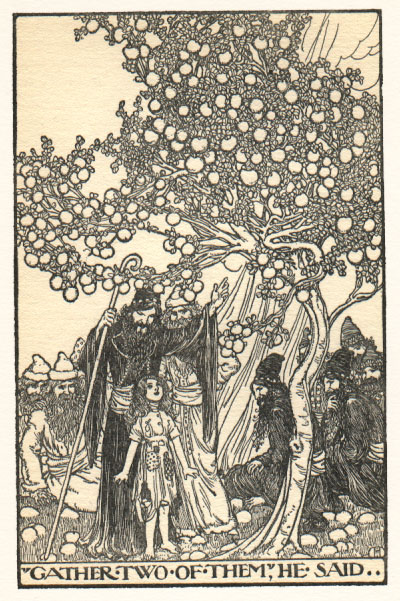
 HE
robin was still asleep, with his head tucked under his wing, but a tiny wood-mouse poked out his
head from his nest in the foot of
a hollow tree, as he heard her footsteps upon the frozen snow.
HE
robin was still asleep, with his head tucked under his wing, but a tiny wood-mouse poked out his
head from his nest in the foot of
a hollow tree, as he heard her footsteps upon the frozen snow.
"If you walk straight on, you will find your friends," he squeaked, and Clare thankfully followed his directions. Before long she was warming herself before the glowing fire, and the brothers were asking with much sympathy why she had been again sent to face the cold.
"'Apples'!" cried Brother January, when she had told them. "Ah! it's your concern now, Brother September."
Forthwith September poked the fire, and, lo and behold! it was cheery autumn, and the ground was strewn with crimson and russet leaves. A tree of wild apples close beside her was laden with fruit.
Brother September turned to the child with a kindly smile. "Gather two of them," he said. Clare picked two of the largest and finest, and when she had done so, September handed back his staff to January; he stirred the fire, and ice and snow reappeared.
Laura made no effort to disguise her disappointment when Clare brought her the two apples. She ate them, however, and finding their flavour most delicious, commanded her to fetch her hood and cloak. In spite of all that her mother could say to dissuade her, she declared that she would go to the forest and gather some for herself.
"I shall find much finer ones than those you brought me, you greedy creature!" she said to Clare as she flounced away, refusing her gentle offer to go with her.
The sun shone brightly on the sparkling snow, and she took the same path that her sister had done. The robin glanced at her from his bright dark eyes, but he did not attempt to sing. He was frightened by something he saw in her face; it was the spirit of greed and envy.
After wandering about for some time, and, to her great disgust, finding nothing whatever in the way of fruit, Laura at last caught sight of the fire, with the twelve little men sitting round. Without a word of greeting, she pushed her way into their midst, and held out her hands towards the glowing embers.
"What do you want?" asked Brother January, somewhat nettled by her rude manners.
"Nothing from you!" she answered roughly, scowling as she spoke. The old man poked the fire in silence, and the sky grew dark, a heavy snowstorm began to fall, and Laura tried in vain to make her way home again, for the great flakes, dropping silently one on another, made the path she had come by impossible to tread. She stumbled at last into a great drift, and was soon buried in its depths.
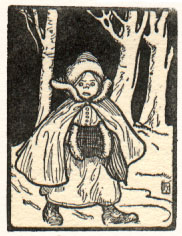 Her mother grew more and more anxious about her as the day wore on, and when afternoon came set out to seek her in the forest. She also found her way to the glowing fire, and pushing aside Brother January just as her daughter had done, proceeded to warm her hands. When asked what she wanted, she gave the same rude answer, with the same result. The old man poked the fire, and the snow fell swiftly and silently. Very soon she too was buried in a glistening bank, and Clare had neither
mother nor sister left.
Her mother grew more and more anxious about her as the day wore on, and when afternoon came set out to seek her in the forest. She also found her way to the glowing fire, and pushing aside Brother January just as her daughter had done, proceeded to warm her hands. When asked what she wanted, she gave the same rude answer, with the same result. The old man poked the fire, and the snow fell swiftly and silently. Very soon she too was buried in a glistening bank, and Clare had neither
mother nor sister left.
With all their faults she had loved them fondly, and it would have been lonely for her in the cottage now, if it had not been for her friends of the forest. As each month of the year came round, one paid her a visit, bringing flowers or fruit, or glorious crimson leaves. The white-bearded men alone came empty-handed, but these sat with her beside the fire, and told her wonderful stories of winter in many lands. In the course of time she became a good and beautiful woman, and wedded a prince from a distant shore.
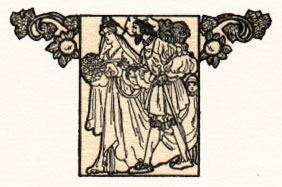
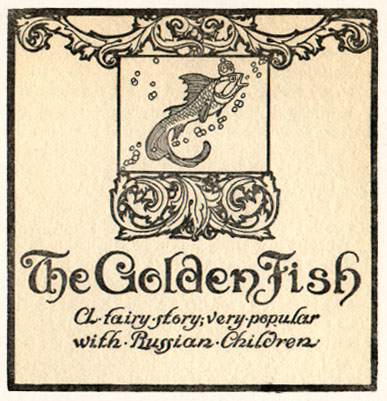
 PON a certain island in the middle of the
sea dwelt an old man and his wife. They were so poor that they often went short of bread, for the fish he caught were their only means of livelihood.
PON a certain island in the middle of the
sea dwelt an old man and his wife. They were so poor that they often went short of bread, for the fish he caught were their only means of livelihood.
One day when the man had been fishing for many hours without success, he hooked a small gold-fish, whose eyes shone as brightly as diamonds.
"Let me go, kind man," the little creature cried. "I should not make a mouthful either for yourself or your wife, and my own mate waits for me down in the waters."
The old man was so moved by his pleadings that he took him off the hook and threw him back into the sea. Before he swam off to rejoin his mate, the gold-fish promised that in return for his kindness he would come to the fisherman's help if ever he wanted him. Laughing merrily at this, for he did not believe that a fish could help him except by providing him with food, the old man went home and told his wife.
"What!" she cried, "you actually let him go when you had caught him? It was just like your stupidity. We have not a scrap of bread in the house, and now, I suppose, we must starve!"
Her reproaches continued for so long that though he scarcely believed what the fish had said, the poor old man thought that at least it would do no harm to put him to the test. He therefore hastened back to the shore, and stood at the very edge of the waves.
"Golden fish, golden fish!" he called. "Come to me, I pray, with your tail in the water, and your head lifted up towards me!"
As the last word was uttered the gold-fish popped up his head.
"You see I have kept my promise," he said. "What can I do for you, my good friend?"
"There is not a scrap of bread in the house," quavered the old man, "and my wife is very angry with me for letting you go."
"Don't trouble about that!" said the gold-fish in an offhand manner; "you will find bread, and to spare, when you go home." And the old man
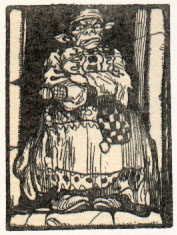 hurried away to see if his
little friend had spoken truly.
hurried away to see if his
little friend had spoken truly.
Surely enough, he found that the pan was full of fine white loaves.
"I did not do so badly for you after all, good wife!" he said, as they ate their supper; but his wife was anything but satisfied. The more she had, the more she wanted, and she lay awake planning what they should demand from the gold-fish next.
"Wake up, you lazy man!" she cried to her husband, early next morning. "Go down to the sea and tell your fish that I must have a new wash-tub."
The old man did as his wife bade him, and the moment he called the gold-fish reappeared. He seemed quite willing to grant the new request, and on his return home the old man found a beautiful new wash-tub in the small yard at the back of their cabin.
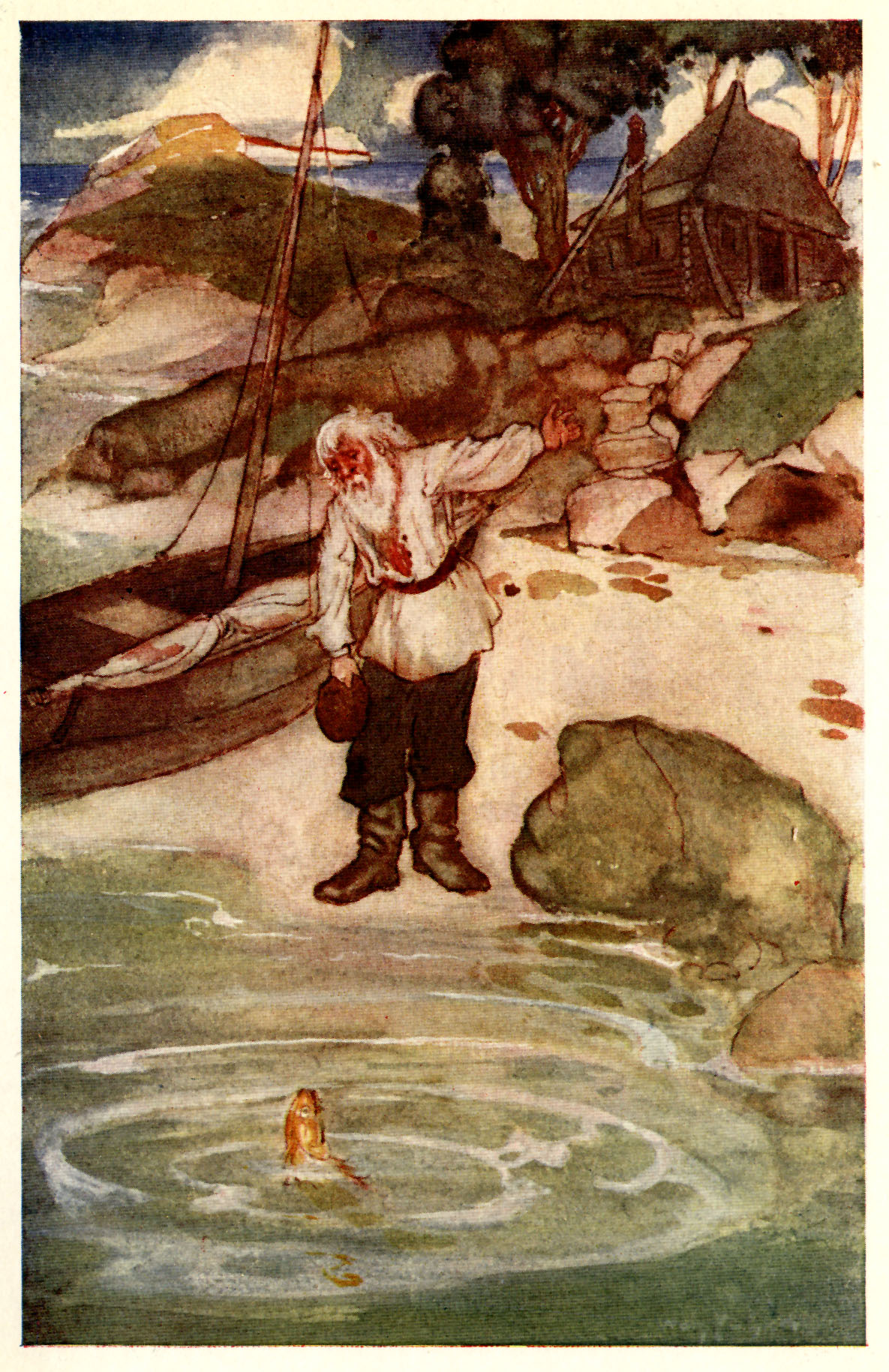
"'YOU SEE I HAVE KEPT MY PROMISE'"
"Why didn't you ask for a new cabin too?" his wife said angrily. "If you had had a grain of sense you would have done this without being told. Go back at once, and say that we must have one."
The old man was rather ashamed to trouble his friend again so soon; but the gold-fish was as obliging as ever.
"Very well," he said, "a new cabin you shall have." And the old man found one so spick and span that he hardly dared cross the floor for fear of soiling it. It would have pleased him greatly had his wife been contented, but she, good woman, did nothing but grumble still.
"Tell your gold-fish," she said next day, "that I want to be a duchess, with many servants at my beck and call, and a splendid carriage to drive in."
Once more her wish was granted, but now her husband's plight was hard indeed. She would not let him share her palace, but ordered him off to the stables, where he was forced to keep company with her grooms. In a few days, however, he grew reconciled to his lot, for here he could live in peace, while he learned that she was leading those around her a terrible life. It was not long before she sent for him again.
"Summon the gold-fish," she commanded haughtily, "and tell him I wish to be Queen of the Waters, and to rule over all the fish."
 HE poor old man felt sorry for the fish if they had to be under
her rule, for prosperity had quite
spoilt her. However, he dared not disobey, and once more summoned his powerful friend.
HE poor old man felt sorry for the fish if they had to be under
her rule, for prosperity had quite
spoilt her. However, he dared not disobey, and once more summoned his powerful friend.
"'Make your wife the Queen of the Waters'?" exclaimed the gold-fish. "That is the last thing I should do. She is unfit to reign, for she cannot rule herself or her desires. I shall make her once more a poor old woman. Adieu! You will see me no more."
The old man returned sorrowfully with this unpleasant message, to find the palace transformed into a humble cabin, and his wife in a skirt of threadbare stuff in place of the rich brocade which she had worn of late. She was sad and humble, and much more easy to live with than she had been before. Her husband therefore had occasion many times to think gratefully of the gold-fish, and sometimes when drawing in his net the glint of the sun upon the scales of his captives would give him a moment's hope—which, alas! was as often disappointed—that once again he was to see his benefactor.
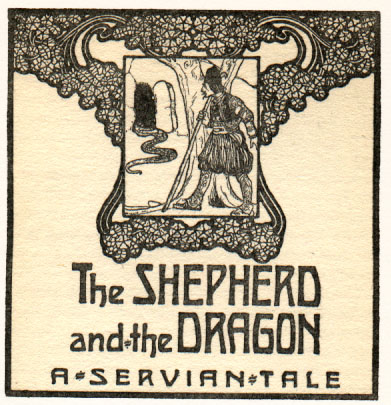
 A LOFTY mountain in Serbia, surrounded by his flock, sat a humble shepherd. The valley beneath him was veiled by a thin white haze, through which he could just see the tips of the stately beeches, on which the frost had already laid his crimson touch. Only the contented munching of the sheep on the close-cropped grass, and the trilling sweetness of a lark's song high up in the blue, broke the placid stillness of the scene.
A LOFTY mountain in Serbia, surrounded by his flock, sat a humble shepherd. The valley beneath him was veiled by a thin white haze, through which he could just see the tips of the stately beeches, on which the frost had already laid his crimson touch. Only the contented munching of the sheep on the close-cropped grass, and the trilling sweetness of a lark's song high up in the blue, broke the placid stillness of the scene.
The shepherd stretched himself, yawning, and gazed at the sea and sky. He had nothing to do just then, and little to think of, for his life flowed on in an even course, and though he often wished that something would happen, he had never been disturbed. He was gazing dreamily at the cottage beyond the sheep-pens, where his wife was busy preparing his dinner, when he saw a dark form gliding stealthily through the grass towards a big bare rock. It was followed by another, and yet another. They were finely-marked serpents with glistening scales, and each bore in its mouth a curious root, with which it touched the rock. More serpents still approached, and did the same, until suddenly the great rock fell asunder, showing a long passage in the ground, into which the serpents glided, one by one. In his eagerness to see what they were after, the shepherd forgot his shuddering dislike of the venomous creatures, and pressed boldly into the rocky gallery. Soon he found himself in a large grotto lit by the gleam of the many precious gems that lined its walls. In its centre stood a magnificent throne of gold, set with emeralds and sapphires, and coiled upon this was an enormous serpent with gleaming eyes. The other serpents gathered round in complete silence; as the shepherd gazed in open-mouthed wonder, the great reptile closed his eyes, and immediately all were asleep.
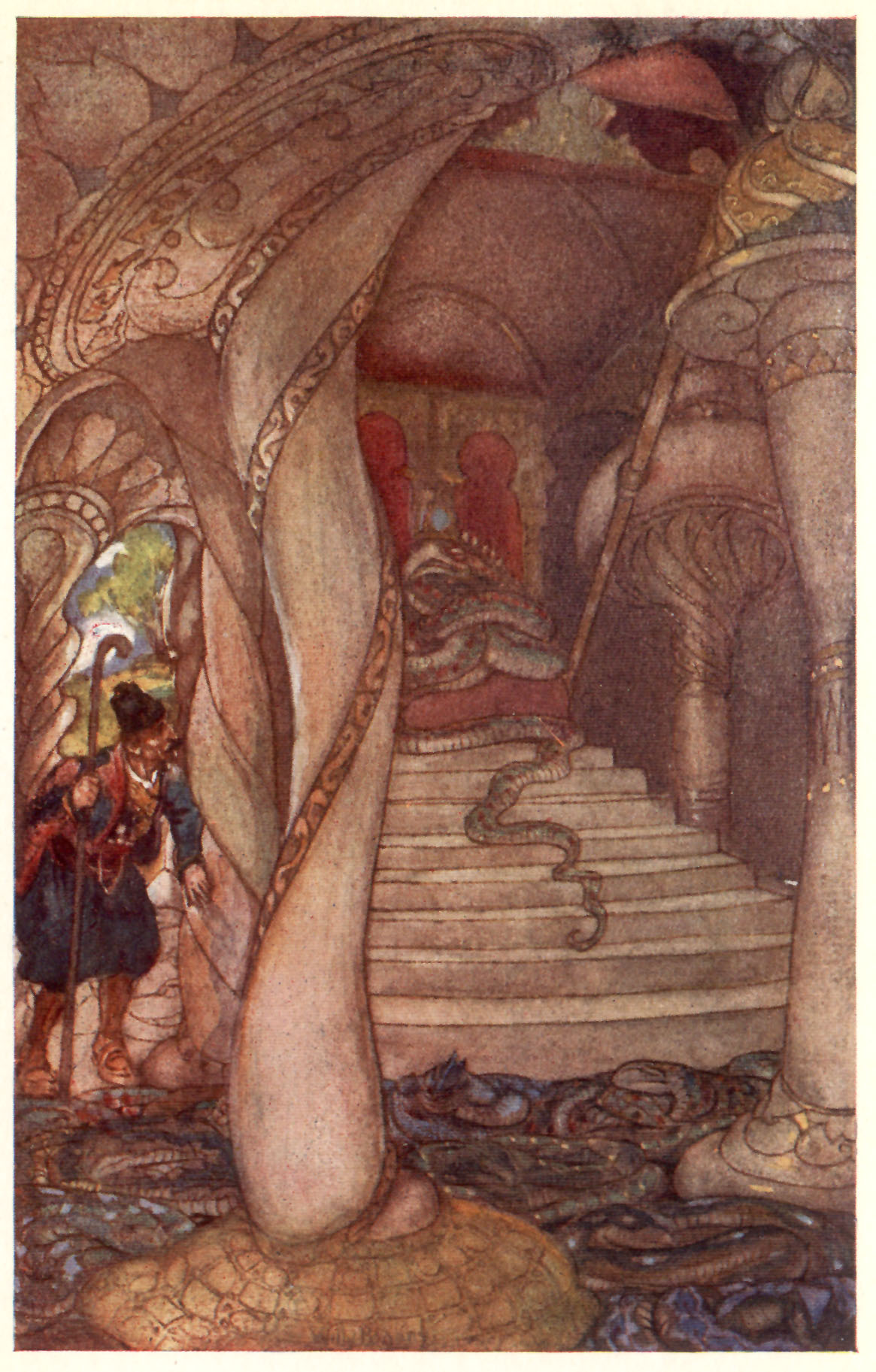
"COILED UPON THE THRONE WAS AN ENORMOUS SERPENT"
The shepherd seized the opportunity to wander round the grotto, examining the jewels with which it was so richly encrusted, and wishing that he could carry away some in his pocket. Finding it impossible to detach them, he thought he had better depart before the serpents awoke, and so he made his way back through the long passage; but the entrance was closed, and he could not get out. Oddly enough, he felt no alarm, and, returning once more to the grotto, laid himself down beside the serpents and fell into a deep slumber.
He was roused by the consciousness that the snakes were stirring. Opening his eyes, he saw that all were gazing with heads erect at their grim monarch.
"Is it time, O King, is
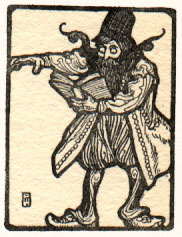 it time?" they cried.
it time?" they cried.
"It is time," he answered after a long pause, and gliding down from his throne, led them through the grotto back to the rock. It opened as he touched it, and every serpent passed slowly out before him. The shepherd would have followed, but the Snake King barred his way with an angry hiss.
"Let me through, I entreat you, O gracious King!" begged the shepherd. "I shall lose my flock if I leave it longer, and my wife will be waiting for me at home."
"You entered our sleeping-place without an invitation, and now you must stay," replied the King; but the shepherd pleaded so earnestly for his release that he was moved to clemency.
"I will let you go this time," he said, "if you give me your solemn promise that you will reveal our hiding-place to no one."
The shepherd was quite ready to do this, and three times in succession he repeated after the Serpent King the words of a solemn oath. This done, he was allowed to pass out of the rock.
The chestnut-trees in the fertile valleys were now a mass of star-white blossom, and the bleating of the lambs told him that spring had come. Greatly bewildered, he hurried towards his home, rather doubtful as to what reception his wife would give him. As he approached the cottage, he saw a stranger standing by the door, and stepped into the shadow of a bush that he might wait unseen until he had gone.
"Is your husband at home?" inquired the man, as the shepherd's wife, looking pale and thin, answered his loud knock.
"Alas! no," was her mournful reply. "I have not seen him since last autumn, when he left me to tend his flock on the mountain-side. I fear the wolves must have devoured him." And covering her head with her apron, she burst into tears. Touched by her distress, the shepherd now came forward.
 AM here, dear wife," he told her joyfully. The woman immediately stopped her weeping, and, instead of bidding him welcome, began to scold with a frowning face.
AM here, dear wife," he told her joyfully. The woman immediately stopped her weeping, and, instead of bidding him welcome, began to scold with a frowning face.
"Where have you been, you lazy fellow?" she demanded. "It was just like you to leave me to get through the winter as best I could. Answer me at once!"
The shepherd could not do this without breaking his oath, and there was something so strange in his manner as he tried to parry her questions that the curiosity of the stranger was aroused.
"Come, come, my good man," he said, "tell your wife the truth, and I will reward you with a piece of gold. Where did you sleep through the winter nights, and what have you been doing?"
"I slept in the sheep-pen," began the shepherd, and the stranger burst into a scornful laugh.
"You need not fancy we are foolish enough to believe that," he said. "Out with it, man! We can see you are hiding something."
Thus pressed, the shepherd reluctantly confessed the existence of the grotto, and the stranger, who happened to be a magician in disguise, forced him not only to guide him thither, but to reveal the manner of entrance. A root that a serpent had discarded lay at their feet, and on touching the rock with this, it opened immediately, and let them through.
The magician coveted the splendid jewels that lined the walls of the grotto as much as the shepherd had done, and conned through the book of spells that he drew from the folds of his garment to see if it would tell him how to gain possession of the rich store.
"I have it!" he exclaimed. "I shall now be rich as the heart of man can desire, and you, good shepherd, shall share my wealth."
Replacing his book, he was about to set fire to a small pellet which he produced from his pocket, when he was interrupted by a terrible hiss. Unseen by the intruders, the King of the Serpents had followed in the form of a Green Dragon, and now reproached the shepherd with much violence for having broken his oath.
His rage was so great that the shepherd thought his end had come.
"Throw this over his head," muttered the magician in his ear, handing him a rope.
Despite the trembling of his hand, the shepherd made a cast which was successful, and as the loop encircled the neck of the King, the rock burst asunder with a loud report that echoed from hill to hill. The next moment the shepherd found himself flying through space on the back of the Green Dragon. Such was the speed at which the wings of the fiery creature clove the air that the rushing of the wind in his rider's face was painful to endure.
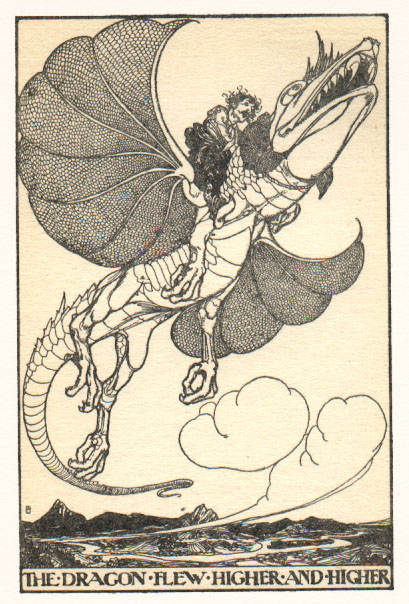
They went over mountains and over seas, over desert lands where sandstorms raged and vultures lay in wait for the fainting camels, until at last they came to a wide plain watered by many rivers. The Dragon flew higher and higher, until the shepherd grew dizzy and lost his breath. His eyes were closed, but in the blue sky above him he could hear the sweet clear notes of a soaring lark.
"Dear bird," he cried, "thou art precious to thy Master, Who made us all. Fly up to Him, I pray thee, and beg Him to send me help in my sorry plight."
The lark flew up to Heaven as he had bidden her, and returned with a green leaf from a tree in Paradise in her tiny beak. Gladly she dropped this on the Dragon's head, and as it touched him he fell to the ground and became once more a crawling serpent.
When the shepherd regained consciousness, he was on the mountain-side, with his flocks around him, and his faithful dog at his feet. The forest was still in its autumn glory of yellow and gold, and in the distance he could see his wife beckoning to him from his cottage door.
"I must have been dreaming," he said, as with thankful heart he went home to his dinner. He lived to a ripe old age in peace and quietness, and never again did he wish that something strange would happen.
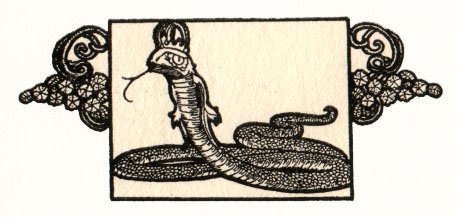
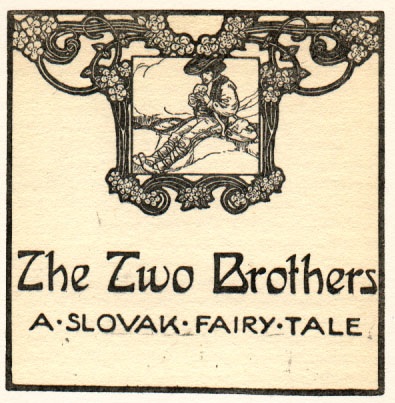
 IS
the story of Yoska and Yanko, two brothers who were as unlike each other as night is unlike day. Each was tall and straight, with handsome features and thick dark locks, but while Yoska was mean and selfish, Yanko had a kindly disposition and a generous heart, and never saw a fellow-creature in distress without trying to help him.
IS
the story of Yoska and Yanko, two brothers who were as unlike each other as night is unlike day. Each was tall and straight, with handsome features and thick dark locks, but while Yoska was mean and selfish, Yanko had a kindly disposition and a generous heart, and never saw a fellow-creature in distress without trying to help him.
Their father was very poor, and as years went on, and he saw no prospect of his circumstances mending, he thought that the time had come for one of his sons to seek his fortune. As was only to be expected, he felt that Yoska could be the better spared, so, giving him his blessing, he bade him depart.
Yoska was glad to leave home, for he hated work, and was an idle fellow.
"Now, at least," he thought to himself, as he set off gaily, his pockets bulging with the cakes that were his mother's parting gift, "I can please myself as to when I get up. There will be no rising early in the winter-time to look after the cows, or feed the chickens. I can do just as I please all day."
Having walked a long distance and crossed a mountain, he came to a wide prairie, shaded here and there by luxuriant trees. Seating himself under one of these, he drew out some of his cakes, and gobbled them down like a greedy child.
"Won't you spare us a morsel, kind sir?" asked two little ants, running over his hand. He shook them off roughly with an angry snarl.
"Not a crumb!" he said, putting out his foot as though to crush them.
"You are not very generous, Yoska," cried the tiny creatures, as they hurried out of his reach. "When you want our help, you will go without it."
"Wait till I ask for it," was his retort; and he munched his cakes more greedily than ever. Soon after he resumed his walk, and came to the banks of the river, where a little fish lay panting on the
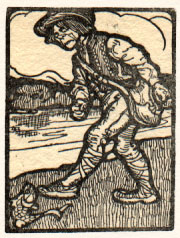 rough earth.
rough earth.
"Won't you help me?" he cried. "Put me back into the river, and I will bless you, for I must perish if I stay here."
Yoska's only reply was to kick it aside; nevertheless, with a great effort, the fish managed to jump into the stream.
"Cruel youth," he cried, "You will never prosper. No fish will help you in your hour of need."
Yoska paid no more heed to the fish than he had done to the ants, but marched straight on. By and by he reached a spot where four roads crossed, and here a group of goblins were quarrelling angrily, striking each other with puny fists, and contorting their tiny faces into queer grimaces. Without attempting to pacify them, or even to find out what was the matter, Yoska pushed them aside. This made the little men so angry that they stopped their quarrel to reproach him for his callousness.
"You are a selfish fellow," they squeaked, "and nothing that you do will prosper."
This prediction was well fulfilled, for though Yoska travelled over many countries, and met men and women of all sorts and kinds, he did not succeed in making his fortune, and returned to his home as poor as he had left it. His mother, good soul, said nothing, but his father upbraided him for his want of success, and grieved to think that now he must part with Yanko, since he could not find food for both.
"Never fear, dear Father," said Yanko tenderly, as he thanked him for the phial of magic fluid he had just received as a parting gift. "If I do not make my own fortune, I will make yours, and you and my mother shall live in comfort for the rest of your days."
He started in high spirits, whistling a merry tune as he swung along, and stopping now and then for a moment to admire the rich deep blue of the sky, or the cunning nest of some little bird.
When he became weary, he seated himself on a cushion of moss by the roadside, and began to eat the loaf of bread which was all that his mother could afford to give him when he bade her farewell. He was soon surrounded by a troop of ants.
"We are hungry also," they cried. "Will you not let us share your meal?"
"Willingly," he answered, scattering crumbs with a liberal hand.
 OOD Yanko!" they exclaimed,
as they bore them away to the ant-hill. "If you ever want help, you will know where to come for
it. We are your friends from this time forward."
OOD Yanko!" they exclaimed,
as they bore them away to the ant-hill. "If you ever want help, you will know where to come for
it. We are your friends from this time forward."
Yanko felt inclined to smile at the idea of being helped by such tiny creatures, but he was far too kind to hurt their feelings, and thanked them gratefully for their promise.
Towards the close of the afternoon he reached a still, blue lake. A ray from the setting sun made a pathway of gold across it, and fell on a poor little fish that lay on the bank with quivering sides as it panted for breath. Without waiting to be asked, Yanko immediately picked it up, and put it back into the water.
"Good fellow!" it gasped, ere it disappeared beneath the shining stream. "If ever you are in need of help, call on the fish, and some of us will come to your rescue."
Yanko laughed to himself as he went his way, but he was glad that he had happened to pass the lake at the right moment. The birds were singing their vesper hymn, and the landscape was flooded in rose-coloured light, as he neared the four crossroads. The sound of squeaking, angry voices made him hasten his steps.
"What is wrong, little people?" he asked in his gentlest tones, when he came up with the same goblin crowd whom we have met before. "You are surely not going to quarrel on such a lovely evening! Shake hands and make friends before I wish you good-night."
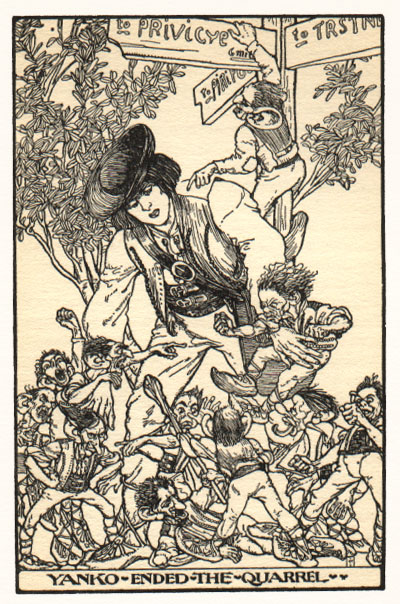
The goblins' frowns and grimaces changed into merry smiles as they patted each other on the back and declared they were "only pretending."
"You are a very good fellow, dear Yanko," they said, just as the fish had done, "and whenever you need our help you have only to call us, and we will come."
Yanko trudged on happily until he came to a town, where he was distressed to find the inhabitants in the deepest grief. The daughter of their good King, whom all adored, lay at the point of death. The court physicians had wrung their hands, declaring they could not cure her, and signs of mourning were in every face. Yanko listened to all they had to say with never a word in reply, and then entered the nearest inn.
"I would talk with your master," he said to the buxom maid who came forward to ask his pleasure. When her master appeared, Yanko drew him on one side and begged him to make his way with all speed to the palace.
"Bear word to his Majesty the King," he said, "that a great physician awaits his summons."
"A great physician?" echoed the landlord, looking curiously at the slim youth who stood before him.
"I am the greatest physician in the world," declared Yanko solemnly, "and can cure the Princess if his Majesty will allow me."
So saying, he retired to the parlour of the inn, and the landlord hurried to the palace.
The King received the news with joy, and sent an escort at once for Yanko.
"Sir Doctor," he said, as he received him in the great audience-chamber, whose walls were of pale green marble, with a ceiling of pure gold, "if you can cure my beloved daughter, you shall have her hand in marriage, and any other reward that you may demand."
Yanko was then ushered into the room of the sick Princess, and when he saw her exceeding loveliness, he desired nothing better than to become her husband. Her hair spread over her pillows like a mantle of woven sunbeams, and her heavy lids veiled eyes of the purest violet. Her slender hands were as fair as lilies, and her dimpled chin looked fit for an angel's kiss. Lifting her head on his strong young arm, he parted her unconscious lips that he might give her some of the precious fluid with which his father had entrusted him, for he knew that this was the Water of Life.
 HE first drop revived her; at the second she stirred faintly, and at the third she opened her violet
eyes. Seeing a stranger bending
over her, and that stranger a young man, she drew back haughtily, and demanded of her attendants what he was doing in her room.
HE first drop revived her; at the second she stirred faintly, and at the third she opened her violet
eyes. Seeing a stranger bending
over her, and that stranger a young man, she drew back haughtily, and demanded of her attendants what he was doing in her room.
"He is the greatest physician in the world," they murmured, "and will quickly cure your Royal Highness of your sad sickness."
But the Princess declared that she did not wish to be cured, and obstinately refused to swallow any more of the Water of Life. It was only at her father's tearful entreaty that she at last consented to do so, and when she heard, on her recovery, the reward that the King had promised, her maidenly indignation knew no bounds.
"If I break my word to this great physician," her father pleaded, "my people will no longer have faith in me. I pray you, dear daughter, give way to me in this one thing. He is a comely youth, and will make you a good husband."
The Princess had ever been a loyal and devoted daughter, and seeing the justice of her father's plea, she at last consented to marry Yanko, provided that he carried out three conditions.
"Whatever you ask me, that will I do," declared the enamoured youth, and the Princess did not look so very angry as she met his ardent gaze. Calling for a sack of cinders and a sack of grain, she mixed these thoroughly together, strewing them on the ground.
"If you can separate the cinders from the grain before the first sign of dawn, I will be your wife," she said, and left the room with her maidens.
Yanko saw at once the difficulty of the task, but in spite of this he did not despair. In order that he might think in peace, he repaired to a green field, where he threw himself down under a spreading oak-tree, and knit his brow in a puzzled frown. He was hardly seated when a number of ants ran over his foot.
"Do not look so perplexed, dear Yanko," remarked their leader. "You were kind to us when we were hungry, and now we will serve you equally well."
With this they trooped off to the palace, and by the time that Yanko returned, the grain and the cinders were neatly separated, and replaced in their respective sacks. The Princess did her best to appear disappointed, but in her heart she was not ill-pleased.
"You have fulfilled my first condition," she said ungraciously, "but the second and third are more difficult. Fetch me the largest pearl in existence."
Yanko bowed and left the palace, feeling this time at his wits' end. Without thinking where he was going, he wandered on until he came to the lake. The little fish popped up its head and asked why his face was troubled.
"If it's a pearl you want, my friend," he said, when Yanko had told him of the second condition that the Princess had made, "I can bring you the finest that is to be found." He darted down to the bed of the lake, and a moment later returned to the surface of the water, holding in his mouth the largest and most lustrous pearl that Yanko had ever seen. Having thanked the little creature warmly, the youth returned to the palace; and now the Princess permitted herself to smile.
"It is lovely indeed," she said, as she bound it in the gold of her hair.
"What shall I bring you next?" asked Yanko tenderly, venturing to take her hand. She did not draw it away until he had raised it to his lips, when she told him in mischievous tones to bring her a rose from Hades.
That night he walked for many miles under the starlit sky, for his heart was sick for love of the fair Princess, and he could not think how he was to get that rose. If he had only known that she too was sleepless, it would have cheered him greatly, though he already guessed that she was not so indifferent to him as she would have it appear.
While still musing on her loveliness, he reached the spot where he had seen the goblins. To his surprise, he found they were still there, and before he had time to speak they had swarmed around him.
"Tell us how we can help you," they cried in chorus. "We know you are in trouble by the way you stare at the
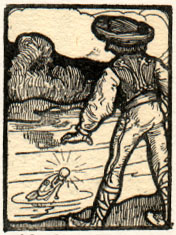 moon."
moon."
When they heard of the wish of the fair Princess for a rose from Hades they bade him not despair, but wait at the crossroads until the magic hour of sunrise. As the mist on the hills turned from grey to purple, and the first thrush raised her morning song, the eldest goblin reappeared, and, laying a crimson rose at Yanko's feet, told him that he had had some difficulty in finding it in Hades, since it was the flower of Hope. He had plucked it from the breast of an old, old man, he said, who had learnt to see that good might come out of evil, even as dawn from night.
Yanko carried the rose to the palace, and when the Princess saw it she very sweetly gave him her hand. Yanko had no need to press her to fulfil her promise, and at the marriage ceremony, which shortly after took place amidst general rejoicing, she was the most willing of brides. The bridegroom's parents, and his brother Yoska, were all three invited to the wedding; and when the latter heard how Yanko had won his beautiful bride, he realised that selfishness does not pay, and that even the smallest and meanest of creatures may sometimes be of service.
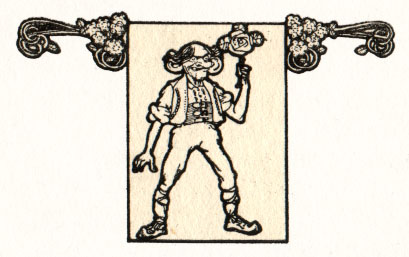
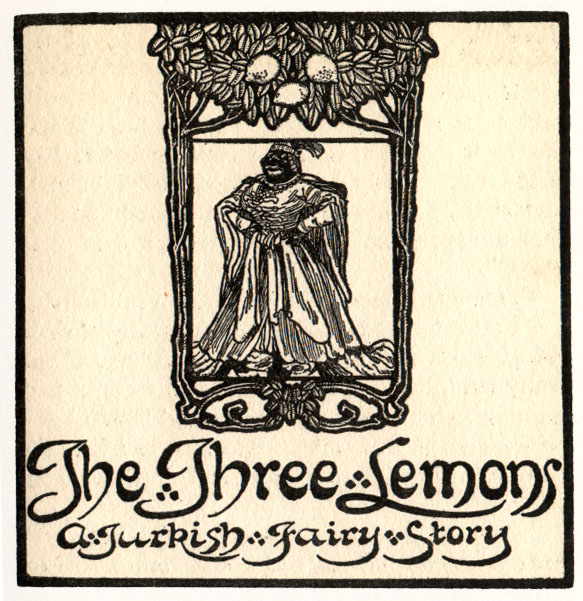
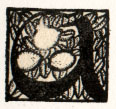 CERTAIN Sultan had a son of whom he was justly proud, for the young man was handsome and gay of temper, and had never been known to do an unworthy action. In the circle of the court he was the brightest star, and very sweet were the glances thrown him by the high-born ladies who served the Sultan. The Prince was courteous to them all, but he favoured no one, and as years went on, and he showed no signs of taking to himself a wife, the Sultan became disturbed.
CERTAIN Sultan had a son of whom he was justly proud, for the young man was handsome and gay of temper, and had never been known to do an unworthy action. In the circle of the court he was the brightest star, and very sweet were the glances thrown him by the high-born ladies who served the Sultan. The Prince was courteous to them all, but he favoured no one, and as years went on, and he showed no signs of taking to himself a wife, the Sultan became disturbed.
"My son," he said, "why do you not choose a bride? It is time you were married, for I should like to see you the father of children before I go to my rest. Surely it would be easy to find a mate amidst these fair women you see around you? I should experience no difficulty were I in your place."
The young Prince looked at him thoughtfully.
"I must have something more than any of them can give me, my father," he replied, "and if you really wish me to take a wife, I will go on a long journey, perhaps even round the world, and seek a princess whom I can love. She must be fair as the morning, white as the snow, and as pure as an angel."
"Well said, my son," replied the Sultan. "I wish you good fortune and a safe return." And without more ado the Prince departed.
The air was crisp with frost, and the glittering crystals of the snow threw back the radiance of the sunlight from bank to meadow. The waves that tossed and tumbled on the distant shore seemed to beckon him towards them, so he hastened to the coast, where he found a splendid vessel resting at anchor. While he was yet wondering how it had come there, and whither it was bound, invisible hands drew him on board, and, as his feet touched the deck, the anchor lifted, and the ship set sail.
For three days and three nights it glided swiftly over the sea, steered by a shadowy pilot who spoke no word. On the morning of the fourth day it came to a stop beside a little islet, and the Prince was amazed to see his favourite horse issue from the hold, ready saddled and bridled. Concluding that he was expected to land, he led the horse on shore, and when he turned round to take another look at the ship, it had completely vanished.
No sign of any habitation was to be seen, and the cold was so intense that he could scarcely hold the reins. In spite of this, he rode on and on, till at last he reached a small white house that stood by itself on the top of a hill, unsheltered from the wind. He knocked at the door with eager haste, hoping for the glimpse of a fire, and perhaps some food. His summons was answered by a venerable
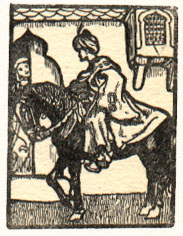 woman
with scanty hair like wisps
of snow, who stared at him
inquiringly.
woman
with scanty hair like wisps
of snow, who stared at him
inquiringly.
"I seek a wife, good mother," said the Prince. "She must be the most beautiful princess in the world, and as good as she is beautiful. Can you tell me where to find her? "
The old woman half shut the door. "You will not find her here," she said, "for I am Winter, and this is my kingdom. My sister Autumn perhaps may help you, but I have no time for thoughts of love. You will find her if you go straight on."
The Prince thanked the old lady, and remounted his horse, hoping that Autumn would at least give him rest and refreshment. After a while he found that the snow had disappeared, and that luscious fruit now hung in clusters from the trees. The stubble of the corn tinted the fields with gold, and the squirrels were busily engaged in storing nuts for the winter. A little further on he came to a small brown house beside a wood, and, again dismounting, he knocked at the door. It was opened by a woman with abundant dark hair and eyes like sloes. Her cheeks were ruddy, and her look was kind; she did not, however, ask him in.
"What are you seeking, young man?" she inquired in a gentle voice.
"I seek a wife," he answered briefly.
"Ah," she exclaimed, "then I cannot help you. My name is Autumn, and I am far too busy gathering fruit to have time to spare for such things as love and marriage. My sister Summer is full of dreams, and she may find you what you want."
So saying, she shut the door, and as there was nothing else for him to do, the Prince resumed his journey.
 E noticed ere long that the grass by the roadside was very tall,
and that the fields were heavy with corn ready for harvest.
The air was so warm that it touched
his cheek caressingly, and the
sun shone down so hotly that he was fain to unloose his coat. He was very glad when at last he saw a small yellow house shaded by a group of trees. As he knocked at the door, he heard the sound of a distant waterfall, and the hope of quenching his thirst was more in his mind just then than the fairest wife in Summer's kingdom. His summons was answered by a stately woman crowned with auburn tresses.
E noticed ere long that the grass by the roadside was very tall,
and that the fields were heavy with corn ready for harvest.
The air was so warm that it touched
his cheek caressingly, and the
sun shone down so hotly that he was fain to unloose his coat. He was very glad when at last he saw a small yellow house shaded by a group of trees. As he knocked at the door, he heard the sound of a distant waterfall, and the hope of quenching his thirst was more in his mind just then than the fairest wife in Summer's kingdom. His summons was answered by a stately woman crowned with auburn tresses.
"I am sorry I cannot help you," she said, when he had told her the object of his journey, "for I too am very busy. Hasten you to my sister Spring; she is the friend of lovers, and will surely aid you."
So the Prince went on till he saw a little green house in a bower of lilac. Hyacinths and violets, jonquils, narcissi, and fragrant lilies-of-the-valley bloomed beneath the windows, and, when he knocked at the door, a little lady with flaxen hair, and eyes of soft deep violet, appeared on the threshold.
"Won't you take pity on me?" he asked her eagerly. "Your sisters sent me on to you. I seek a wife, who must be fair as the morning, white as the snow, and pure as an angel from Heaven."
"You ask a great deal," Spring told him, smilingly, "but I will do my best for you. Come in and rest—you must be tired and hungry." And to his great delight she ushered him into a long, low room, filled with the scent of flowers.
When he had feasted on bread and honey, and quenched his thirst with sweet new milk, she brought him three fine lemons on a crystal tray. Beside them was a handsome silver knife, and a quaint gold cup of rare design.
"These are magic gifts," she said, "so guard them carefully. Return at once to your own home, and make your way to the great fountains in the palace gardens. Having made quite sure that you are alone, take your silver knife and cut open the first lemon. As you do so, a lovely princess will instantly appear, and will ask you to give her water. If you at once offer her some in this golden cup, she will stay with you and be your wife, but should you hesitate, even for the space of a second, she will vanish into thin air, and you will never see her again."
"I am not likely to be so foolish," said the Prince, "but if I do, shall I have no wife at all?"
"You must then cut open the second lemon," Spring answered gravely, "and exactly the same thing will occur. If you hesitate this time also, and she too disappears, you will have one more chance with the third lemon. Should your wits fail you a third time, you will die without a mate."
 HE Prince would have thanked
her for her kindness, but she
waved him away with a smile and a sigh, telling him not to delay.
Full of joyful anticipation, he rode once more through the kingdoms
of Summer, Autumn, and Winter, and when he arrived at the coast found the same stately vessel awaiting his pleasure. The wind was favourable on his homeward voyage, and in a very short time he had once more gained the precincts of his father's palace. Giving his horse into the care of a groom, he hurried into the great gardens, and, when he had filled Spring's gold cup with water from the splashing fountains, cut open the first lemon. He had no sooner done so, than a most exquisite Princess appeared before him, and with a timid glance asked him to give her water.
HE Prince would have thanked
her for her kindness, but she
waved him away with a smile and a sigh, telling him not to delay.
Full of joyful anticipation, he rode once more through the kingdoms
of Summer, Autumn, and Winter, and when he arrived at the coast found the same stately vessel awaiting his pleasure. The wind was favourable on his homeward voyage, and in a very short time he had once more gained the precincts of his father's palace. Giving his horse into the care of a groom, he hurried into the great gardens, and, when he had filled Spring's gold cup with water from the splashing fountains, cut open the first lemon. He had no sooner done so, than a most exquisite Princess appeared before him, and with a timid glance asked him to give her water.
"I am thirsty," she murmured. "Will you not let me drink from your golden cup?"
The Prince was so lost in admiration that he could only gaze at her, and with a gesture of reproach the lovely maiden vanished. It was in vain that he lamented his stupidity. Do as he would, he could not call her back again, and with many regrets he cut the rind of the second lemon. Once more the gleaming spray of the dancing fountains took the form of a beautiful girl.
"Fair as the morning and white as snow!" cried the Prince in rapture, too delighted to heed her request for a cup of water. He did not regain his senses until she also had disappeared, when he again bewailed his neglect of Spring's injunctions. With trembling fingers he inserted the silver knife into the third lemon, and as the pungent odour of the golden fruit escaped into the air another Princess appeared before him. Closing his eyes, lest they might be dazzled by her exceeding beauty, he immediately offered the golden cup. The maiden raised it to her lips with a bewitching smile, and drained it to its dregs. The Prince laughed aloud for joy; now at last he had found the bride he sought.
No summer morning was fairer than she, for the whiteness of snow gleamed on chin and brow, and her expression was pure and gentle as an angel's. Drawing her down beside him on to a flowery bank, he held her hand and looked into her eyes.
"Will you be my wife?" he whispered, and to his delight she answered, "Yes."
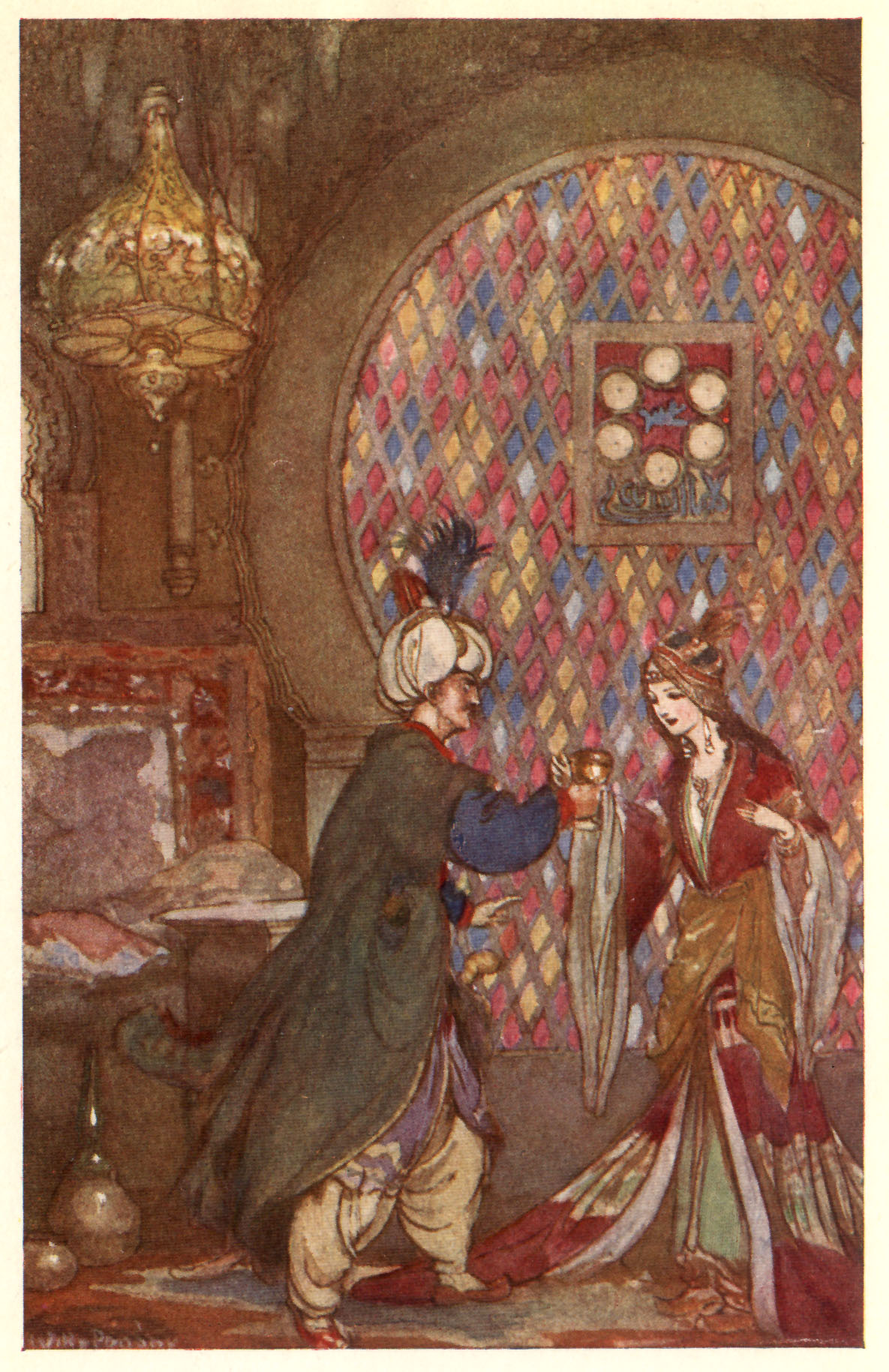
"HE IMMEDIATELY OFFERED THE GOLDEN CUP"
When his first raptures were over, he noticed, with some disappointment, the simplicity of his bride's gown. It was of some simple stuff the colour of running water, and hung in long flowing folds round her lissom form. No necklace broke the outline of her dainty throat, and she looked so different from the maidens of the court that the Prince, who, after all, was only a man, and not, perhaps, a very wise one, felt that something was lacking to complete her beauty.
"Your robe is not worthy of you, dear love," he cried. "If you wait for me here, I will fetch you one of rich white satin from my father's palace, and a rope of pearls to twine around your neck."
But the Princess knew that she needed no ornaments to enhance her beauty, and she did not wish him to leave her. Her lover, however, was so insistent that she consented to stay by the fountains while he went home, and, more in love with her than ever, he hurried away.
Now the Princess was very timid, and as the Prince tarried long she grew frightened of being alone. So she stretched out her arms to a tree above her, and swung herself up that she might nestle amidst its branches. The foliage hid her slender limbs in their flowing draperies, but her exquisite face gleamed like a flower from a setting of glossy leaves, and was mirrored in the deep basin of the fountains. An ugly negress who came to fill her pitcher caught sight of its loveliness, and, since she had never gazed into a mirror, believed it to be her own.
"Oh, how very handsome I am!" she murmured. "I am far too beautiful to do the bidding of any mistress. I will never draw water again." And flinging the pitcher from her, she strutted home with the air of a peacock.
"Why have you come back empty-handed, Deborah?" inquired her mistress.
 HAVE seen my face in the fountain," was the reply, "and I am
much too lovely to fetch and carry
like a poor slave."
HAVE seen my face in the fountain," was the reply, "and I am
much too lovely to fetch and carry
like a poor slave."
"Why, you are as ugly as sin!" her mistress retorted sharply. "Go back at once, and do as you are told."
Deborah fetched another pitcher and went back to the fountains, grumbling the while. Again she caught sight of the Princess's face reflected in the water, and again her swarthy features became distorted with pride.
"It is true!" she cried. "I am lovely as a dream. I will marry a prince, and live in a palace." With this she threw down the second pitcher, and flounced into her mistress's presence with such an assumption of dignity that that lady burst out laughing.
"If you only knew how ugly you are," she cried, when she could speak, "you would never talk such ridiculous nonsense." And daring her to return again without the water, she handed the mortified woman a third pitcher and sent her back to the fountain.
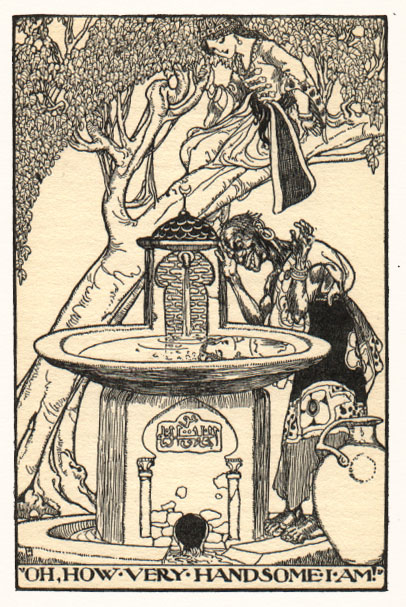
The flower-like face of the fair Princess smiled back at the angry negress as she bent over the pool, and the poor creature grinned and ogled.
"But I am handsome," she cried triumphantly. "As handsome as a queen."
She spoke so loudly that the Princess heard her, and her laugh rang out like a peal of bells. Looking hastily up, the negress saw her in the branches, and disappointed vanity rendered her almost speechless.... Her mistress was right then, after all, and the lovely vision she had seen in the water was not the reflection of herself. As she stared upward with dilated eyes, there came to her thoughts of revenge.
"I will make her suffer for this," she murmured, but wreathing her wide lips in a false smile, she bade the Princess "Good morrow."
"Why do you hide in a tree, lovely lady?" she asked her gently.
"I am waiting for my Prince, who has gone to fetch me a satin robe, and a rope of pearls to twine round my neck," answered the Princess shyly.
"Your golden hair has been tossed by the wind," remarked the negress. "Let me come up beside you, and I will make it smooth. It will not do to look untidy when your Prince arrives!"
"How kind you are!" said the Princess, and as she bent her silken head towards the negress, the treacherous woman stabbed it with a long sharp pin.
The Princess fell back, faint with pain, but before her body could touch the ground she turned into a snow-white pigeon, and flew off uttering plaintive cries.
The negress took her place in the tree, and when at last the Prince appeared, bearing a satin robe and a bridal veil, it was she whom he saw looking down on him.
 HERE is my sweet Princess?" he asked. "She is fair as the morning, and white as snow. What have you done with her?"
HERE is my sweet Princess?" he asked. "She is fair as the morning, and white as snow. What have you done with her?"
"Alas! dear Prince," answered the negress sadly, "while you were away an enchantress came and changed me into my present form. When you have proved your love by making me your wife, I shall, in three days' time, once more become a fair and beautiful Princess; but if you desert me, I must remain for ever hideous."
Although the sight of her filled him with repulsion, the Prince was a man of honour, and would not break his word. Calling the ladies who were waiting in the carriage which he had brought to convey his bride to the palace, he bade them array her in the satin gown, and, pretending not to see their astonishment and disgust, drove back with her to his father, introducing her as his promised wife.
The Sultan was naturally horrified at her appearance, but when the Prince explained to
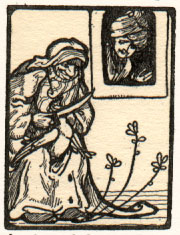 him how matters stood, he agreed that he must marry her,
and hope for the best.
him how matters stood, he agreed that he must marry her,
and hope for the best.
While the father and son talked thus together, the negress wandered over the palace, giving unnecessary orders to the servants, and making herself hateful to all. She even ventured into the great kitchens, and commanded the chief cook to prepare rich viands for her wedding ceremonies. As she issued her orders in a loud, harsh voice, she passed by the window, and noticed a slim white pigeon sitting on the sill.
"Kill me that bird," she cried, "and cook it for my supper."
Not daring to disobey her, the chief cook killed it immediately, plunging a sharp knife into its snowy breast. Three drops of blood fell from the windowsill into the courtyard, and a tiny seedling sprang from each of these. As if a fairy had waved her wand, they grew into trees of fragrant blossom, and in an instant the blossom turned into golden lemons.
Meanwhile the Prince was seeking for his bride, for since he had set himself so distasteful a task, he wished to perform it well.
"She is in the kitchen, your Royal Highness," he was informed by one of his shocked courtiers, and in going to meet her, the Prince passed under the lemon-trees. The sight of their fruit brought him a ray of hope, and gathering three of the finest that he could find, he hastened with them to his own room, where, having filled the golden cup with water, he plunged the blade of the silver knife into the rind of the first lemon.
As before, a beautiful girl appeared, and stretched out her fair hands for the golden cup.
"Ah, no!" he cried. "You are very charming, but you are not my Princess."
He cut the rind of a second lemon, and as he did so the second Princess took form before him. He shook his head at her mute entreaty for a cup of water, and she too disappeared. Then he cut the rind of the third lemon, and lo, his own Princess was once more in his arms!
 REAT was the joy and relief of the old Sultan when he heard from the Prince that this beautiful girl was his real bride, but he listened with a frown of anger as she told them all that had happened when her lover left her by the fountain. He ordered the negress to be immediately brought before him, and, regarding her very sternly, asked her what she would
think a fitting punishment for an affront offered to the future wife of his dear son.
REAT was the joy and relief of the old Sultan when he heard from the Prince that this beautiful girl was his real bride, but he listened with a frown of anger as she told them all that had happened when her lover left her by the fountain. He ordered the negress to be immediately brought before him, and, regarding her very sternly, asked her what she would
think a fitting punishment for an affront offered to the future wife of his dear son.
"Nothing less than death," declared the negress, "and death by burning. Let the offender be cast into your Majesty's oven, and the great door shut."
"Madam, you have passed sentence on yourself," replied the Sultan dryly, and, shrieking with terror, the negress was led away.
But the sweet Princess would not let her suffer.
"She is but a poor ignorant woman," she said, "and it must be sad to be so ugly. Set her free, I entreat you, and let her go. This is the boon I ask you for my wedding gift."
The Sultan could not refuse his new daughter's first request, and the Prince regarded her fondly.
"I saw you were fair as morning, and white as snow," he murmured, "and now I know that you are sweet as an angel."
And though the years to come brought him trouble and sorrow as well as joy, he was indeed blest. Beloved of all, his Princess wielded a gentle sway, and he never saw the fruit of a lemon without sending a grateful thought to Spring for the magic gifts by which he had fared so well.
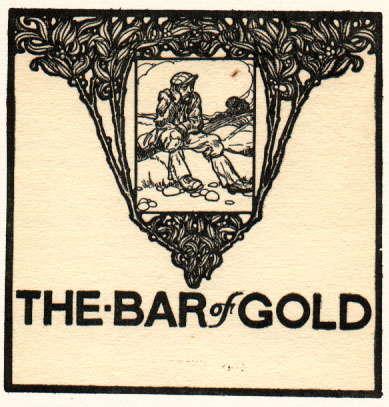
 ONG years ago there lived a poor labouring man who never knew what it was to sleep in peace. Whether the times were
good or bad, he was haunted by fears for the morrow, and this constant worrying caused him to look so thin and worn that the neighbouring farmers hesitated to give him work. He was steady and frugal, and had never been known to waste his time in the village inn, or indulge in foolish pleasures—in fact, a worthier man could not be found, and
his friends agreed in saying that he certainly deserved success, though this never came his way.
ONG years ago there lived a poor labouring man who never knew what it was to sleep in peace. Whether the times were
good or bad, he was haunted by fears for the morrow, and this constant worrying caused him to look so thin and worn that the neighbouring farmers hesitated to give him work. He was steady and frugal, and had never been known to waste his time in the village inn, or indulge in foolish pleasures—in fact, a worthier man could not be found, and
his friends agreed in saying that he certainly deserved success, though this never came his way.
One day, as he sat by the roadside with his head on his hands, a kindly and charitable doctor from the town close by stopped his carriage to ask him what was the matter.
"You seem in trouble, my good man," he said. "Tell me what I can do to help you."
Encouraged by the sympathy in his voice, "Weeping John," as he was called, poured out his woes, to which the doctor listened with much attention.
"If I should fall sick," the poor man finished by saying, "what would happen to my little children, and the wife whom I love more dearly than life itself? They would surely starve, for even as it is they often go hungry to bed. Surely a more unfortunate man has never been born—I toil early and late, and this is my reward." And once more he buried his face in his hands, while bitter sobs shook his ill-clad shoulders.
"Come, come!" said the doctor briskly. "Get up at once, man, and I will do my best for you. I can see that if you do not kill worry, worry will kill you."
Helping the poor fellow into his carriage, he told the coachman to drive straight home, and when they arrived at his comfortable mansion, he led him into his surgery.
 EE here," he cried, pointing to a
shining bar in a glass case, "that bar of gold was bequeathed to
me by my father, who was once
as poor as you are now. By means of the strictest economy,
and hard work, he managed to save
sufficient money to purchase this safeguard against want. When it came to me, I too was poor, but by following his example, and keeping a brave heart, in cloud and storm as well as sunshine, I have now amassed a fortune that is more than sufficient for my needs. Therefore, I will now hand over to you the bar of gold, since I no longer require it. Its possession will give you confidence for the future. Do not break into it if you can avoid it, and remember that sighing and weeping should be left to weak women and girls."
EE here," he cried, pointing to a
shining bar in a glass case, "that bar of gold was bequeathed to
me by my father, who was once
as poor as you are now. By means of the strictest economy,
and hard work, he managed to save
sufficient money to purchase this safeguard against want. When it came to me, I too was poor, but by following his example, and keeping a brave heart, in cloud and storm as well as sunshine, I have now amassed a fortune that is more than sufficient for my needs. Therefore, I will now hand over to you the bar of gold, since I no longer require it. Its possession will give you confidence for the future. Do not break into it if you can avoid it, and remember that sighing and weeping should be left to weak women and girls."
The labourer thanked him with much fervour, and, hiding the bar of gold beneath his coat, sped joyfully homeward.
As he and his wife sat over the fire, which they were now no longer afraid to replenish, he told her all that the good doctor had said, and they agreed that unless the worst came to the worst, they would never touch that bar of gold.
"The knowledge that we have it safely hidden in the cellar," said his wife, "will keep from us all anxiety. And now, John, you must do your best to make a fortune, so that we may be able to hand it on to our dear children."
From that day John was a changed man. He sang and whistled merrily as he went about his work, and bore himself like a prosperous citizen. His cheeks filled out, and his eye grew bright; no longer did he waste his leisure in lamentations, but dug and planted his little garden until it yielded him richly of the fruits of the earth, and the proceeds helped to swell the silver coins in his good wife's stocking.
The farmer who had before employed him when short of hands, was so impressed with his altered looks that he took him permanently into his service, and with regular food and sufficient clothing John's delicate children grew strong and hardy.
"That bar of gold has brought us luck," he would sometimes say blithely to his wife, who held her tongue like a wise woman, although she was tempted to remind him that the 'luck' had come since he had given up weeping and lamentations concerning the future.
One summer's evening, long afterwards, as they sat in the wide porch, while their grandchildren played in the meadow beyond, and the lowing of
the cows on their peaceful farm mingled with the little people's merry shouts, a stranger came up the pathway and begged for alms. Though torn and tattered, and gaunt with hunger, he had an air of gentleness and refinement, and, full of compassion, the worthy couple invited him in to rest. They set
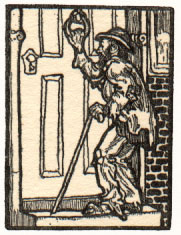 before him the best they
had, and, when he tried to express his gratitude, John
laid his hand on his shoulder.
before him the best they
had, and, when he tried to express his gratitude, John
laid his hand on his shoulder.
"My friend," he said, "Providence has been good to us, and blessed the labour of our hands. In times gone by, however, I was as wretched as you appeared to be when you crossed the road, and it is owing to a stranger's kindness that I am in my present position."
He went on to tell him of the bar of gold, and, after a long look at his wife, who nodded her head as if well pleased, he went and fetched it from the cellar, where it had lain hidden all these years.
"There!" he exclaimed. "I am going to give it to you. I shall not want it now, and my children are all well settled. It is fitting that you should have it, since your need is very great."
Now the stranger understood the science of metals, for he was a learned man who had fallen on evil times. As he took the gleaming bar in his hands, while murmuring his astonished thanks, he knew by its weight that it was not gold.
"You have made a mistake, my friends," he cried. "This bar is not what you think it, though I own that most men would be deceived."
Greatly surprised, the old woman took it from him, and polished it with her apron in order to show him how brightly it gleamed. As she did so, an inscription appeared, which neither she nor her husband had noticed before. Both listened with great interest as the stranger read it out for them.
"It is less a matter of actual want," it ran, "than the fear of what the morrow will bring, which causes the unhappiness of the poor. Then tread the path of life with courage, for it is clear that at last you will reach the end of your journey."
When the stranger paused there was a dead silence, for the old man and woman were thinking many things, and words do not come quickly when one is deeply moved. At last John offered the stranger a tremulous apology for the disappointment he must be suffering through their innocent mistake.
"On the contrary," he replied warmly, "the lesson that bar has taught me is worth far more than any money that you could give me. I shall make a new start in life, and, remembering that we fail through fear, will henceforth bear myself as a brave man should."
So saying, he bade them adieu, and passed out into the fragrant twilight.
